Challenges Facing The Implementation Of Universal Healthcare In South Africa
VerifiedAdded on 2023/01/17
|57
|15653
|59
AI Summary
This dissertation focuses on the challenges faced in implementing universal healthcare in South Africa. It discusses the unequal distribution of resources, management and leadership crisis, and increased disease burden. The research aims to analyze these challenges and identify effective ways to overcome them.
Contribute Materials
Your contribution can guide someone’s learning journey. Share your
documents today.
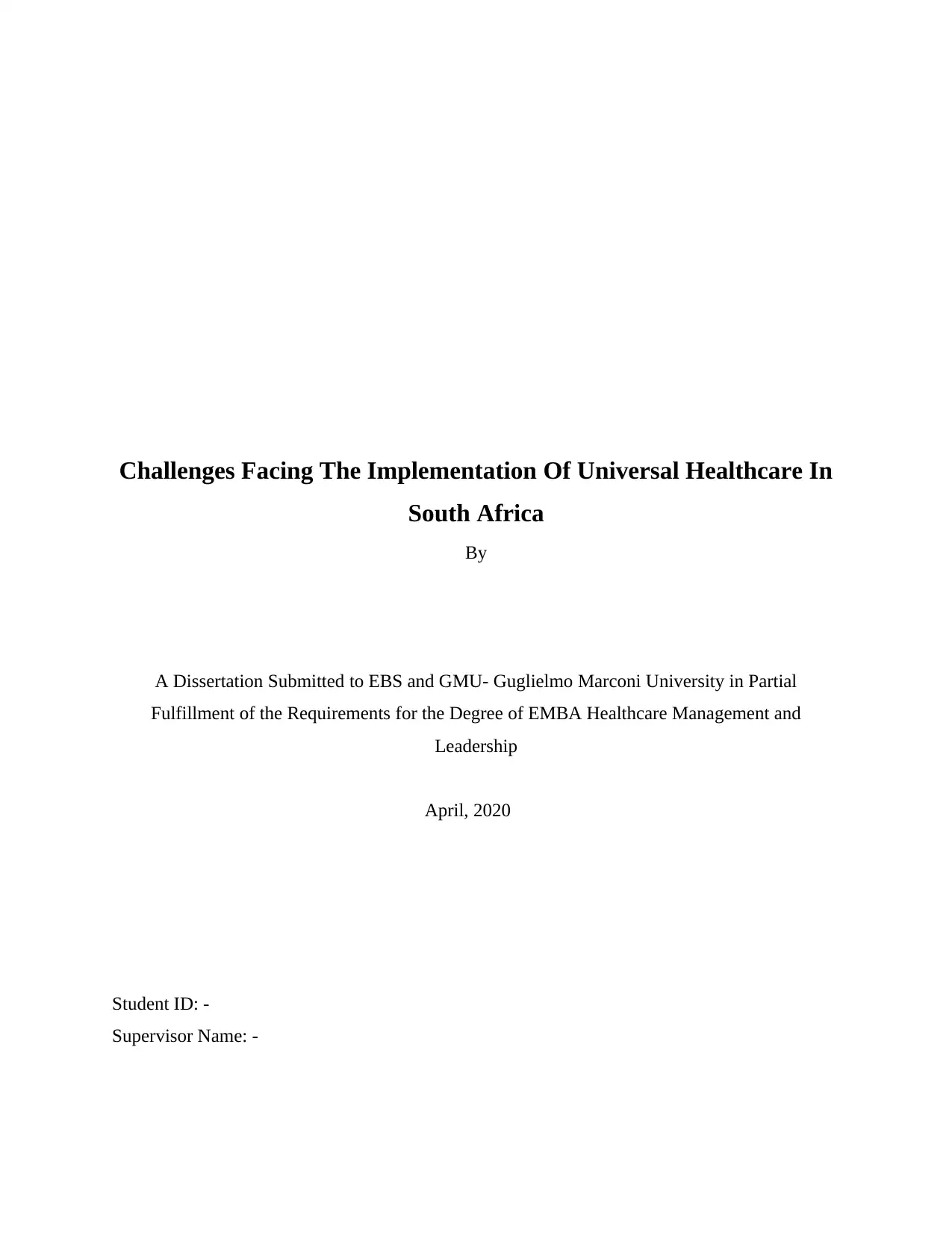
Challenges Facing The Implementation Of Universal Healthcare In
South Africa
By
A Dissertation Submitted to EBS and GMU- Guglielmo Marconi University in Partial
Fulfillment of the Requirements for the Degree of EMBA Healthcare Management and
Leadership
April, 2020
Student ID: -
Supervisor Name: -
South Africa
By
A Dissertation Submitted to EBS and GMU- Guglielmo Marconi University in Partial
Fulfillment of the Requirements for the Degree of EMBA Healthcare Management and
Leadership
April, 2020
Student ID: -
Supervisor Name: -
Secure Best Marks with AI Grader
Need help grading? Try our AI Grader for instant feedback on your assignments.
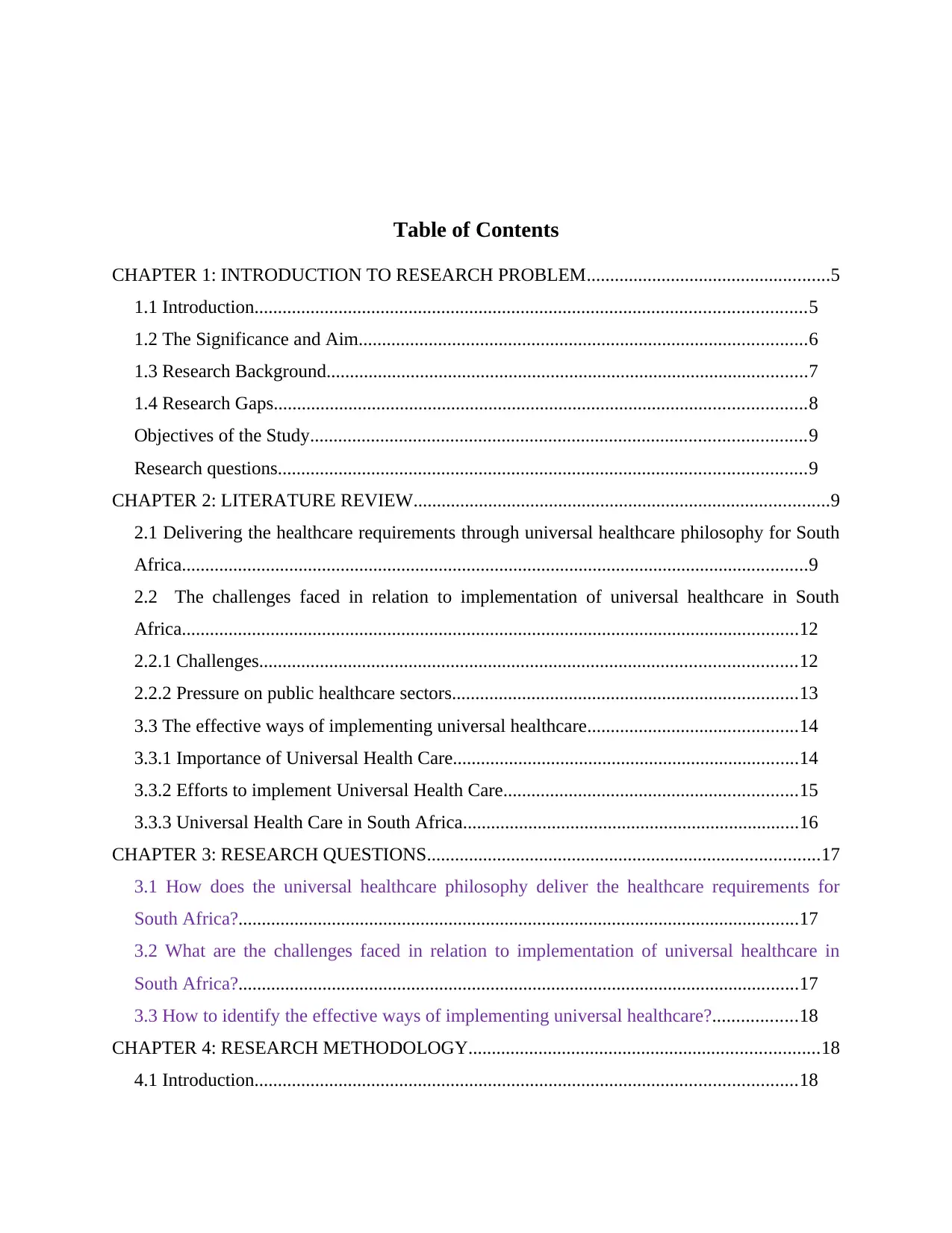
Table of Contents
CHAPTER 1: INTRODUCTION TO RESEARCH PROBLEM....................................................5
1.1 Introduction......................................................................................................................5
1.2 The Significance and Aim................................................................................................6
1.3 Research Background.......................................................................................................7
1.4 Research Gaps..................................................................................................................8
Objectives of the Study..........................................................................................................9
Research questions.................................................................................................................9
CHAPTER 2: LITERATURE REVIEW.........................................................................................9
2.1 Delivering the healthcare requirements through universal healthcare philosophy for South
Africa......................................................................................................................................9
2.2 The challenges faced in relation to implementation of universal healthcare in South
Africa....................................................................................................................................12
2.2.1 Challenges...................................................................................................................12
2.2.2 Pressure on public healthcare sectors..........................................................................13
3.3 The effective ways of implementing universal healthcare.............................................14
3.3.1 Importance of Universal Health Care..........................................................................14
3.3.2 Efforts to implement Universal Health Care...............................................................15
3.3.3 Universal Health Care in South Africa........................................................................16
CHAPTER 3: RESEARCH QUESTIONS....................................................................................17
3.1 How does the universal healthcare philosophy deliver the healthcare requirements for
South Africa?........................................................................................................................17
3.2 What are the challenges faced in relation to implementation of universal healthcare in
South Africa?........................................................................................................................17
3.3 How to identify the effective ways of implementing universal healthcare?..................18
CHAPTER 4: RESEARCH METHODOLOGY...........................................................................18
4.1 Introduction....................................................................................................................18
CHAPTER 1: INTRODUCTION TO RESEARCH PROBLEM....................................................5
1.1 Introduction......................................................................................................................5
1.2 The Significance and Aim................................................................................................6
1.3 Research Background.......................................................................................................7
1.4 Research Gaps..................................................................................................................8
Objectives of the Study..........................................................................................................9
Research questions.................................................................................................................9
CHAPTER 2: LITERATURE REVIEW.........................................................................................9
2.1 Delivering the healthcare requirements through universal healthcare philosophy for South
Africa......................................................................................................................................9
2.2 The challenges faced in relation to implementation of universal healthcare in South
Africa....................................................................................................................................12
2.2.1 Challenges...................................................................................................................12
2.2.2 Pressure on public healthcare sectors..........................................................................13
3.3 The effective ways of implementing universal healthcare.............................................14
3.3.1 Importance of Universal Health Care..........................................................................14
3.3.2 Efforts to implement Universal Health Care...............................................................15
3.3.3 Universal Health Care in South Africa........................................................................16
CHAPTER 3: RESEARCH QUESTIONS....................................................................................17
3.1 How does the universal healthcare philosophy deliver the healthcare requirements for
South Africa?........................................................................................................................17
3.2 What are the challenges faced in relation to implementation of universal healthcare in
South Africa?........................................................................................................................17
3.3 How to identify the effective ways of implementing universal healthcare?..................18
CHAPTER 4: RESEARCH METHODOLOGY...........................................................................18
4.1 Introduction....................................................................................................................18
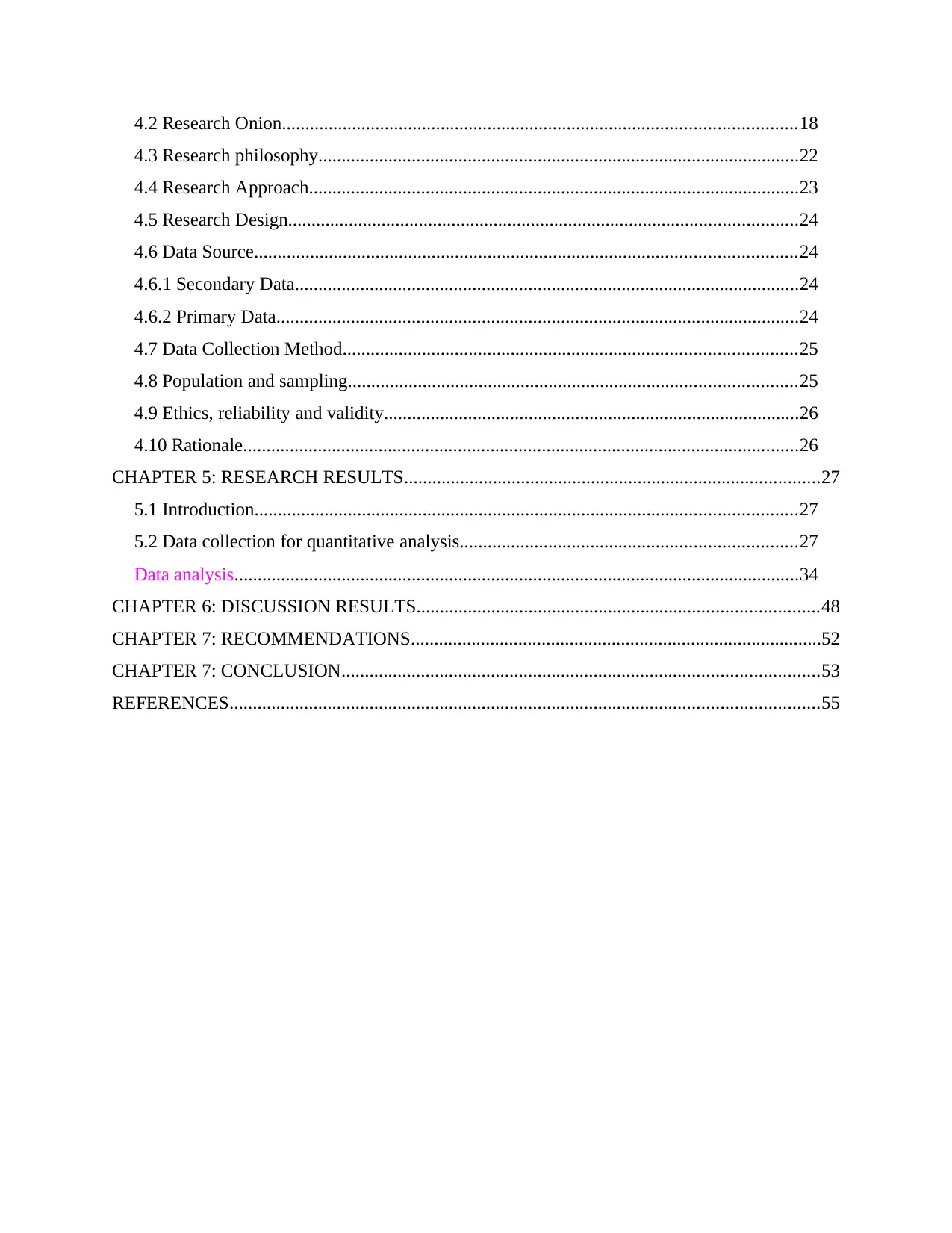
4.2 Research Onion..............................................................................................................18
4.3 Research philosophy.......................................................................................................22
4.4 Research Approach.........................................................................................................23
4.5 Research Design.............................................................................................................24
4.6 Data Source....................................................................................................................24
4.6.1 Secondary Data............................................................................................................24
4.6.2 Primary Data................................................................................................................24
4.7 Data Collection Method.................................................................................................25
4.8 Population and sampling................................................................................................25
4.9 Ethics, reliability and validity.........................................................................................26
4.10 Rationale.......................................................................................................................26
CHAPTER 5: RESEARCH RESULTS.........................................................................................27
5.1 Introduction....................................................................................................................27
5.2 Data collection for quantitative analysis........................................................................27
Data analysis.........................................................................................................................34
CHAPTER 6: DISCUSSION RESULTS......................................................................................48
CHAPTER 7: RECOMMENDATIONS........................................................................................52
CHAPTER 7: CONCLUSION......................................................................................................53
REFERENCES..............................................................................................................................55
4.3 Research philosophy.......................................................................................................22
4.4 Research Approach.........................................................................................................23
4.5 Research Design.............................................................................................................24
4.6 Data Source....................................................................................................................24
4.6.1 Secondary Data............................................................................................................24
4.6.2 Primary Data................................................................................................................24
4.7 Data Collection Method.................................................................................................25
4.8 Population and sampling................................................................................................25
4.9 Ethics, reliability and validity.........................................................................................26
4.10 Rationale.......................................................................................................................26
CHAPTER 5: RESEARCH RESULTS.........................................................................................27
5.1 Introduction....................................................................................................................27
5.2 Data collection for quantitative analysis........................................................................27
Data analysis.........................................................................................................................34
CHAPTER 6: DISCUSSION RESULTS......................................................................................48
CHAPTER 7: RECOMMENDATIONS........................................................................................52
CHAPTER 7: CONCLUSION......................................................................................................53
REFERENCES..............................................................................................................................55

Secure Best Marks with AI Grader
Need help grading? Try our AI Grader for instant feedback on your assignments.
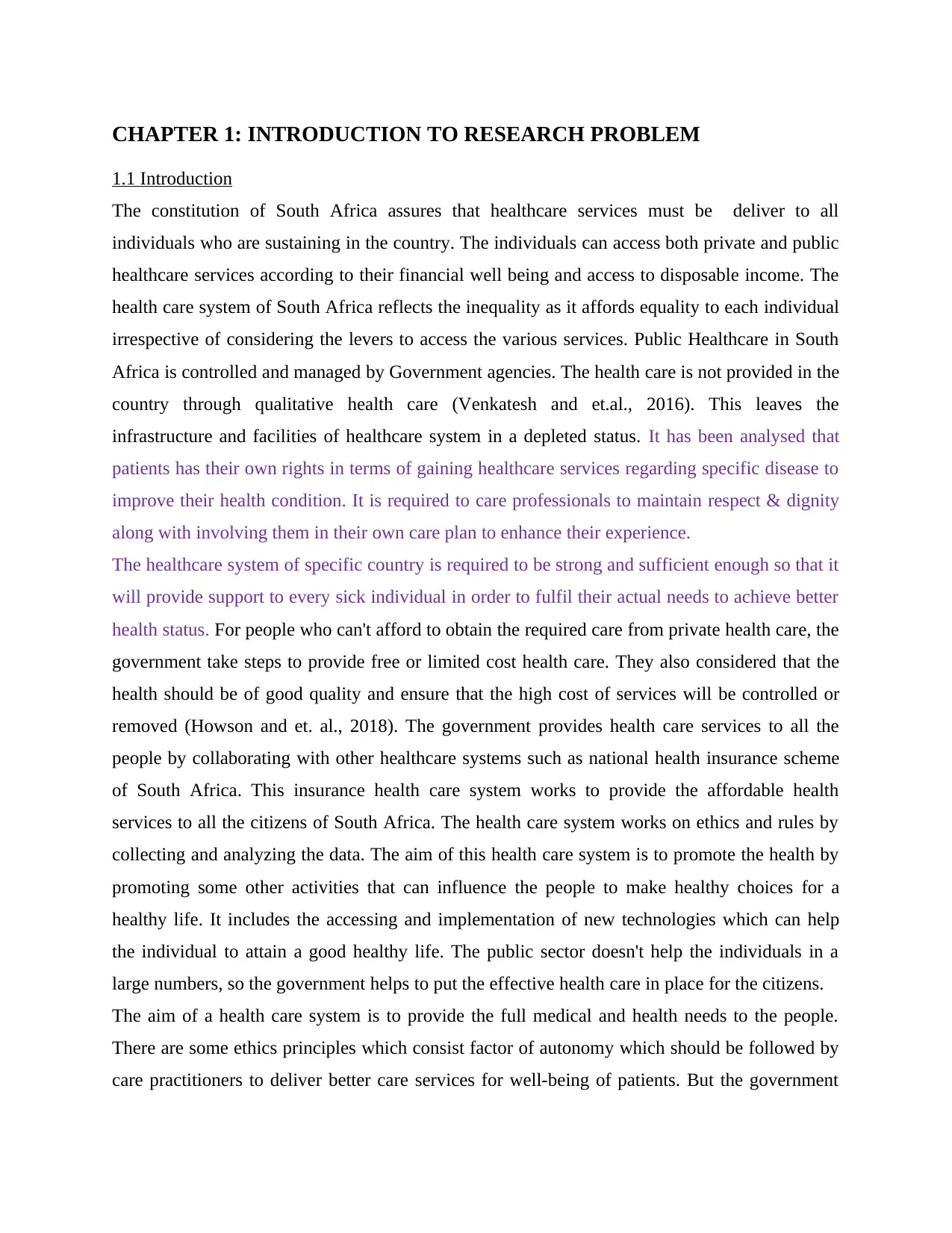
CHAPTER 1: INTRODUCTION TO RESEARCH PROBLEM
1.1 Introduction
The constitution of South Africa assures that healthcare services must be deliver to all
individuals who are sustaining in the country. The individuals can access both private and public
healthcare services according to their financial well being and access to disposable income. The
health care system of South Africa reflects the inequality as it affords equality to each individual
irrespective of considering the levers to access the various services. Public Healthcare in South
Africa is controlled and managed by Government agencies. The health care is not provided in the
country through qualitative health care (Venkatesh and et.al., 2016). This leaves the
infrastructure and facilities of healthcare system in a depleted status. It has been analysed that
patients has their own rights in terms of gaining healthcare services regarding specific disease to
improve their health condition. It is required to care professionals to maintain respect & dignity
along with involving them in their own care plan to enhance their experience.
The healthcare system of specific country is required to be strong and sufficient enough so that it
will provide support to every sick individual in order to fulfil their actual needs to achieve better
health status. For people who can't afford to obtain the required care from private health care, the
government take steps to provide free or limited cost health care. They also considered that the
health should be of good quality and ensure that the high cost of services will be controlled or
removed (Howson and et. al., 2018). The government provides health care services to all the
people by collaborating with other healthcare systems such as national health insurance scheme
of South Africa. This insurance health care system works to provide the affordable health
services to all the citizens of South Africa. The health care system works on ethics and rules by
collecting and analyzing the data. The aim of this health care system is to promote the health by
promoting some other activities that can influence the people to make healthy choices for a
healthy life. It includes the accessing and implementation of new technologies which can help
the individual to attain a good healthy life. The public sector doesn't help the individuals in a
large numbers, so the government helps to put the effective health care in place for the citizens.
The aim of a health care system is to provide the full medical and health needs to the people.
There are some ethics principles which consist factor of autonomy which should be followed by
care practitioners to deliver better care services for well-being of patients. But the government
1.1 Introduction
The constitution of South Africa assures that healthcare services must be deliver to all
individuals who are sustaining in the country. The individuals can access both private and public
healthcare services according to their financial well being and access to disposable income. The
health care system of South Africa reflects the inequality as it affords equality to each individual
irrespective of considering the levers to access the various services. Public Healthcare in South
Africa is controlled and managed by Government agencies. The health care is not provided in the
country through qualitative health care (Venkatesh and et.al., 2016). This leaves the
infrastructure and facilities of healthcare system in a depleted status. It has been analysed that
patients has their own rights in terms of gaining healthcare services regarding specific disease to
improve their health condition. It is required to care professionals to maintain respect & dignity
along with involving them in their own care plan to enhance their experience.
The healthcare system of specific country is required to be strong and sufficient enough so that it
will provide support to every sick individual in order to fulfil their actual needs to achieve better
health status. For people who can't afford to obtain the required care from private health care, the
government take steps to provide free or limited cost health care. They also considered that the
health should be of good quality and ensure that the high cost of services will be controlled or
removed (Howson and et. al., 2018). The government provides health care services to all the
people by collaborating with other healthcare systems such as national health insurance scheme
of South Africa. This insurance health care system works to provide the affordable health
services to all the citizens of South Africa. The health care system works on ethics and rules by
collecting and analyzing the data. The aim of this health care system is to promote the health by
promoting some other activities that can influence the people to make healthy choices for a
healthy life. It includes the accessing and implementation of new technologies which can help
the individual to attain a good healthy life. The public sector doesn't help the individuals in a
large numbers, so the government helps to put the effective health care in place for the citizens.
The aim of a health care system is to provide the full medical and health needs to the people.
There are some ethics principles which consist factor of autonomy which should be followed by
care practitioners to deliver better care services for well-being of patients. But the government
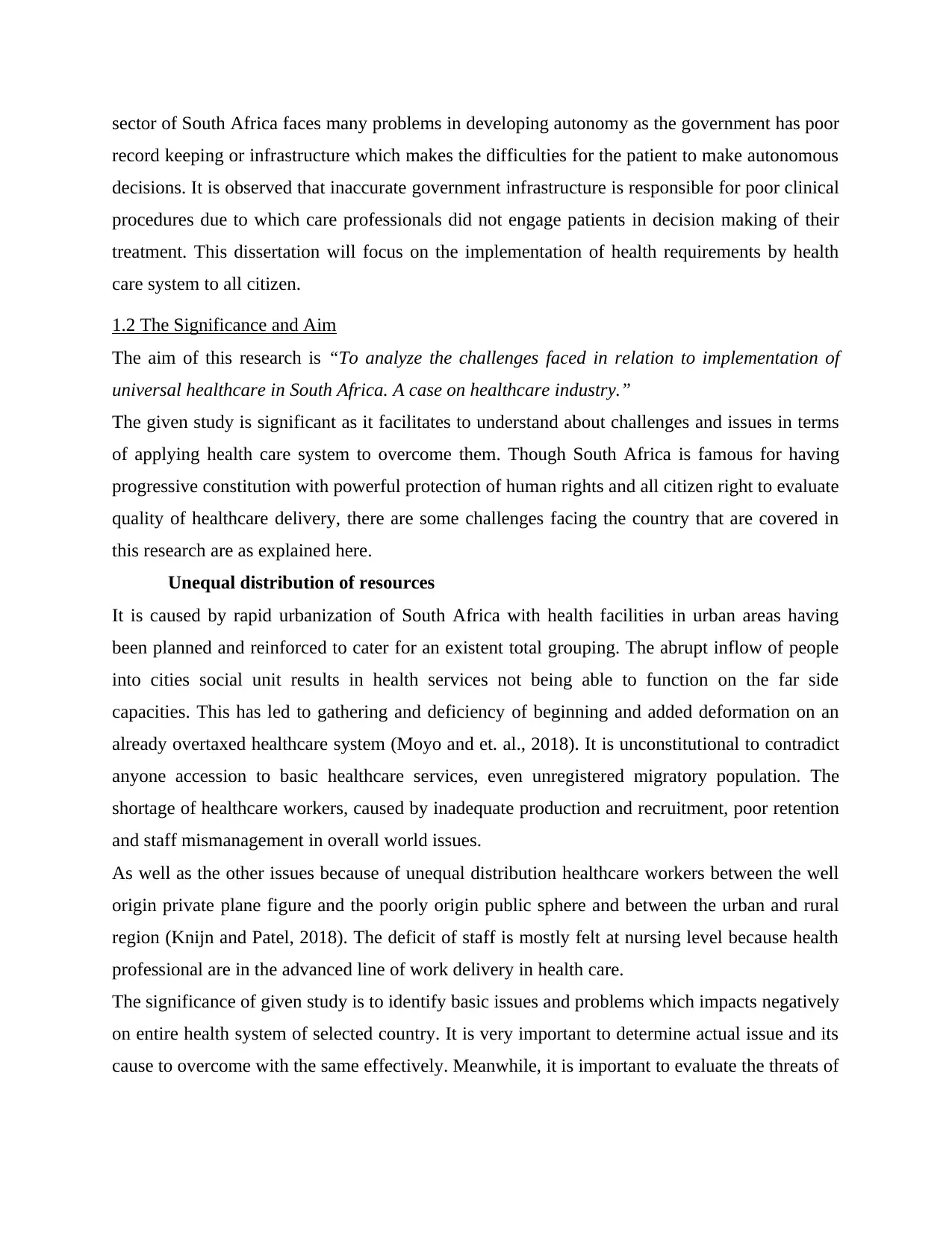
sector of South Africa faces many problems in developing autonomy as the government has poor
record keeping or infrastructure which makes the difficulties for the patient to make autonomous
decisions. It is observed that inaccurate government infrastructure is responsible for poor clinical
procedures due to which care professionals did not engage patients in decision making of their
treatment. This dissertation will focus on the implementation of health requirements by health
care system to all citizen.
1.2 The Significance and Aim
The aim of this research is “To analyze the challenges faced in relation to implementation of
universal healthcare in South Africa. A case on healthcare industry.”
The given study is significant as it facilitates to understand about challenges and issues in terms
of applying health care system to overcome them. Though South Africa is famous for having
progressive constitution with powerful protection of human rights and all citizen right to evaluate
quality of healthcare delivery, there are some challenges facing the country that are covered in
this research are as explained here.
Unequal distribution of resources
It is caused by rapid urbanization of South Africa with health facilities in urban areas having
been planned and reinforced to cater for an existent total grouping. The abrupt inflow of people
into cities social unit results in health services not being able to function on the far side
capacities. This has led to gathering and deficiency of beginning and added deformation on an
already overtaxed healthcare system (Moyo and et. al., 2018). It is unconstitutional to contradict
anyone accession to basic healthcare services, even unregistered migratory population. The
shortage of healthcare workers, caused by inadequate production and recruitment, poor retention
and staff mismanagement in overall world issues.
As well as the other issues because of unequal distribution healthcare workers between the well
origin private plane figure and the poorly origin public sphere and between the urban and rural
region (Knijn and Patel, 2018). The deficit of staff is mostly felt at nursing level because health
professional are in the advanced line of work delivery in health care.
The significance of given study is to identify basic issues and problems which impacts negatively
on entire health system of selected country. It is very important to determine actual issue and its
cause to overcome with the same effectively. Meanwhile, it is important to evaluate the threats of
record keeping or infrastructure which makes the difficulties for the patient to make autonomous
decisions. It is observed that inaccurate government infrastructure is responsible for poor clinical
procedures due to which care professionals did not engage patients in decision making of their
treatment. This dissertation will focus on the implementation of health requirements by health
care system to all citizen.
1.2 The Significance and Aim
The aim of this research is “To analyze the challenges faced in relation to implementation of
universal healthcare in South Africa. A case on healthcare industry.”
The given study is significant as it facilitates to understand about challenges and issues in terms
of applying health care system to overcome them. Though South Africa is famous for having
progressive constitution with powerful protection of human rights and all citizen right to evaluate
quality of healthcare delivery, there are some challenges facing the country that are covered in
this research are as explained here.
Unequal distribution of resources
It is caused by rapid urbanization of South Africa with health facilities in urban areas having
been planned and reinforced to cater for an existent total grouping. The abrupt inflow of people
into cities social unit results in health services not being able to function on the far side
capacities. This has led to gathering and deficiency of beginning and added deformation on an
already overtaxed healthcare system (Moyo and et. al., 2018). It is unconstitutional to contradict
anyone accession to basic healthcare services, even unregistered migratory population. The
shortage of healthcare workers, caused by inadequate production and recruitment, poor retention
and staff mismanagement in overall world issues.
As well as the other issues because of unequal distribution healthcare workers between the well
origin private plane figure and the poorly origin public sphere and between the urban and rural
region (Knijn and Patel, 2018). The deficit of staff is mostly felt at nursing level because health
professional are in the advanced line of work delivery in health care.
The significance of given study is to identify basic issues and problems which impacts negatively
on entire health system of selected country. It is very important to determine actual issue and its
cause to overcome with the same effectively. Meanwhile, it is important to evaluate the threats of
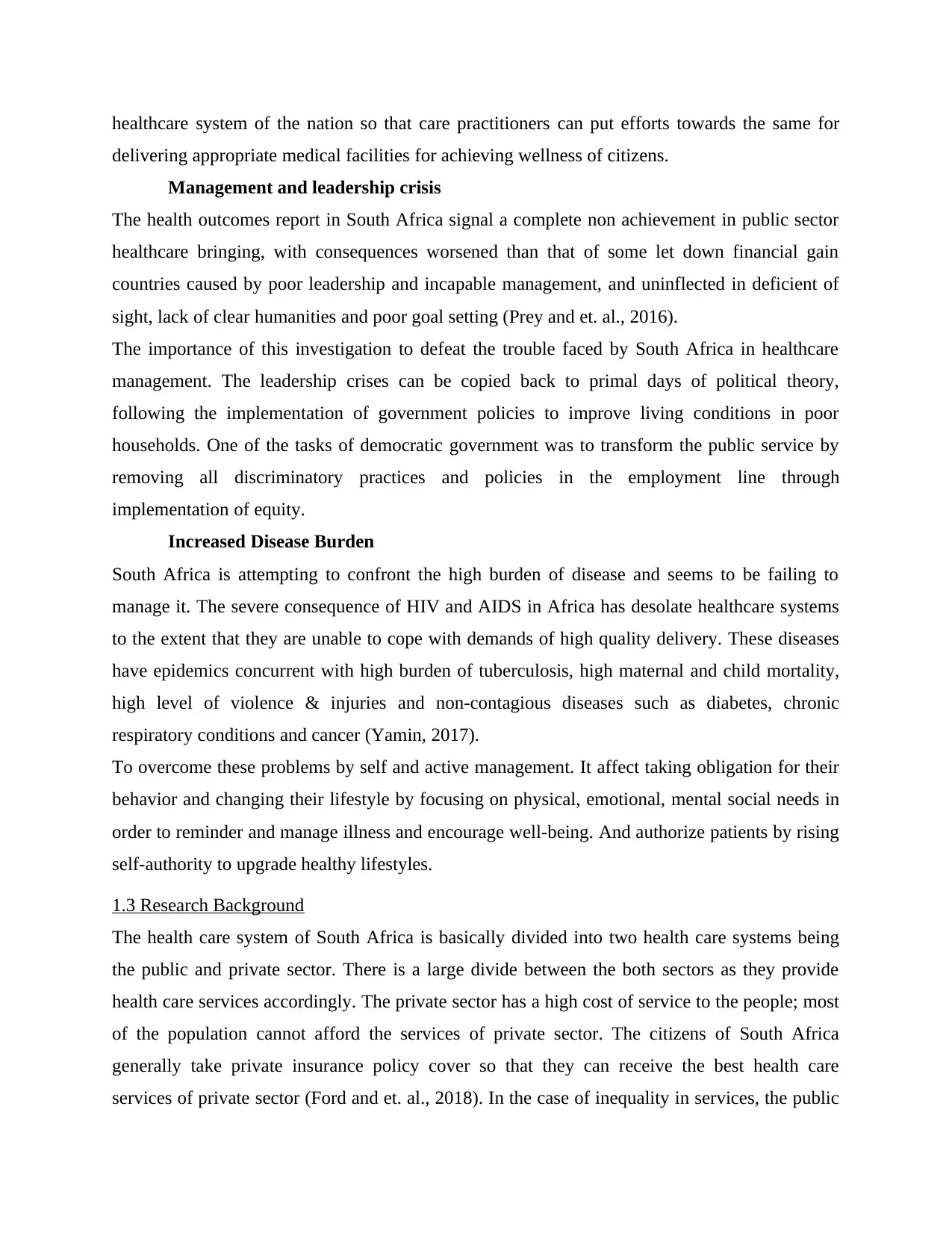
healthcare system of the nation so that care practitioners can put efforts towards the same for
delivering appropriate medical facilities for achieving wellness of citizens.
Management and leadership crisis
The health outcomes report in South Africa signal a complete non achievement in public sector
healthcare bringing, with consequences worsened than that of some let down financial gain
countries caused by poor leadership and incapable management, and uninflected in deficient of
sight, lack of clear humanities and poor goal setting (Prey and et. al., 2016).
The importance of this investigation to defeat the trouble faced by South Africa in healthcare
management. The leadership crises can be copied back to primal days of political theory,
following the implementation of government policies to improve living conditions in poor
households. One of the tasks of democratic government was to transform the public service by
removing all discriminatory practices and policies in the employment line through
implementation of equity.
Increased Disease Burden
South Africa is attempting to confront the high burden of disease and seems to be failing to
manage it. The severe consequence of HIV and AIDS in Africa has desolate healthcare systems
to the extent that they are unable to cope with demands of high quality delivery. These diseases
have epidemics concurrent with high burden of tuberculosis, high maternal and child mortality,
high level of violence & injuries and non-contagious diseases such as diabetes, chronic
respiratory conditions and cancer (Yamin, 2017).
To overcome these problems by self and active management. It affect taking obligation for their
behavior and changing their lifestyle by focusing on physical, emotional, mental social needs in
order to reminder and manage illness and encourage well-being. And authorize patients by rising
self-authority to upgrade healthy lifestyles.
1.3 Research Background
The health care system of South Africa is basically divided into two health care systems being
the public and private sector. There is a large divide between the both sectors as they provide
health care services accordingly. The private sector has a high cost of service to the people; most
of the population cannot afford the services of private sector. The citizens of South Africa
generally take private insurance policy cover so that they can receive the best health care
services of private sector (Ford and et. al., 2018). In the case of inequality in services, the public
delivering appropriate medical facilities for achieving wellness of citizens.
Management and leadership crisis
The health outcomes report in South Africa signal a complete non achievement in public sector
healthcare bringing, with consequences worsened than that of some let down financial gain
countries caused by poor leadership and incapable management, and uninflected in deficient of
sight, lack of clear humanities and poor goal setting (Prey and et. al., 2016).
The importance of this investigation to defeat the trouble faced by South Africa in healthcare
management. The leadership crises can be copied back to primal days of political theory,
following the implementation of government policies to improve living conditions in poor
households. One of the tasks of democratic government was to transform the public service by
removing all discriminatory practices and policies in the employment line through
implementation of equity.
Increased Disease Burden
South Africa is attempting to confront the high burden of disease and seems to be failing to
manage it. The severe consequence of HIV and AIDS in Africa has desolate healthcare systems
to the extent that they are unable to cope with demands of high quality delivery. These diseases
have epidemics concurrent with high burden of tuberculosis, high maternal and child mortality,
high level of violence & injuries and non-contagious diseases such as diabetes, chronic
respiratory conditions and cancer (Yamin, 2017).
To overcome these problems by self and active management. It affect taking obligation for their
behavior and changing their lifestyle by focusing on physical, emotional, mental social needs in
order to reminder and manage illness and encourage well-being. And authorize patients by rising
self-authority to upgrade healthy lifestyles.
1.3 Research Background
The health care system of South Africa is basically divided into two health care systems being
the public and private sector. There is a large divide between the both sectors as they provide
health care services accordingly. The private sector has a high cost of service to the people; most
of the population cannot afford the services of private sector. The citizens of South Africa
generally take private insurance policy cover so that they can receive the best health care
services of private sector (Ford and et. al., 2018). In the case of inequality in services, the public
Paraphrase This Document
Need a fresh take? Get an instant paraphrase of this document with our AI Paraphraser
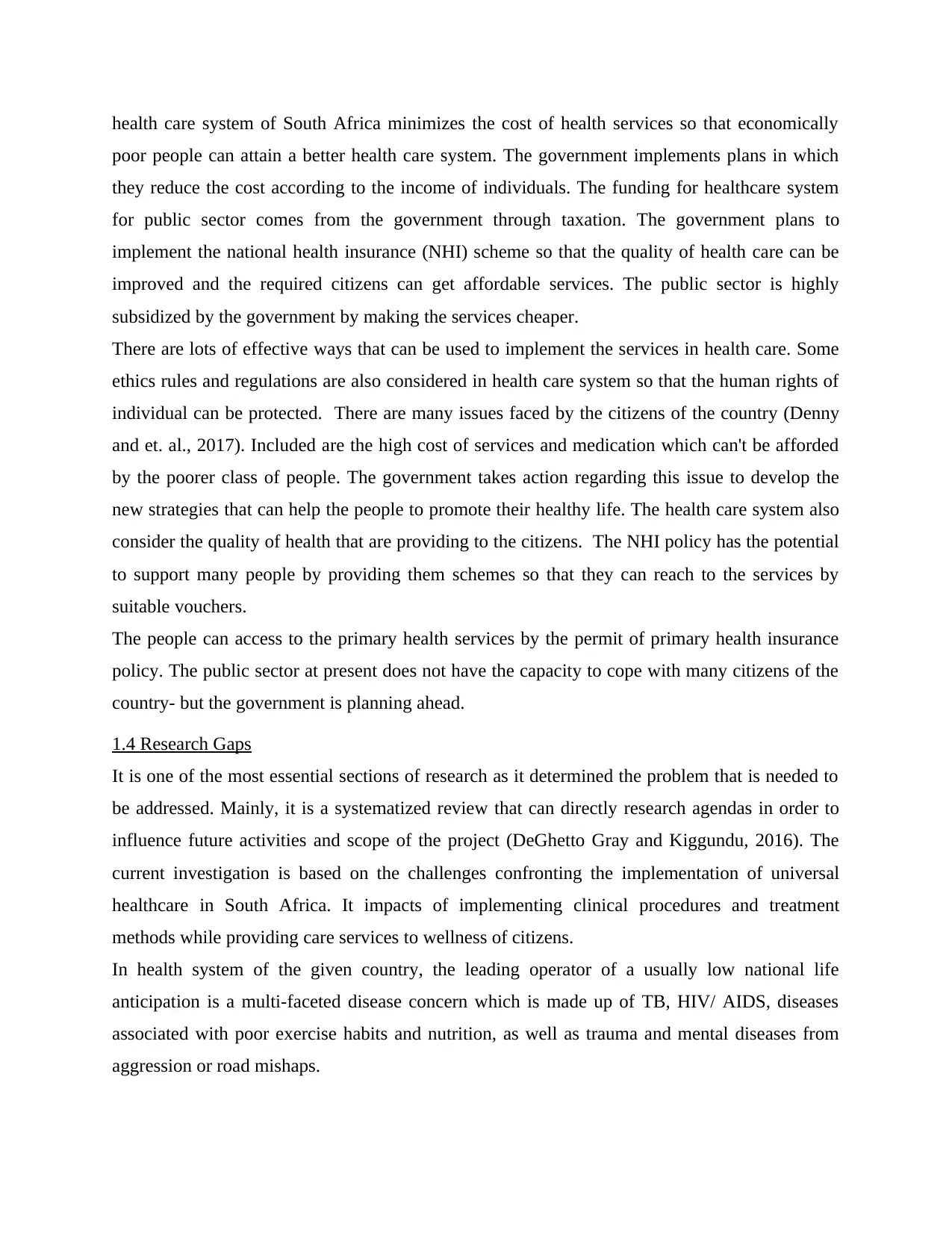
health care system of South Africa minimizes the cost of health services so that economically
poor people can attain a better health care system. The government implements plans in which
they reduce the cost according to the income of individuals. The funding for healthcare system
for public sector comes from the government through taxation. The government plans to
implement the national health insurance (NHI) scheme so that the quality of health care can be
improved and the required citizens can get affordable services. The public sector is highly
subsidized by the government by making the services cheaper.
There are lots of effective ways that can be used to implement the services in health care. Some
ethics rules and regulations are also considered in health care system so that the human rights of
individual can be protected. There are many issues faced by the citizens of the country (Denny
and et. al., 2017). Included are the high cost of services and medication which can't be afforded
by the poorer class of people. The government takes action regarding this issue to develop the
new strategies that can help the people to promote their healthy life. The health care system also
consider the quality of health that are providing to the citizens. The NHI policy has the potential
to support many people by providing them schemes so that they can reach to the services by
suitable vouchers.
The people can access to the primary health services by the permit of primary health insurance
policy. The public sector at present does not have the capacity to cope with many citizens of the
country- but the government is planning ahead.
1.4 Research Gaps
It is one of the most essential sections of research as it determined the problem that is needed to
be addressed. Mainly, it is a systematized review that can directly research agendas in order to
influence future activities and scope of the project (DeGhetto Gray and Kiggundu, 2016). The
current investigation is based on the challenges confronting the implementation of universal
healthcare in South Africa. It impacts of implementing clinical procedures and treatment
methods while providing care services to wellness of citizens.
In health system of the given country, the leading operator of a usually low national life
anticipation is a multi-faceted disease concern which is made up of TB, HIV/ AIDS, diseases
associated with poor exercise habits and nutrition, as well as trauma and mental diseases from
aggression or road mishaps.
poor people can attain a better health care system. The government implements plans in which
they reduce the cost according to the income of individuals. The funding for healthcare system
for public sector comes from the government through taxation. The government plans to
implement the national health insurance (NHI) scheme so that the quality of health care can be
improved and the required citizens can get affordable services. The public sector is highly
subsidized by the government by making the services cheaper.
There are lots of effective ways that can be used to implement the services in health care. Some
ethics rules and regulations are also considered in health care system so that the human rights of
individual can be protected. There are many issues faced by the citizens of the country (Denny
and et. al., 2017). Included are the high cost of services and medication which can't be afforded
by the poorer class of people. The government takes action regarding this issue to develop the
new strategies that can help the people to promote their healthy life. The health care system also
consider the quality of health that are providing to the citizens. The NHI policy has the potential
to support many people by providing them schemes so that they can reach to the services by
suitable vouchers.
The people can access to the primary health services by the permit of primary health insurance
policy. The public sector at present does not have the capacity to cope with many citizens of the
country- but the government is planning ahead.
1.4 Research Gaps
It is one of the most essential sections of research as it determined the problem that is needed to
be addressed. Mainly, it is a systematized review that can directly research agendas in order to
influence future activities and scope of the project (DeGhetto Gray and Kiggundu, 2016). The
current investigation is based on the challenges confronting the implementation of universal
healthcare in South Africa. It impacts of implementing clinical procedures and treatment
methods while providing care services to wellness of citizens.
In health system of the given country, the leading operator of a usually low national life
anticipation is a multi-faceted disease concern which is made up of TB, HIV/ AIDS, diseases
associated with poor exercise habits and nutrition, as well as trauma and mental diseases from
aggression or road mishaps.
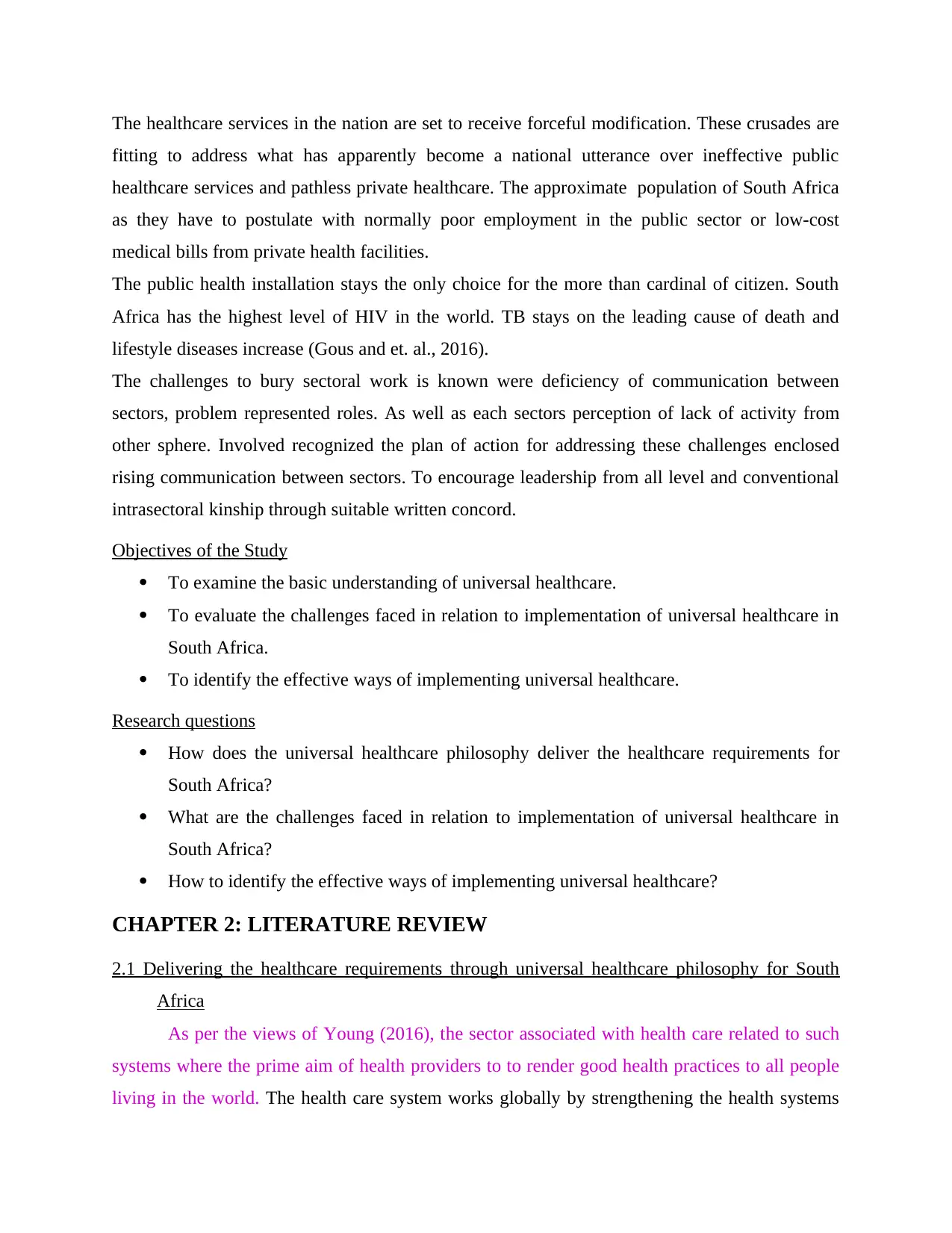
The healthcare services in the nation are set to receive forceful modification. These crusades are
fitting to address what has apparently become a national utterance over ineffective public
healthcare services and pathless private healthcare. The approximate population of South Africa
as they have to postulate with normally poor employment in the public sector or low-cost
medical bills from private health facilities.
The public health installation stays the only choice for the more than cardinal of citizen. South
Africa has the highest level of HIV in the world. TB stays on the leading cause of death and
lifestyle diseases increase (Gous and et. al., 2016).
The challenges to bury sectoral work is known were deficiency of communication between
sectors, problem represented roles. As well as each sectors perception of lack of activity from
other sphere. Involved recognized the plan of action for addressing these challenges enclosed
rising communication between sectors. To encourage leadership from all level and conventional
intrasectoral kinship through suitable written concord.
Objectives of the Study
To examine the basic understanding of universal healthcare.
To evaluate the challenges faced in relation to implementation of universal healthcare in
South Africa.
To identify the effective ways of implementing universal healthcare.
Research questions
How does the universal healthcare philosophy deliver the healthcare requirements for
South Africa?
What are the challenges faced in relation to implementation of universal healthcare in
South Africa?
How to identify the effective ways of implementing universal healthcare?
CHAPTER 2: LITERATURE REVIEW
2.1 Delivering the healthcare requirements through universal healthcare philosophy for South
Africa
As per the views of Young (2016), the sector associated with health care related to such
systems where the prime aim of health providers to to render good health practices to all people
living in the world. The health care system works globally by strengthening the health systems
fitting to address what has apparently become a national utterance over ineffective public
healthcare services and pathless private healthcare. The approximate population of South Africa
as they have to postulate with normally poor employment in the public sector or low-cost
medical bills from private health facilities.
The public health installation stays the only choice for the more than cardinal of citizen. South
Africa has the highest level of HIV in the world. TB stays on the leading cause of death and
lifestyle diseases increase (Gous and et. al., 2016).
The challenges to bury sectoral work is known were deficiency of communication between
sectors, problem represented roles. As well as each sectors perception of lack of activity from
other sphere. Involved recognized the plan of action for addressing these challenges enclosed
rising communication between sectors. To encourage leadership from all level and conventional
intrasectoral kinship through suitable written concord.
Objectives of the Study
To examine the basic understanding of universal healthcare.
To evaluate the challenges faced in relation to implementation of universal healthcare in
South Africa.
To identify the effective ways of implementing universal healthcare.
Research questions
How does the universal healthcare philosophy deliver the healthcare requirements for
South Africa?
What are the challenges faced in relation to implementation of universal healthcare in
South Africa?
How to identify the effective ways of implementing universal healthcare?
CHAPTER 2: LITERATURE REVIEW
2.1 Delivering the healthcare requirements through universal healthcare philosophy for South
Africa
As per the views of Young (2016), the sector associated with health care related to such
systems where the prime aim of health providers to to render good health practices to all people
living in the world. The health care system works globally by strengthening the health systems
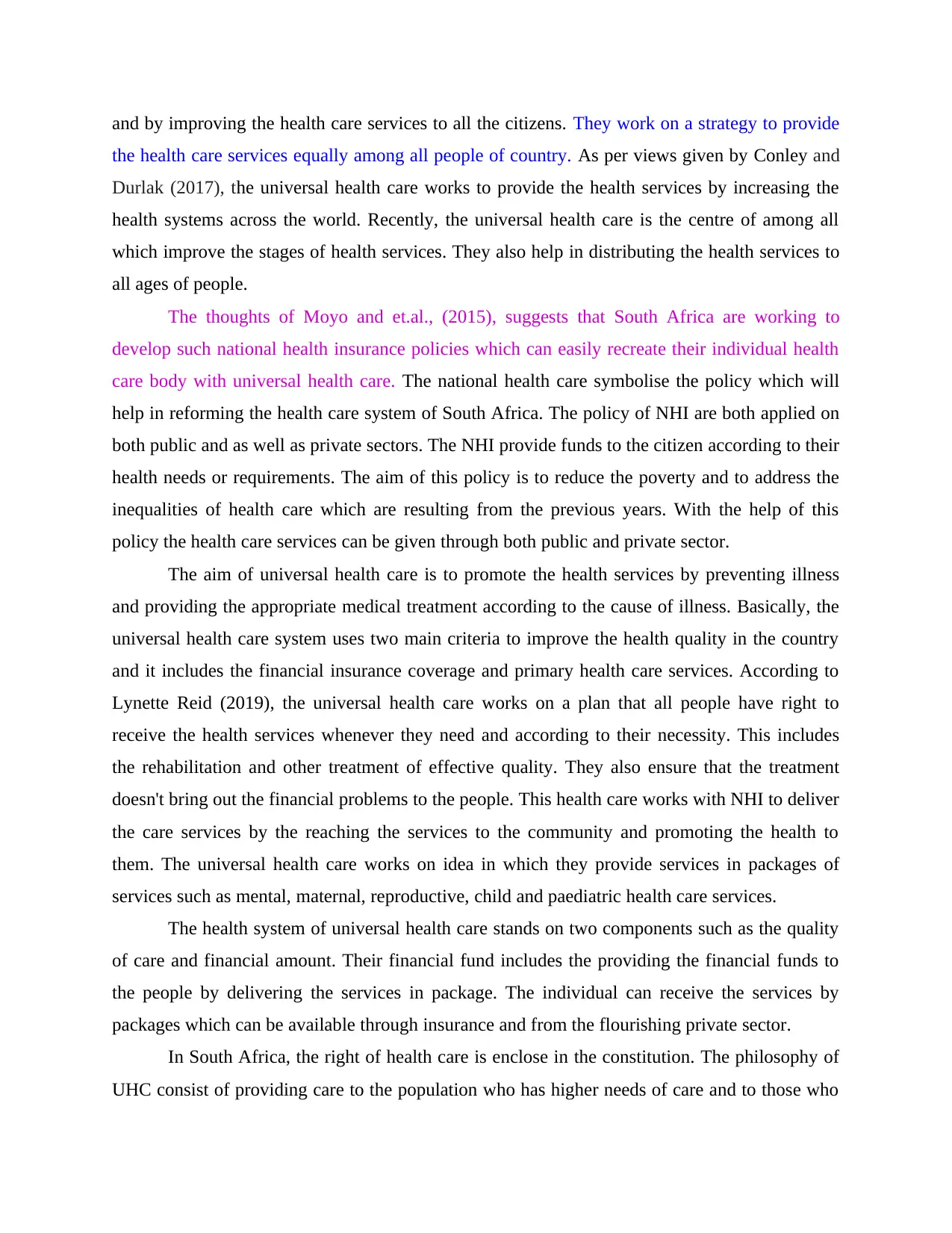
and by improving the health care services to all the citizens. They work on a strategy to provide
the health care services equally among all people of country. As per views given by Conley and
Durlak (2017), the universal health care works to provide the health services by increasing the
health systems across the world. Recently, the universal health care is the centre of among all
which improve the stages of health services. They also help in distributing the health services to
all ages of people.
The thoughts of Moyo and et.al., (2015), suggests that South Africa are working to
develop such national health insurance policies which can easily recreate their individual health
care body with universal health care. The national health care symbolise the policy which will
help in reforming the health care system of South Africa. The policy of NHI are both applied on
both public and as well as private sectors. The NHI provide funds to the citizen according to their
health needs or requirements. The aim of this policy is to reduce the poverty and to address the
inequalities of health care which are resulting from the previous years. With the help of this
policy the health care services can be given through both public and private sector.
The aim of universal health care is to promote the health services by preventing illness
and providing the appropriate medical treatment according to the cause of illness. Basically, the
universal health care system uses two main criteria to improve the health quality in the country
and it includes the financial insurance coverage and primary health care services. According to
Lynette Reid (2019), the universal health care works on a plan that all people have right to
receive the health services whenever they need and according to their necessity. This includes
the rehabilitation and other treatment of effective quality. They also ensure that the treatment
doesn't bring out the financial problems to the people. This health care works with NHI to deliver
the care services by the reaching the services to the community and promoting the health to
them. The universal health care works on idea in which they provide services in packages of
services such as mental, maternal, reproductive, child and paediatric health care services.
The health system of universal health care stands on two components such as the quality
of care and financial amount. Their financial fund includes the providing the financial funds to
the people by delivering the services in package. The individual can receive the services by
packages which can be available through insurance and from the flourishing private sector.
In South Africa, the right of health care is enclose in the constitution. The philosophy of
UHC consist of providing care to the population who has higher needs of care and to those who
the health care services equally among all people of country. As per views given by Conley and
Durlak (2017), the universal health care works to provide the health services by increasing the
health systems across the world. Recently, the universal health care is the centre of among all
which improve the stages of health services. They also help in distributing the health services to
all ages of people.
The thoughts of Moyo and et.al., (2015), suggests that South Africa are working to
develop such national health insurance policies which can easily recreate their individual health
care body with universal health care. The national health care symbolise the policy which will
help in reforming the health care system of South Africa. The policy of NHI are both applied on
both public and as well as private sectors. The NHI provide funds to the citizen according to their
health needs or requirements. The aim of this policy is to reduce the poverty and to address the
inequalities of health care which are resulting from the previous years. With the help of this
policy the health care services can be given through both public and private sector.
The aim of universal health care is to promote the health services by preventing illness
and providing the appropriate medical treatment according to the cause of illness. Basically, the
universal health care system uses two main criteria to improve the health quality in the country
and it includes the financial insurance coverage and primary health care services. According to
Lynette Reid (2019), the universal health care works on a plan that all people have right to
receive the health services whenever they need and according to their necessity. This includes
the rehabilitation and other treatment of effective quality. They also ensure that the treatment
doesn't bring out the financial problems to the people. This health care works with NHI to deliver
the care services by the reaching the services to the community and promoting the health to
them. The universal health care works on idea in which they provide services in packages of
services such as mental, maternal, reproductive, child and paediatric health care services.
The health system of universal health care stands on two components such as the quality
of care and financial amount. Their financial fund includes the providing the financial funds to
the people by delivering the services in package. The individual can receive the services by
packages which can be available through insurance and from the flourishing private sector.
In South Africa, the right of health care is enclose in the constitution. The philosophy of
UHC consist of providing care to the population who has higher needs of care and to those who
Secure Best Marks with AI Grader
Need help grading? Try our AI Grader for instant feedback on your assignments.
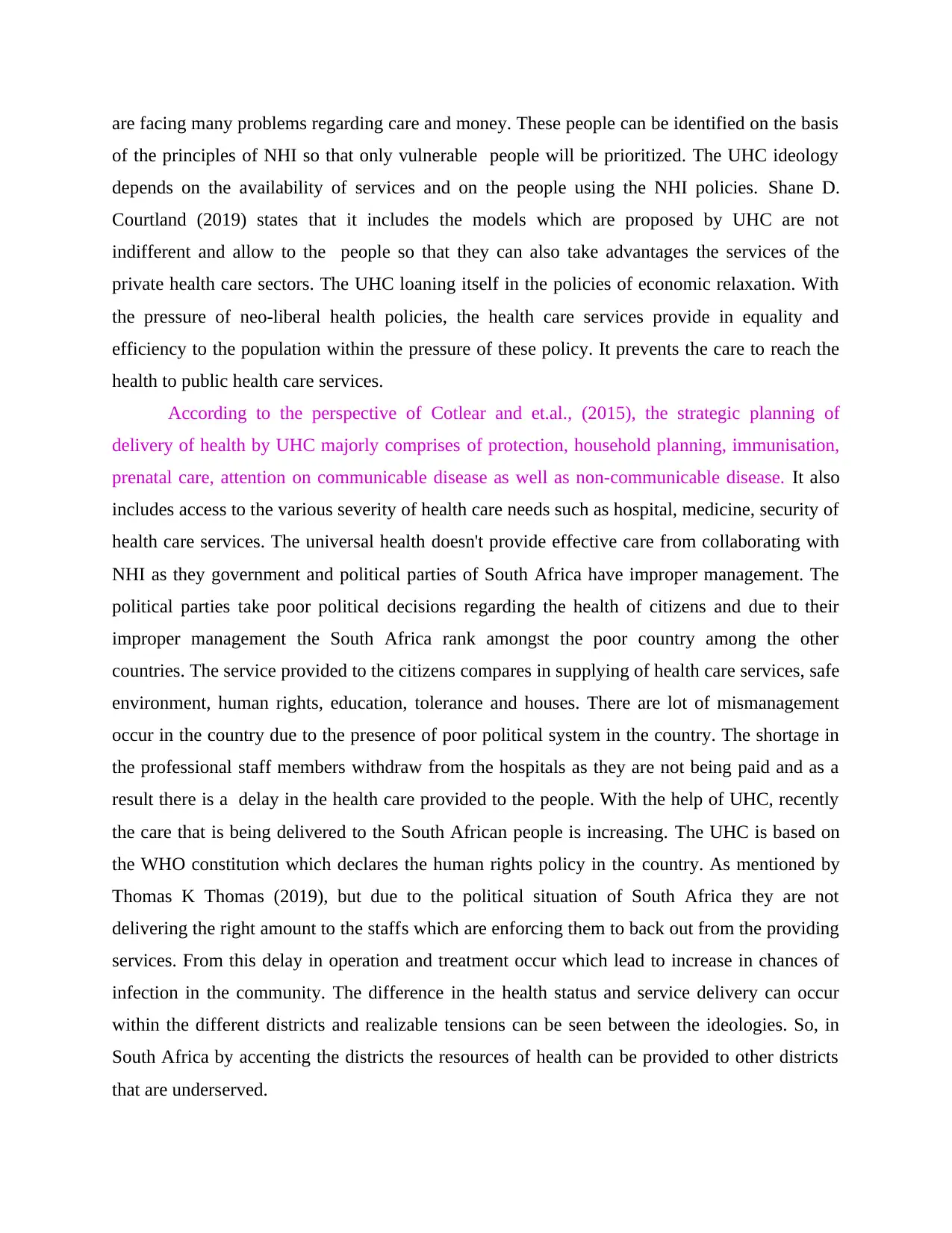
are facing many problems regarding care and money. These people can be identified on the basis
of the principles of NHI so that only vulnerable people will be prioritized. The UHC ideology
depends on the availability of services and on the people using the NHI policies. Shane D.
Courtland (2019) states that it includes the models which are proposed by UHC are not
indifferent and allow to the people so that they can also take advantages the services of the
private health care sectors. The UHC loaning itself in the policies of economic relaxation. With
the pressure of neo-liberal health policies, the health care services provide in equality and
efficiency to the population within the pressure of these policy. It prevents the care to reach the
health to public health care services.
According to the perspective of Cotlear and et.al., (2015), the strategic planning of
delivery of health by UHC majorly comprises of protection, household planning, immunisation,
prenatal care, attention on communicable disease as well as non-communicable disease. It also
includes access to the various severity of health care needs such as hospital, medicine, security of
health care services. The universal health doesn't provide effective care from collaborating with
NHI as they government and political parties of South Africa have improper management. The
political parties take poor political decisions regarding the health of citizens and due to their
improper management the South Africa rank amongst the poor country among the other
countries. The service provided to the citizens compares in supplying of health care services, safe
environment, human rights, education, tolerance and houses. There are lot of mismanagement
occur in the country due to the presence of poor political system in the country. The shortage in
the professional staff members withdraw from the hospitals as they are not being paid and as a
result there is a delay in the health care provided to the people. With the help of UHC, recently
the care that is being delivered to the South African people is increasing. The UHC is based on
the WHO constitution which declares the human rights policy in the country. As mentioned by
Thomas K Thomas (2019), but due to the political situation of South Africa they are not
delivering the right amount to the staffs which are enforcing them to back out from the providing
services. From this delay in operation and treatment occur which lead to increase in chances of
infection in the community. The difference in the health status and service delivery can occur
within the different districts and realizable tensions can be seen between the ideologies. So, in
South Africa by accenting the districts the resources of health can be provided to other districts
that are underserved.
of the principles of NHI so that only vulnerable people will be prioritized. The UHC ideology
depends on the availability of services and on the people using the NHI policies. Shane D.
Courtland (2019) states that it includes the models which are proposed by UHC are not
indifferent and allow to the people so that they can also take advantages the services of the
private health care sectors. The UHC loaning itself in the policies of economic relaxation. With
the pressure of neo-liberal health policies, the health care services provide in equality and
efficiency to the population within the pressure of these policy. It prevents the care to reach the
health to public health care services.
According to the perspective of Cotlear and et.al., (2015), the strategic planning of
delivery of health by UHC majorly comprises of protection, household planning, immunisation,
prenatal care, attention on communicable disease as well as non-communicable disease. It also
includes access to the various severity of health care needs such as hospital, medicine, security of
health care services. The universal health doesn't provide effective care from collaborating with
NHI as they government and political parties of South Africa have improper management. The
political parties take poor political decisions regarding the health of citizens and due to their
improper management the South Africa rank amongst the poor country among the other
countries. The service provided to the citizens compares in supplying of health care services, safe
environment, human rights, education, tolerance and houses. There are lot of mismanagement
occur in the country due to the presence of poor political system in the country. The shortage in
the professional staff members withdraw from the hospitals as they are not being paid and as a
result there is a delay in the health care provided to the people. With the help of UHC, recently
the care that is being delivered to the South African people is increasing. The UHC is based on
the WHO constitution which declares the human rights policy in the country. As mentioned by
Thomas K Thomas (2019), but due to the political situation of South Africa they are not
delivering the right amount to the staffs which are enforcing them to back out from the providing
services. From this delay in operation and treatment occur which lead to increase in chances of
infection in the community. The difference in the health status and service delivery can occur
within the different districts and realizable tensions can be seen between the ideologies. So, in
South Africa by accenting the districts the resources of health can be provided to other districts
that are underserved.
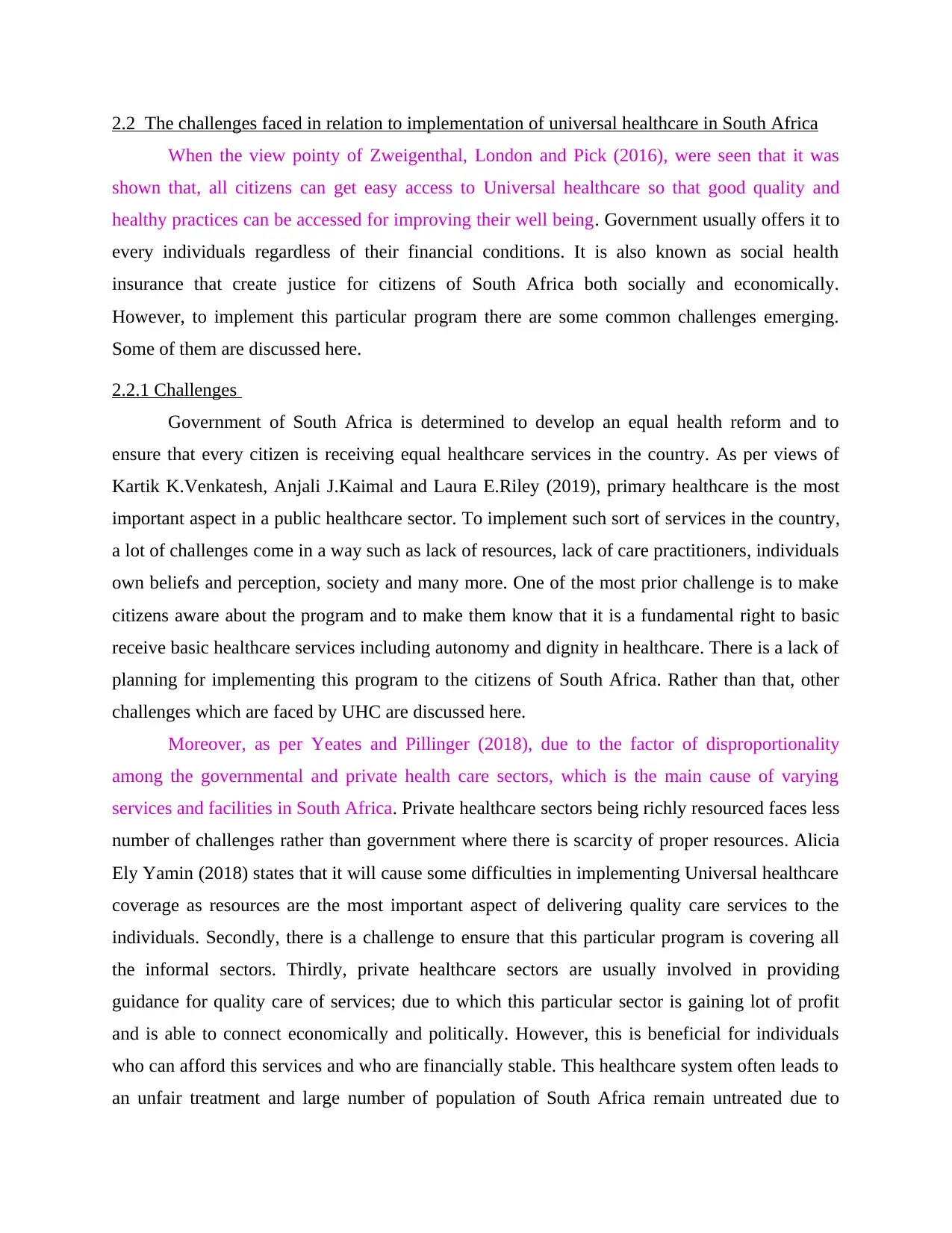
2.2 The challenges faced in relation to implementation of universal healthcare in South Africa
When the view pointy of Zweigenthal, London and Pick (2016), were seen that it was
shown that, all citizens can get easy access to Universal healthcare so that good quality and
healthy practices can be accessed for improving their well being. Government usually offers it to
every individuals regardless of their financial conditions. It is also known as social health
insurance that create justice for citizens of South Africa both socially and economically.
However, to implement this particular program there are some common challenges emerging.
Some of them are discussed here.
2.2.1 Challenges
Government of South Africa is determined to develop an equal health reform and to
ensure that every citizen is receiving equal healthcare services in the country. As per views of
Kartik K.Venkatesh, Anjali J.Kaimal and Laura E.Riley (2019), primary healthcare is the most
important aspect in a public healthcare sector. To implement such sort of services in the country,
a lot of challenges come in a way such as lack of resources, lack of care practitioners, individuals
own beliefs and perception, society and many more. One of the most prior challenge is to make
citizens aware about the program and to make them know that it is a fundamental right to basic
receive basic healthcare services including autonomy and dignity in healthcare. There is a lack of
planning for implementing this program to the citizens of South Africa. Rather than that, other
challenges which are faced by UHC are discussed here.
Moreover, as per Yeates and Pillinger (2018), due to the factor of disproportionality
among the governmental and private health care sectors, which is the main cause of varying
services and facilities in South Africa. Private healthcare sectors being richly resourced faces less
number of challenges rather than government where there is scarcity of proper resources. Alicia
Ely Yamin (2018) states that it will cause some difficulties in implementing Universal healthcare
coverage as resources are the most important aspect of delivering quality care services to the
individuals. Secondly, there is a challenge to ensure that this particular program is covering all
the informal sectors. Thirdly, private healthcare sectors are usually involved in providing
guidance for quality care of services; due to which this particular sector is gaining lot of profit
and is able to connect economically and politically. However, this is beneficial for individuals
who can afford this services and who are financially stable. This healthcare system often leads to
an unfair treatment and large number of population of South Africa remain untreated due to
When the view pointy of Zweigenthal, London and Pick (2016), were seen that it was
shown that, all citizens can get easy access to Universal healthcare so that good quality and
healthy practices can be accessed for improving their well being. Government usually offers it to
every individuals regardless of their financial conditions. It is also known as social health
insurance that create justice for citizens of South Africa both socially and economically.
However, to implement this particular program there are some common challenges emerging.
Some of them are discussed here.
2.2.1 Challenges
Government of South Africa is determined to develop an equal health reform and to
ensure that every citizen is receiving equal healthcare services in the country. As per views of
Kartik K.Venkatesh, Anjali J.Kaimal and Laura E.Riley (2019), primary healthcare is the most
important aspect in a public healthcare sector. To implement such sort of services in the country,
a lot of challenges come in a way such as lack of resources, lack of care practitioners, individuals
own beliefs and perception, society and many more. One of the most prior challenge is to make
citizens aware about the program and to make them know that it is a fundamental right to basic
receive basic healthcare services including autonomy and dignity in healthcare. There is a lack of
planning for implementing this program to the citizens of South Africa. Rather than that, other
challenges which are faced by UHC are discussed here.
Moreover, as per Yeates and Pillinger (2018), due to the factor of disproportionality
among the governmental and private health care sectors, which is the main cause of varying
services and facilities in South Africa. Private healthcare sectors being richly resourced faces less
number of challenges rather than government where there is scarcity of proper resources. Alicia
Ely Yamin (2018) states that it will cause some difficulties in implementing Universal healthcare
coverage as resources are the most important aspect of delivering quality care services to the
individuals. Secondly, there is a challenge to ensure that this particular program is covering all
the informal sectors. Thirdly, private healthcare sectors are usually involved in providing
guidance for quality care of services; due to which this particular sector is gaining lot of profit
and is able to connect economically and politically. However, this is beneficial for individuals
who can afford this services and who are financially stable. This healthcare system often leads to
an unfair treatment and large number of population of South Africa remain untreated due to
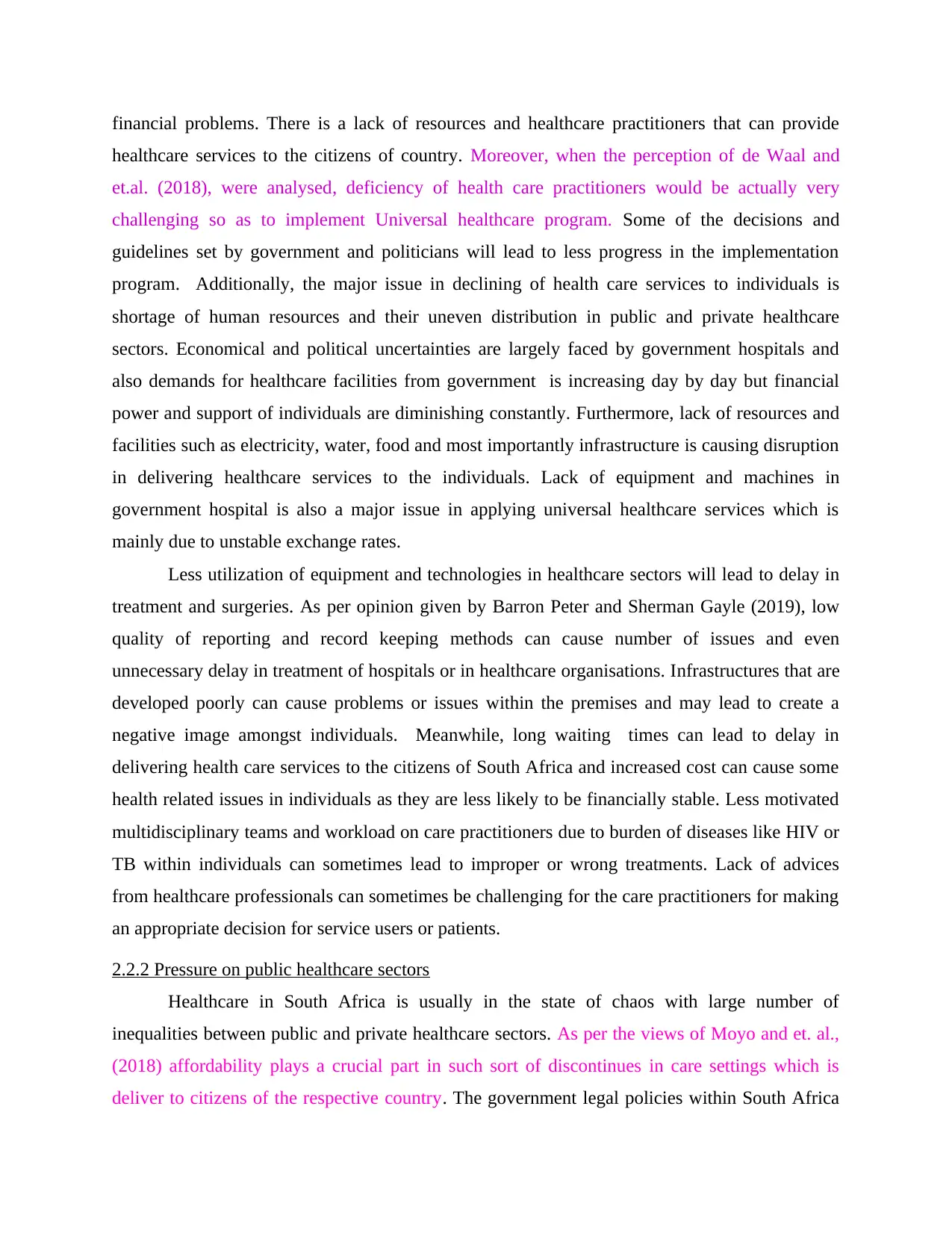
financial problems. There is a lack of resources and healthcare practitioners that can provide
healthcare services to the citizens of country. Moreover, when the perception of de Waal and
et.al. (2018), were analysed, deficiency of health care practitioners would be actually very
challenging so as to implement Universal healthcare program. Some of the decisions and
guidelines set by government and politicians will lead to less progress in the implementation
program. Additionally, the major issue in declining of health care services to individuals is
shortage of human resources and their uneven distribution in public and private healthcare
sectors. Economical and political uncertainties are largely faced by government hospitals and
also demands for healthcare facilities from government is increasing day by day but financial
power and support of individuals are diminishing constantly. Furthermore, lack of resources and
facilities such as electricity, water, food and most importantly infrastructure is causing disruption
in delivering healthcare services to the individuals. Lack of equipment and machines in
government hospital is also a major issue in applying universal healthcare services which is
mainly due to unstable exchange rates.
Less utilization of equipment and technologies in healthcare sectors will lead to delay in
treatment and surgeries. As per opinion given by Barron Peter and Sherman Gayle (2019), low
quality of reporting and record keeping methods can cause number of issues and even
unnecessary delay in treatment of hospitals or in healthcare organisations. Infrastructures that are
developed poorly can cause problems or issues within the premises and may lead to create a
negative image amongst individuals. Meanwhile, long waiting times can lead to delay in
delivering health care services to the citizens of South Africa and increased cost can cause some
health related issues in individuals as they are less likely to be financially stable. Less motivated
multidisciplinary teams and workload on care practitioners due to burden of diseases like HIV or
TB within individuals can sometimes lead to improper or wrong treatments. Lack of advices
from healthcare professionals can sometimes be challenging for the care practitioners for making
an appropriate decision for service users or patients.
2.2.2 Pressure on public healthcare sectors
Healthcare in South Africa is usually in the state of chaos with large number of
inequalities between public and private healthcare sectors. As per the views of Moyo and et. al.,
(2018) affordability plays a crucial part in such sort of discontinues in care settings which is
deliver to citizens of the respective country. The government legal policies within South Africa
healthcare services to the citizens of country. Moreover, when the perception of de Waal and
et.al. (2018), were analysed, deficiency of health care practitioners would be actually very
challenging so as to implement Universal healthcare program. Some of the decisions and
guidelines set by government and politicians will lead to less progress in the implementation
program. Additionally, the major issue in declining of health care services to individuals is
shortage of human resources and their uneven distribution in public and private healthcare
sectors. Economical and political uncertainties are largely faced by government hospitals and
also demands for healthcare facilities from government is increasing day by day but financial
power and support of individuals are diminishing constantly. Furthermore, lack of resources and
facilities such as electricity, water, food and most importantly infrastructure is causing disruption
in delivering healthcare services to the individuals. Lack of equipment and machines in
government hospital is also a major issue in applying universal healthcare services which is
mainly due to unstable exchange rates.
Less utilization of equipment and technologies in healthcare sectors will lead to delay in
treatment and surgeries. As per opinion given by Barron Peter and Sherman Gayle (2019), low
quality of reporting and record keeping methods can cause number of issues and even
unnecessary delay in treatment of hospitals or in healthcare organisations. Infrastructures that are
developed poorly can cause problems or issues within the premises and may lead to create a
negative image amongst individuals. Meanwhile, long waiting times can lead to delay in
delivering health care services to the citizens of South Africa and increased cost can cause some
health related issues in individuals as they are less likely to be financially stable. Less motivated
multidisciplinary teams and workload on care practitioners due to burden of diseases like HIV or
TB within individuals can sometimes lead to improper or wrong treatments. Lack of advices
from healthcare professionals can sometimes be challenging for the care practitioners for making
an appropriate decision for service users or patients.
2.2.2 Pressure on public healthcare sectors
Healthcare in South Africa is usually in the state of chaos with large number of
inequalities between public and private healthcare sectors. As per the views of Moyo and et. al.,
(2018) affordability plays a crucial part in such sort of discontinues in care settings which is
deliver to citizens of the respective country. The government legal policies within South Africa
Paraphrase This Document
Need a fresh take? Get an instant paraphrase of this document with our AI Paraphraser
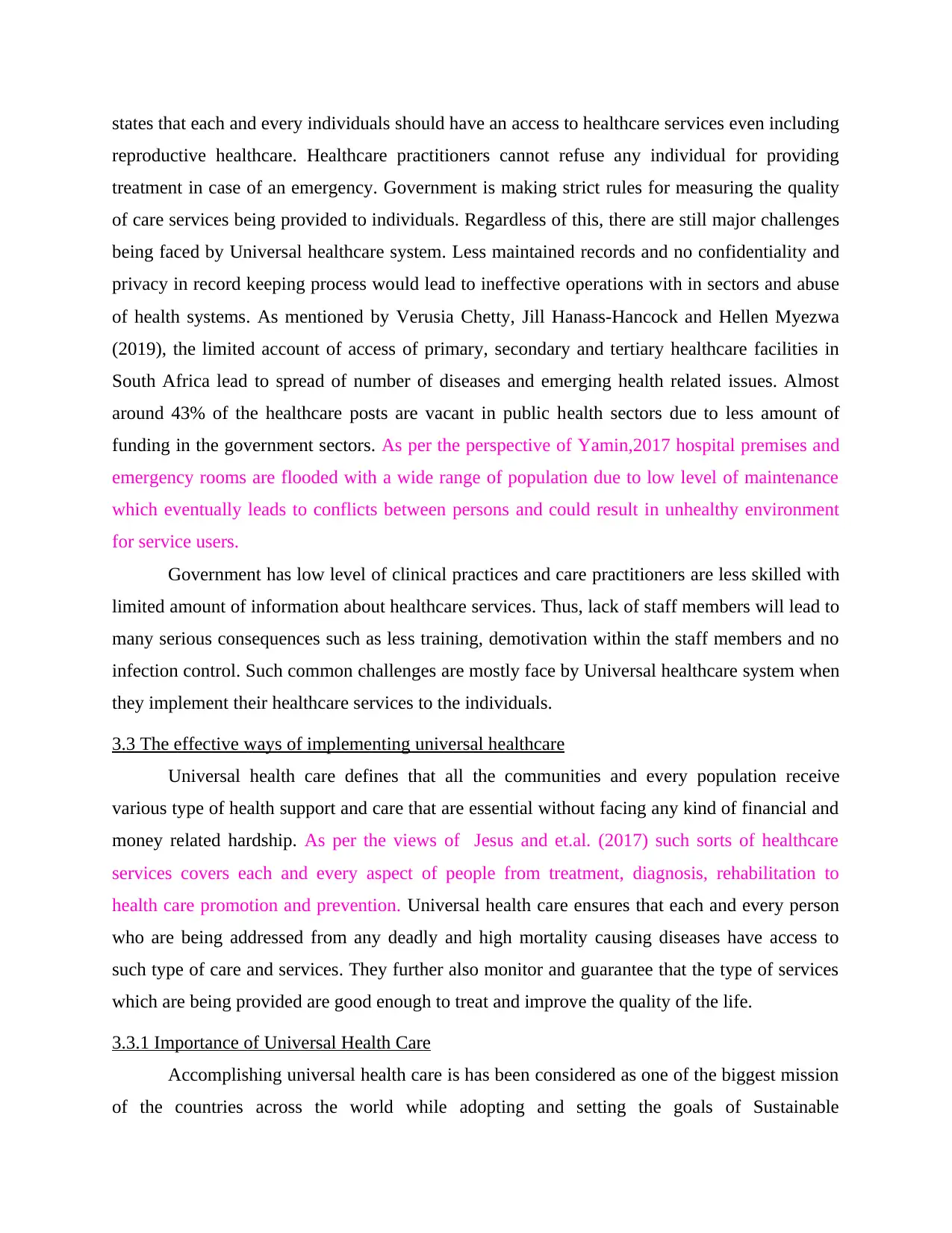
states that each and every individuals should have an access to healthcare services even including
reproductive healthcare. Healthcare practitioners cannot refuse any individual for providing
treatment in case of an emergency. Government is making strict rules for measuring the quality
of care services being provided to individuals. Regardless of this, there are still major challenges
being faced by Universal healthcare system. Less maintained records and no confidentiality and
privacy in record keeping process would lead to ineffective operations with in sectors and abuse
of health systems. As mentioned by Verusia Chetty, Jill Hanass-Hancock and Hellen Myezwa
(2019), the limited account of access of primary, secondary and tertiary healthcare facilities in
South Africa lead to spread of number of diseases and emerging health related issues. Almost
around 43% of the healthcare posts are vacant in public health sectors due to less amount of
funding in the government sectors. As per the perspective of Yamin,2017 hospital premises and
emergency rooms are flooded with a wide range of population due to low level of maintenance
which eventually leads to conflicts between persons and could result in unhealthy environment
for service users.
Government has low level of clinical practices and care practitioners are less skilled with
limited amount of information about healthcare services. Thus, lack of staff members will lead to
many serious consequences such as less training, demotivation within the staff members and no
infection control. Such common challenges are mostly face by Universal healthcare system when
they implement their healthcare services to the individuals.
3.3 The effective ways of implementing universal healthcare
Universal health care defines that all the communities and every population receive
various type of health support and care that are essential without facing any kind of financial and
money related hardship. As per the views of Jesus and et.al. (2017) such sorts of healthcare
services covers each and every aspect of people from treatment, diagnosis, rehabilitation to
health care promotion and prevention. Universal health care ensures that each and every person
who are being addressed from any deadly and high mortality causing diseases have access to
such type of care and services. They further also monitor and guarantee that the type of services
which are being provided are good enough to treat and improve the quality of the life.
3.3.1 Importance of Universal Health Care
Accomplishing universal health care is has been considered as one of the biggest mission
of the countries across the world while adopting and setting the goals of Sustainable
reproductive healthcare. Healthcare practitioners cannot refuse any individual for providing
treatment in case of an emergency. Government is making strict rules for measuring the quality
of care services being provided to individuals. Regardless of this, there are still major challenges
being faced by Universal healthcare system. Less maintained records and no confidentiality and
privacy in record keeping process would lead to ineffective operations with in sectors and abuse
of health systems. As mentioned by Verusia Chetty, Jill Hanass-Hancock and Hellen Myezwa
(2019), the limited account of access of primary, secondary and tertiary healthcare facilities in
South Africa lead to spread of number of diseases and emerging health related issues. Almost
around 43% of the healthcare posts are vacant in public health sectors due to less amount of
funding in the government sectors. As per the perspective of Yamin,2017 hospital premises and
emergency rooms are flooded with a wide range of population due to low level of maintenance
which eventually leads to conflicts between persons and could result in unhealthy environment
for service users.
Government has low level of clinical practices and care practitioners are less skilled with
limited amount of information about healthcare services. Thus, lack of staff members will lead to
many serious consequences such as less training, demotivation within the staff members and no
infection control. Such common challenges are mostly face by Universal healthcare system when
they implement their healthcare services to the individuals.
3.3 The effective ways of implementing universal healthcare
Universal health care defines that all the communities and every population receive
various type of health support and care that are essential without facing any kind of financial and
money related hardship. As per the views of Jesus and et.al. (2017) such sorts of healthcare
services covers each and every aspect of people from treatment, diagnosis, rehabilitation to
health care promotion and prevention. Universal health care ensures that each and every person
who are being addressed from any deadly and high mortality causing diseases have access to
such type of care and services. They further also monitor and guarantee that the type of services
which are being provided are good enough to treat and improve the quality of the life.
3.3.1 Importance of Universal Health Care
Accomplishing universal health care is has been considered as one of the biggest mission
of the countries across the world while adopting and setting the goals of Sustainable
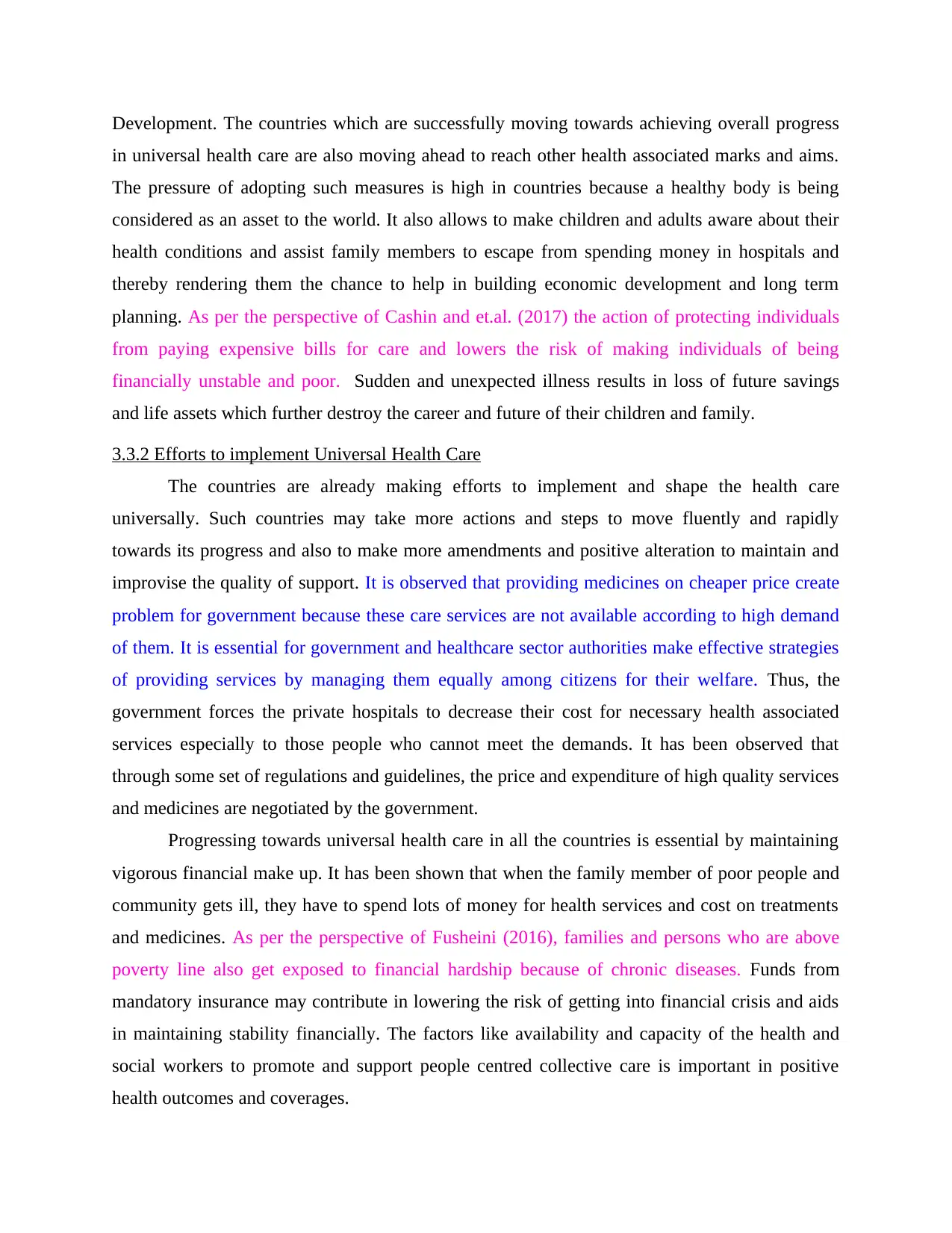
Development. The countries which are successfully moving towards achieving overall progress
in universal health care are also moving ahead to reach other health associated marks and aims.
The pressure of adopting such measures is high in countries because a healthy body is being
considered as an asset to the world. It also allows to make children and adults aware about their
health conditions and assist family members to escape from spending money in hospitals and
thereby rendering them the chance to help in building economic development and long term
planning. As per the perspective of Cashin and et.al. (2017) the action of protecting individuals
from paying expensive bills for care and lowers the risk of making individuals of being
financially unstable and poor. Sudden and unexpected illness results in loss of future savings
and life assets which further destroy the career and future of their children and family.
3.3.2 Efforts to implement Universal Health Care
The countries are already making efforts to implement and shape the health care
universally. Such countries may take more actions and steps to move fluently and rapidly
towards its progress and also to make more amendments and positive alteration to maintain and
improvise the quality of support. It is observed that providing medicines on cheaper price create
problem for government because these care services are not available according to high demand
of them. It is essential for government and healthcare sector authorities make effective strategies
of providing services by managing them equally among citizens for their welfare. Thus, the
government forces the private hospitals to decrease their cost for necessary health associated
services especially to those people who cannot meet the demands. It has been observed that
through some set of regulations and guidelines, the price and expenditure of high quality services
and medicines are negotiated by the government.
Progressing towards universal health care in all the countries is essential by maintaining
vigorous financial make up. It has been shown that when the family member of poor people and
community gets ill, they have to spend lots of money for health services and cost on treatments
and medicines. As per the perspective of Fusheini (2016), families and persons who are above
poverty line also get exposed to financial hardship because of chronic diseases. Funds from
mandatory insurance may contribute in lowering the risk of getting into financial crisis and aids
in maintaining stability financially. The factors like availability and capacity of the health and
social workers to promote and support people centred collective care is important in positive
health outcomes and coverages.
in universal health care are also moving ahead to reach other health associated marks and aims.
The pressure of adopting such measures is high in countries because a healthy body is being
considered as an asset to the world. It also allows to make children and adults aware about their
health conditions and assist family members to escape from spending money in hospitals and
thereby rendering them the chance to help in building economic development and long term
planning. As per the perspective of Cashin and et.al. (2017) the action of protecting individuals
from paying expensive bills for care and lowers the risk of making individuals of being
financially unstable and poor. Sudden and unexpected illness results in loss of future savings
and life assets which further destroy the career and future of their children and family.
3.3.2 Efforts to implement Universal Health Care
The countries are already making efforts to implement and shape the health care
universally. Such countries may take more actions and steps to move fluently and rapidly
towards its progress and also to make more amendments and positive alteration to maintain and
improvise the quality of support. It is observed that providing medicines on cheaper price create
problem for government because these care services are not available according to high demand
of them. It is essential for government and healthcare sector authorities make effective strategies
of providing services by managing them equally among citizens for their welfare. Thus, the
government forces the private hospitals to decrease their cost for necessary health associated
services especially to those people who cannot meet the demands. It has been observed that
through some set of regulations and guidelines, the price and expenditure of high quality services
and medicines are negotiated by the government.
Progressing towards universal health care in all the countries is essential by maintaining
vigorous financial make up. It has been shown that when the family member of poor people and
community gets ill, they have to spend lots of money for health services and cost on treatments
and medicines. As per the perspective of Fusheini (2016), families and persons who are above
poverty line also get exposed to financial hardship because of chronic diseases. Funds from
mandatory insurance may contribute in lowering the risk of getting into financial crisis and aids
in maintaining stability financially. The factors like availability and capacity of the health and
social workers to promote and support people centred collective care is important in positive
health outcomes and coverages.
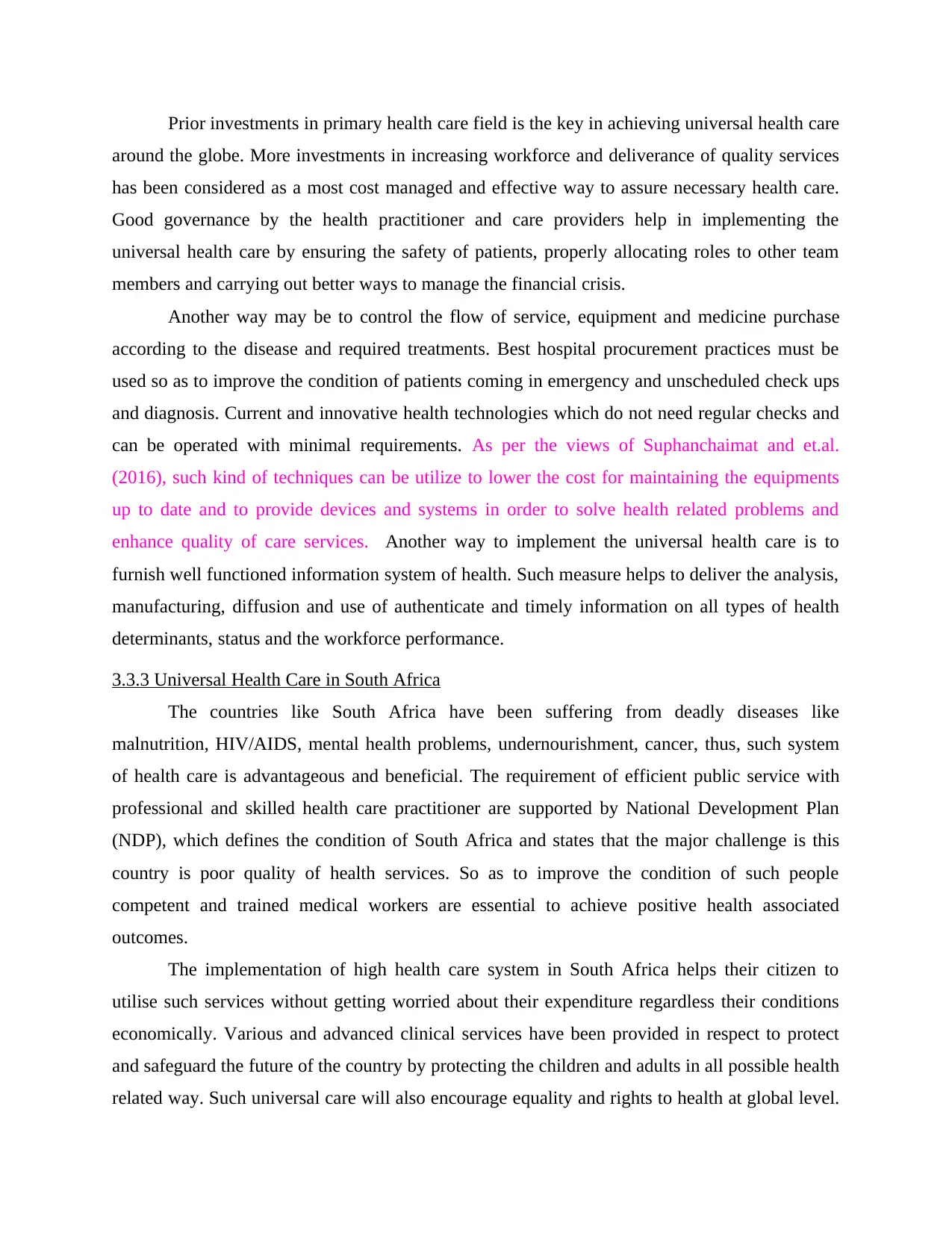
Prior investments in primary health care field is the key in achieving universal health care
around the globe. More investments in increasing workforce and deliverance of quality services
has been considered as a most cost managed and effective way to assure necessary health care.
Good governance by the health practitioner and care providers help in implementing the
universal health care by ensuring the safety of patients, properly allocating roles to other team
members and carrying out better ways to manage the financial crisis.
Another way may be to control the flow of service, equipment and medicine purchase
according to the disease and required treatments. Best hospital procurement practices must be
used so as to improve the condition of patients coming in emergency and unscheduled check ups
and diagnosis. Current and innovative health technologies which do not need regular checks and
can be operated with minimal requirements. As per the views of Suphanchaimat and et.al.
(2016), such kind of techniques can be utilize to lower the cost for maintaining the equipments
up to date and to provide devices and systems in order to solve health related problems and
enhance quality of care services. Another way to implement the universal health care is to
furnish well functioned information system of health. Such measure helps to deliver the analysis,
manufacturing, diffusion and use of authenticate and timely information on all types of health
determinants, status and the workforce performance.
3.3.3 Universal Health Care in South Africa
The countries like South Africa have been suffering from deadly diseases like
malnutrition, HIV/AIDS, mental health problems, undernourishment, cancer, thus, such system
of health care is advantageous and beneficial. The requirement of efficient public service with
professional and skilled health care practitioner are supported by National Development Plan
(NDP), which defines the condition of South Africa and states that the major challenge is this
country is poor quality of health services. So as to improve the condition of such people
competent and trained medical workers are essential to achieve positive health associated
outcomes.
The implementation of high health care system in South Africa helps their citizen to
utilise such services without getting worried about their expenditure regardless their conditions
economically. Various and advanced clinical services have been provided in respect to protect
and safeguard the future of the country by protecting the children and adults in all possible health
related way. Such universal care will also encourage equality and rights to health at global level.
around the globe. More investments in increasing workforce and deliverance of quality services
has been considered as a most cost managed and effective way to assure necessary health care.
Good governance by the health practitioner and care providers help in implementing the
universal health care by ensuring the safety of patients, properly allocating roles to other team
members and carrying out better ways to manage the financial crisis.
Another way may be to control the flow of service, equipment and medicine purchase
according to the disease and required treatments. Best hospital procurement practices must be
used so as to improve the condition of patients coming in emergency and unscheduled check ups
and diagnosis. Current and innovative health technologies which do not need regular checks and
can be operated with minimal requirements. As per the views of Suphanchaimat and et.al.
(2016), such kind of techniques can be utilize to lower the cost for maintaining the equipments
up to date and to provide devices and systems in order to solve health related problems and
enhance quality of care services. Another way to implement the universal health care is to
furnish well functioned information system of health. Such measure helps to deliver the analysis,
manufacturing, diffusion and use of authenticate and timely information on all types of health
determinants, status and the workforce performance.
3.3.3 Universal Health Care in South Africa
The countries like South Africa have been suffering from deadly diseases like
malnutrition, HIV/AIDS, mental health problems, undernourishment, cancer, thus, such system
of health care is advantageous and beneficial. The requirement of efficient public service with
professional and skilled health care practitioner are supported by National Development Plan
(NDP), which defines the condition of South Africa and states that the major challenge is this
country is poor quality of health services. So as to improve the condition of such people
competent and trained medical workers are essential to achieve positive health associated
outcomes.
The implementation of high health care system in South Africa helps their citizen to
utilise such services without getting worried about their expenditure regardless their conditions
economically. Various and advanced clinical services have been provided in respect to protect
and safeguard the future of the country by protecting the children and adults in all possible health
related way. Such universal care will also encourage equality and rights to health at global level.
Secure Best Marks with AI Grader
Need help grading? Try our AI Grader for instant feedback on your assignments.
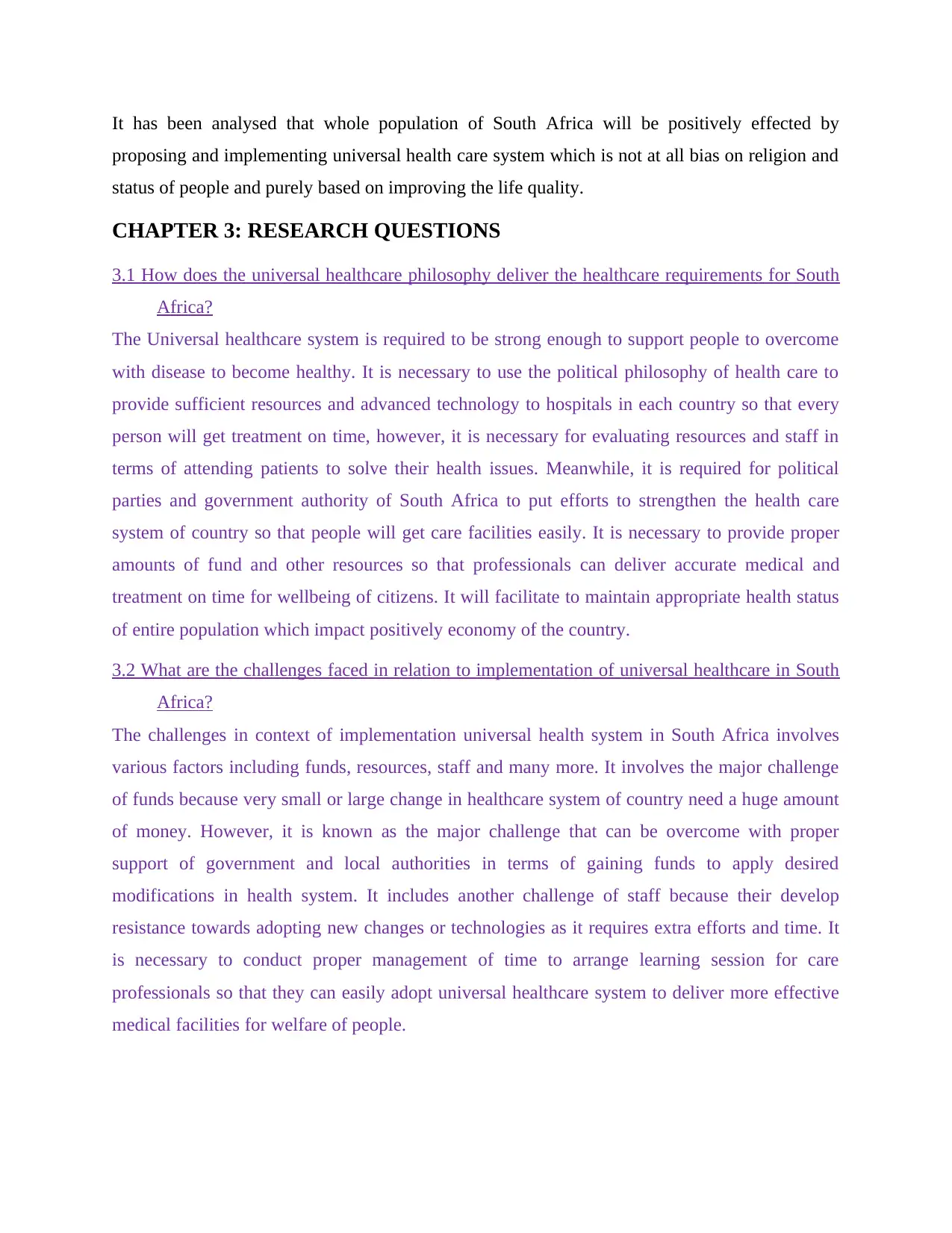
It has been analysed that whole population of South Africa will be positively effected by
proposing and implementing universal health care system which is not at all bias on religion and
status of people and purely based on improving the life quality.
CHAPTER 3: RESEARCH QUESTIONS
3.1 How does the universal healthcare philosophy deliver the healthcare requirements for South
Africa?
The Universal healthcare system is required to be strong enough to support people to overcome
with disease to become healthy. It is necessary to use the political philosophy of health care to
provide sufficient resources and advanced technology to hospitals in each country so that every
person will get treatment on time, however, it is necessary for evaluating resources and staff in
terms of attending patients to solve their health issues. Meanwhile, it is required for political
parties and government authority of South Africa to put efforts to strengthen the health care
system of country so that people will get care facilities easily. It is necessary to provide proper
amounts of fund and other resources so that professionals can deliver accurate medical and
treatment on time for wellbeing of citizens. It will facilitate to maintain appropriate health status
of entire population which impact positively economy of the country.
3.2 What are the challenges faced in relation to implementation of universal healthcare in South
Africa?
The challenges in context of implementation universal health system in South Africa involves
various factors including funds, resources, staff and many more. It involves the major challenge
of funds because very small or large change in healthcare system of country need a huge amount
of money. However, it is known as the major challenge that can be overcome with proper
support of government and local authorities in terms of gaining funds to apply desired
modifications in health system. It includes another challenge of staff because their develop
resistance towards adopting new changes or technologies as it requires extra efforts and time. It
is necessary to conduct proper management of time to arrange learning session for care
professionals so that they can easily adopt universal healthcare system to deliver more effective
medical facilities for welfare of people.
proposing and implementing universal health care system which is not at all bias on religion and
status of people and purely based on improving the life quality.
CHAPTER 3: RESEARCH QUESTIONS
3.1 How does the universal healthcare philosophy deliver the healthcare requirements for South
Africa?
The Universal healthcare system is required to be strong enough to support people to overcome
with disease to become healthy. It is necessary to use the political philosophy of health care to
provide sufficient resources and advanced technology to hospitals in each country so that every
person will get treatment on time, however, it is necessary for evaluating resources and staff in
terms of attending patients to solve their health issues. Meanwhile, it is required for political
parties and government authority of South Africa to put efforts to strengthen the health care
system of country so that people will get care facilities easily. It is necessary to provide proper
amounts of fund and other resources so that professionals can deliver accurate medical and
treatment on time for wellbeing of citizens. It will facilitate to maintain appropriate health status
of entire population which impact positively economy of the country.
3.2 What are the challenges faced in relation to implementation of universal healthcare in South
Africa?
The challenges in context of implementation universal health system in South Africa involves
various factors including funds, resources, staff and many more. It involves the major challenge
of funds because very small or large change in healthcare system of country need a huge amount
of money. However, it is known as the major challenge that can be overcome with proper
support of government and local authorities in terms of gaining funds to apply desired
modifications in health system. It includes another challenge of staff because their develop
resistance towards adopting new changes or technologies as it requires extra efforts and time. It
is necessary to conduct proper management of time to arrange learning session for care
professionals so that they can easily adopt universal healthcare system to deliver more effective
medical facilities for welfare of people.
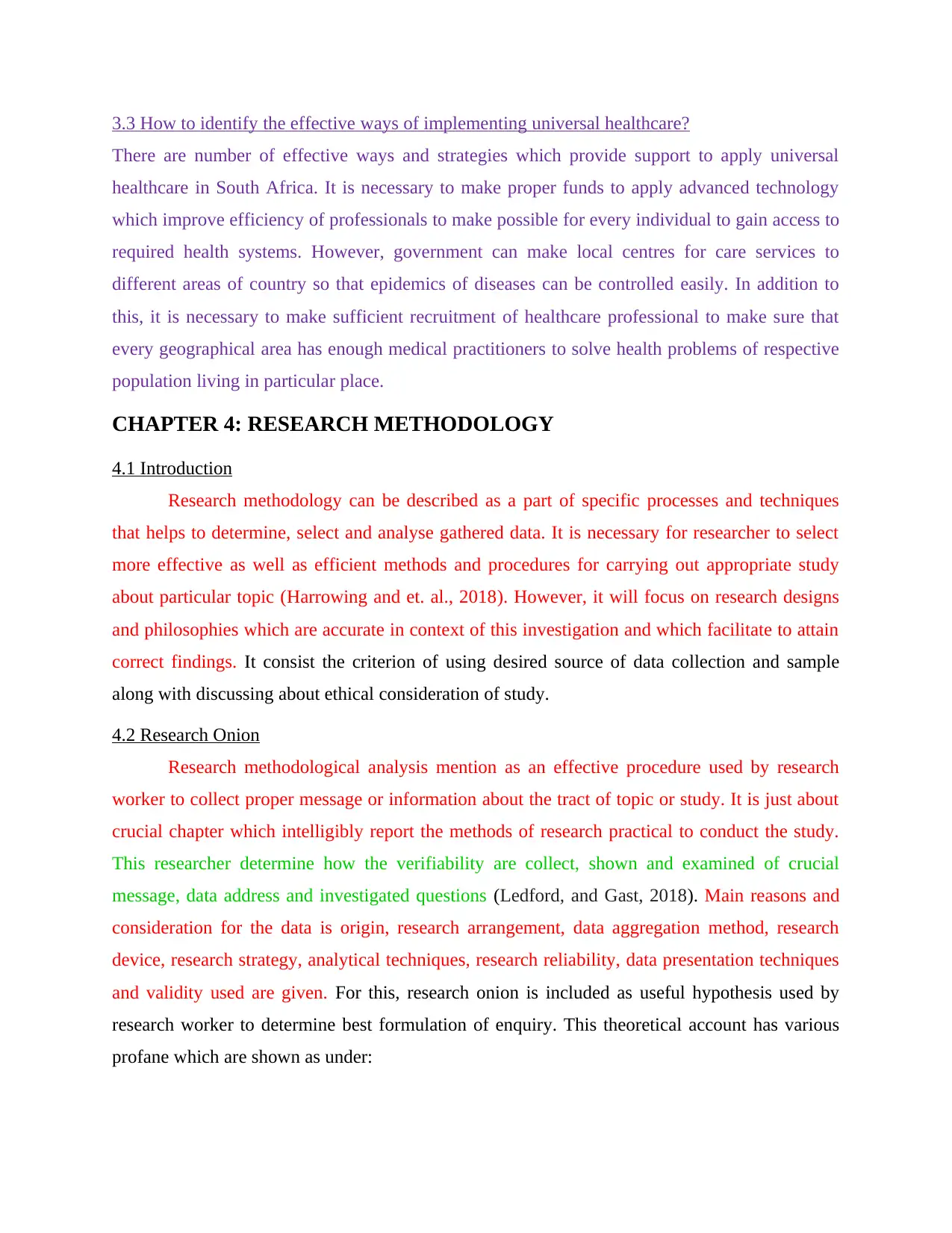
3.3 How to identify the effective ways of implementing universal healthcare?
There are number of effective ways and strategies which provide support to apply universal
healthcare in South Africa. It is necessary to make proper funds to apply advanced technology
which improve efficiency of professionals to make possible for every individual to gain access to
required health systems. However, government can make local centres for care services to
different areas of country so that epidemics of diseases can be controlled easily. In addition to
this, it is necessary to make sufficient recruitment of healthcare professional to make sure that
every geographical area has enough medical practitioners to solve health problems of respective
population living in particular place.
CHAPTER 4: RESEARCH METHODOLOGY
4.1 Introduction
Research methodology can be described as a part of specific processes and techniques
that helps to determine, select and analyse gathered data. It is necessary for researcher to select
more effective as well as efficient methods and procedures for carrying out appropriate study
about particular topic (Harrowing and et. al., 2018). However, it will focus on research designs
and philosophies which are accurate in context of this investigation and which facilitate to attain
correct findings. It consist the criterion of using desired source of data collection and sample
along with discussing about ethical consideration of study.
4.2 Research Onion
Research methodological analysis mention as an effective procedure used by research
worker to collect proper message or information about the tract of topic or study. It is just about
crucial chapter which intelligibly report the methods of research practical to conduct the study.
This researcher determine how the verifiability are collect, shown and examined of crucial
message, data address and investigated questions (Ledford, and Gast, 2018). Main reasons and
consideration for the data is origin, research arrangement, data aggregation method, research
device, research strategy, analytical techniques, research reliability, data presentation techniques
and validity used are given. For this, research onion is included as useful hypothesis used by
research worker to determine best formulation of enquiry. This theoretical account has various
profane which are shown as under:
There are number of effective ways and strategies which provide support to apply universal
healthcare in South Africa. It is necessary to make proper funds to apply advanced technology
which improve efficiency of professionals to make possible for every individual to gain access to
required health systems. However, government can make local centres for care services to
different areas of country so that epidemics of diseases can be controlled easily. In addition to
this, it is necessary to make sufficient recruitment of healthcare professional to make sure that
every geographical area has enough medical practitioners to solve health problems of respective
population living in particular place.
CHAPTER 4: RESEARCH METHODOLOGY
4.1 Introduction
Research methodology can be described as a part of specific processes and techniques
that helps to determine, select and analyse gathered data. It is necessary for researcher to select
more effective as well as efficient methods and procedures for carrying out appropriate study
about particular topic (Harrowing and et. al., 2018). However, it will focus on research designs
and philosophies which are accurate in context of this investigation and which facilitate to attain
correct findings. It consist the criterion of using desired source of data collection and sample
along with discussing about ethical consideration of study.
4.2 Research Onion
Research methodological analysis mention as an effective procedure used by research
worker to collect proper message or information about the tract of topic or study. It is just about
crucial chapter which intelligibly report the methods of research practical to conduct the study.
This researcher determine how the verifiability are collect, shown and examined of crucial
message, data address and investigated questions (Ledford, and Gast, 2018). Main reasons and
consideration for the data is origin, research arrangement, data aggregation method, research
device, research strategy, analytical techniques, research reliability, data presentation techniques
and validity used are given. For this, research onion is included as useful hypothesis used by
research worker to determine best formulation of enquiry. This theoretical account has various
profane which are shown as under:
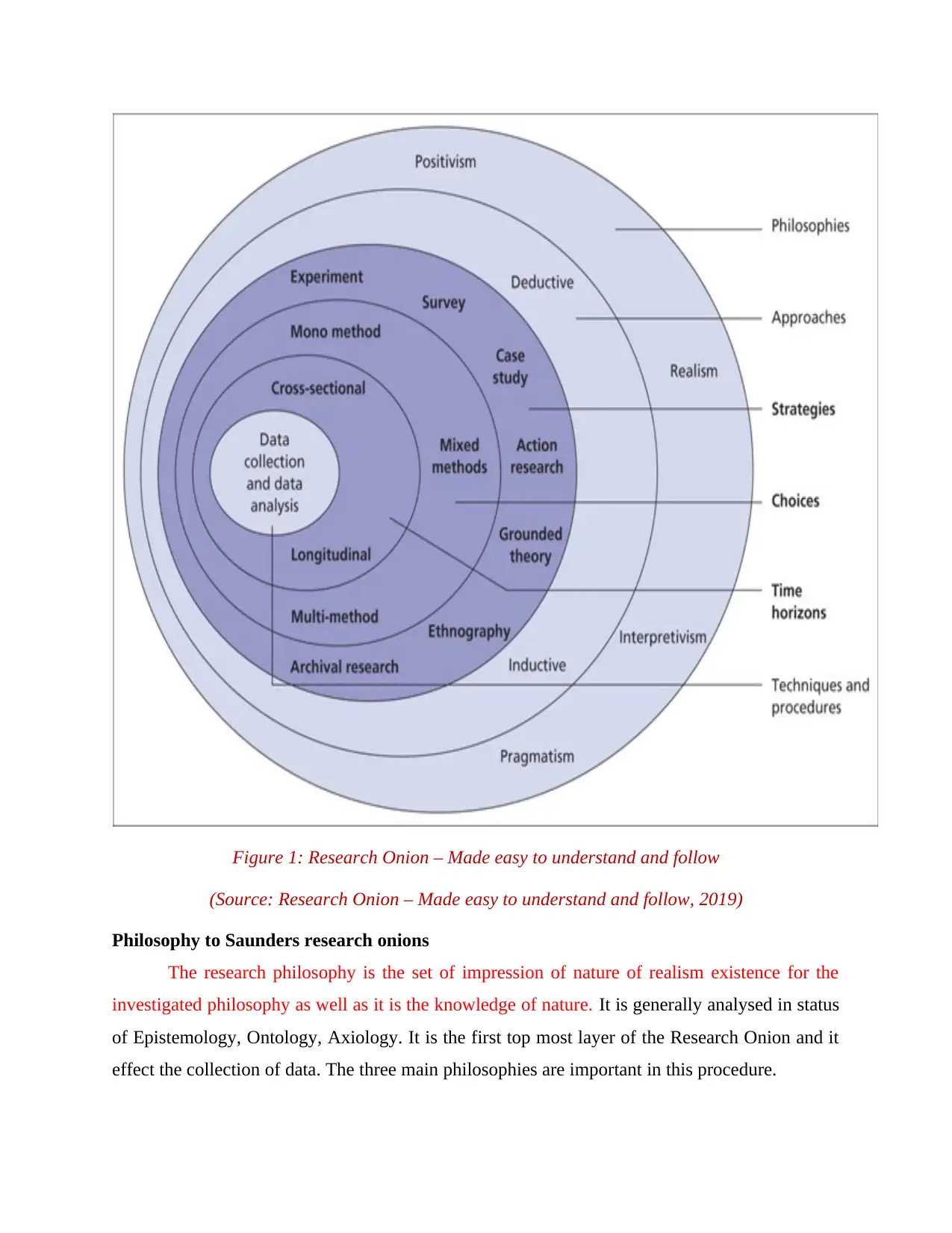
Figure 1: Research Onion – Made easy to understand and follow
(Source: Research Onion – Made easy to understand and follow, 2019)
Philosophy to Saunders research onions
The research philosophy is the set of impression of nature of realism existence for the
investigated philosophy as well as it is the knowledge of nature. It is generally analysed in status
of Epistemology, Ontology, Axiology. It is the first top most layer of the Research Onion and it
effect the collection of data. The three main philosophies are important in this procedure.
(Source: Research Onion – Made easy to understand and follow, 2019)
Philosophy to Saunders research onions
The research philosophy is the set of impression of nature of realism existence for the
investigated philosophy as well as it is the knowledge of nature. It is generally analysed in status
of Epistemology, Ontology, Axiology. It is the first top most layer of the Research Onion and it
effect the collection of data. The three main philosophies are important in this procedure.
Paraphrase This Document
Need a fresh take? Get an instant paraphrase of this document with our AI Paraphraser
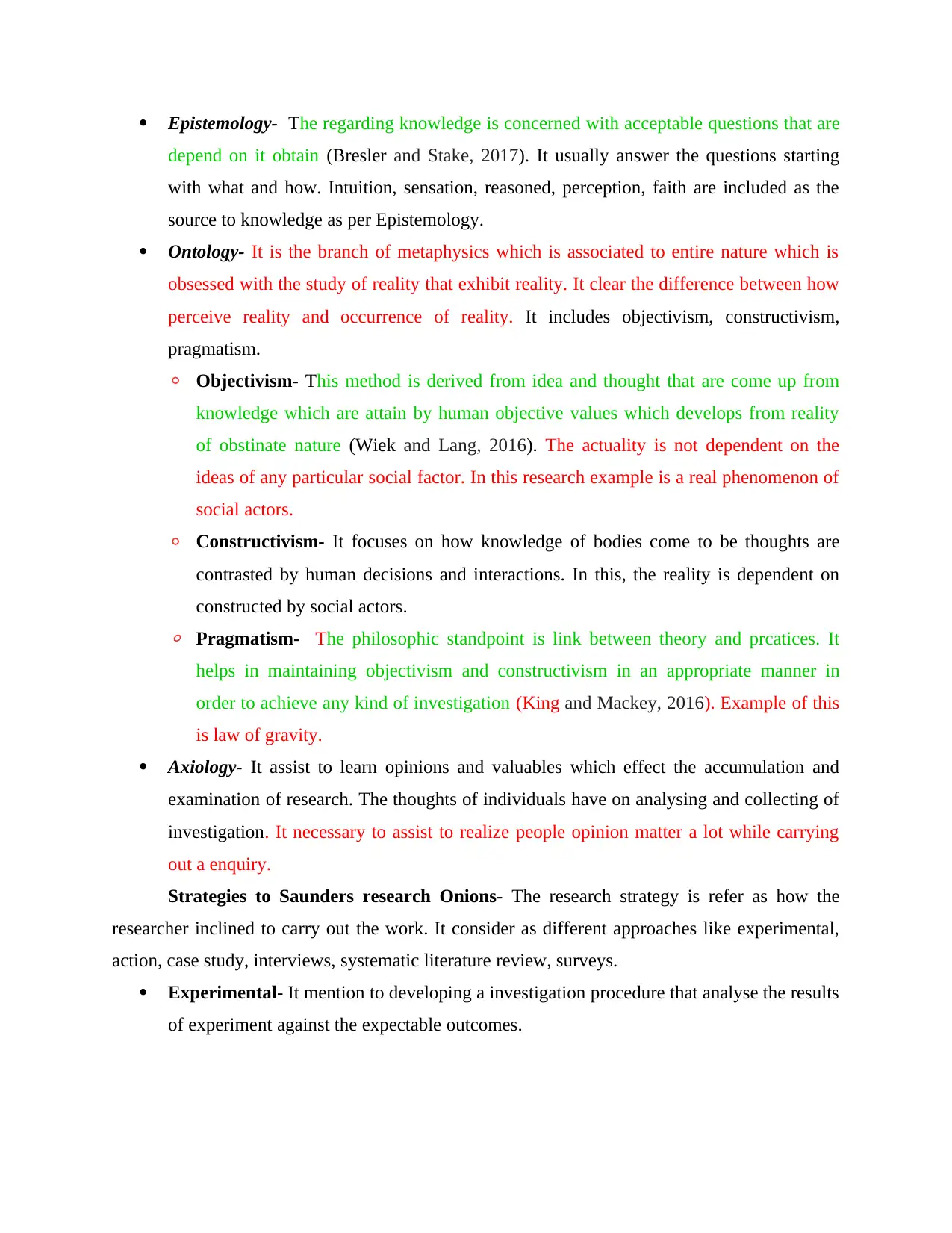
Epistemology- The regarding knowledge is concerned with acceptable questions that are
depend on it obtain (Bresler and Stake, 2017). It usually answer the questions starting
with what and how. Intuition, sensation, reasoned, perception, faith are included as the
source to knowledge as per Epistemology.
Ontology- It is the branch of metaphysics which is associated to entire nature which is
obsessed with the study of reality that exhibit reality. It clear the difference between how
perceive reality and occurrence of reality. It includes objectivism, constructivism,
pragmatism.
◦ Objectivism- This method is derived from idea and thought that are come up from
knowledge which are attain by human objective values which develops from reality
of obstinate nature (Wiek and Lang, 2016). The actuality is not dependent on the
ideas of any particular social factor. In this research example is a real phenomenon of
social actors.
◦ Constructivism- It focuses on how knowledge of bodies come to be thoughts are
contrasted by human decisions and interactions. In this, the reality is dependent on
constructed by social actors.
◦ Pragmatism- The philosophic standpoint is link between theory and prcatices. It
helps in maintaining objectivism and constructivism in an appropriate manner in
order to achieve any kind of investigation (King and Mackey, 2016). Example of this
is law of gravity.
Axiology- It assist to learn opinions and valuables which effect the accumulation and
examination of research. The thoughts of individuals have on analysing and collecting of
investigation. It necessary to assist to realize people opinion matter a lot while carrying
out a enquiry.
Strategies to Saunders research Onions- The research strategy is refer as how the
researcher inclined to carry out the work. It consider as different approaches like experimental,
action, case study, interviews, systematic literature review, surveys.
Experimental- It mention to developing a investigation procedure that analyse the results
of experiment against the expectable outcomes.
depend on it obtain (Bresler and Stake, 2017). It usually answer the questions starting
with what and how. Intuition, sensation, reasoned, perception, faith are included as the
source to knowledge as per Epistemology.
Ontology- It is the branch of metaphysics which is associated to entire nature which is
obsessed with the study of reality that exhibit reality. It clear the difference between how
perceive reality and occurrence of reality. It includes objectivism, constructivism,
pragmatism.
◦ Objectivism- This method is derived from idea and thought that are come up from
knowledge which are attain by human objective values which develops from reality
of obstinate nature (Wiek and Lang, 2016). The actuality is not dependent on the
ideas of any particular social factor. In this research example is a real phenomenon of
social actors.
◦ Constructivism- It focuses on how knowledge of bodies come to be thoughts are
contrasted by human decisions and interactions. In this, the reality is dependent on
constructed by social actors.
◦ Pragmatism- The philosophic standpoint is link between theory and prcatices. It
helps in maintaining objectivism and constructivism in an appropriate manner in
order to achieve any kind of investigation (King and Mackey, 2016). Example of this
is law of gravity.
Axiology- It assist to learn opinions and valuables which effect the accumulation and
examination of research. The thoughts of individuals have on analysing and collecting of
investigation. It necessary to assist to realize people opinion matter a lot while carrying
out a enquiry.
Strategies to Saunders research Onions- The research strategy is refer as how the
researcher inclined to carry out the work. It consider as different approaches like experimental,
action, case study, interviews, systematic literature review, surveys.
Experimental- It mention to developing a investigation procedure that analyse the results
of experiment against the expectable outcomes.
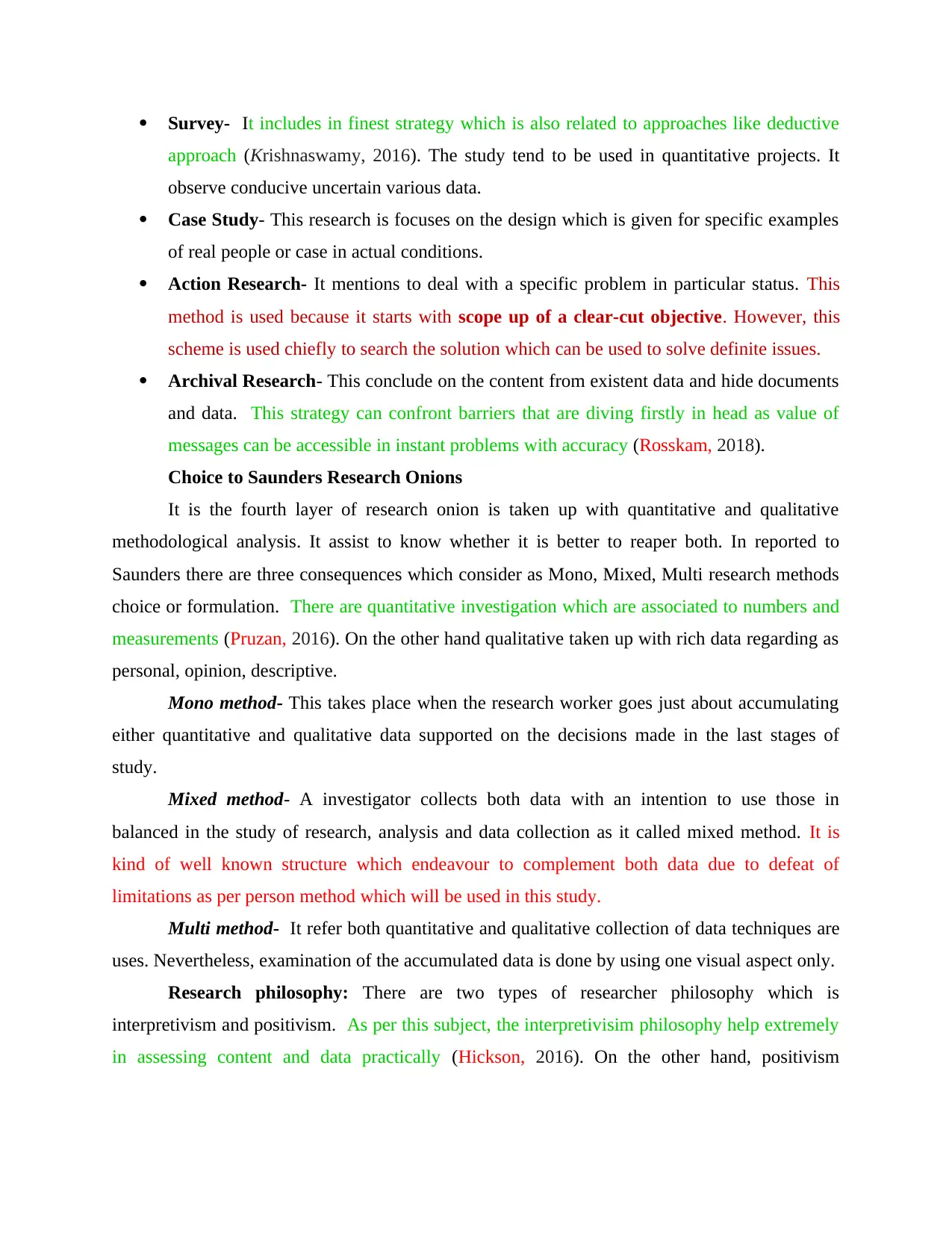
Survey- It includes in finest strategy which is also related to approaches like deductive
approach (Krishnaswamy, 2016). The study tend to be used in quantitative projects. It
observe conducive uncertain various data.
Case Study- This research is focuses on the design which is given for specific examples
of real people or case in actual conditions.
Action Research- It mentions to deal with a specific problem in particular status. This
method is used because it starts with scope up of a clear-cut objective. However, this
scheme is used chiefly to search the solution which can be used to solve definite issues.
Archival Research- This conclude on the content from existent data and hide documents
and data. This strategy can confront barriers that are diving firstly in head as value of
messages can be accessible in instant problems with accuracy (Rosskam, 2018).
Choice to Saunders Research Onions
It is the fourth layer of research onion is taken up with quantitative and qualitative
methodological analysis. It assist to know whether it is better to reaper both. In reported to
Saunders there are three consequences which consider as Mono, Mixed, Multi research methods
choice or formulation. There are quantitative investigation which are associated to numbers and
measurements (Pruzan, 2016). On the other hand qualitative taken up with rich data regarding as
personal, opinion, descriptive.
Mono method- This takes place when the research worker goes just about accumulating
either quantitative and qualitative data supported on the decisions made in the last stages of
study.
Mixed method- A investigator collects both data with an intention to use those in
balanced in the study of research, analysis and data collection as it called mixed method. It is
kind of well known structure which endeavour to complement both data due to defeat of
limitations as per person method which will be used in this study.
Multi method- It refer both quantitative and qualitative collection of data techniques are
uses. Nevertheless, examination of the accumulated data is done by using one visual aspect only.
Research philosophy: There are two types of researcher philosophy which is
interpretivism and positivism. As per this subject, the interpretivisim philosophy help extremely
in assessing content and data practically (Hickson, 2016). On the other hand, positivism
approach (Krishnaswamy, 2016). The study tend to be used in quantitative projects. It
observe conducive uncertain various data.
Case Study- This research is focuses on the design which is given for specific examples
of real people or case in actual conditions.
Action Research- It mentions to deal with a specific problem in particular status. This
method is used because it starts with scope up of a clear-cut objective. However, this
scheme is used chiefly to search the solution which can be used to solve definite issues.
Archival Research- This conclude on the content from existent data and hide documents
and data. This strategy can confront barriers that are diving firstly in head as value of
messages can be accessible in instant problems with accuracy (Rosskam, 2018).
Choice to Saunders Research Onions
It is the fourth layer of research onion is taken up with quantitative and qualitative
methodological analysis. It assist to know whether it is better to reaper both. In reported to
Saunders there are three consequences which consider as Mono, Mixed, Multi research methods
choice or formulation. There are quantitative investigation which are associated to numbers and
measurements (Pruzan, 2016). On the other hand qualitative taken up with rich data regarding as
personal, opinion, descriptive.
Mono method- This takes place when the research worker goes just about accumulating
either quantitative and qualitative data supported on the decisions made in the last stages of
study.
Mixed method- A investigator collects both data with an intention to use those in
balanced in the study of research, analysis and data collection as it called mixed method. It is
kind of well known structure which endeavour to complement both data due to defeat of
limitations as per person method which will be used in this study.
Multi method- It refer both quantitative and qualitative collection of data techniques are
uses. Nevertheless, examination of the accumulated data is done by using one visual aspect only.
Research philosophy: There are two types of researcher philosophy which is
interpretivism and positivism. As per this subject, the interpretivisim philosophy help extremely
in assessing content and data practically (Hickson, 2016). On the other hand, positivism
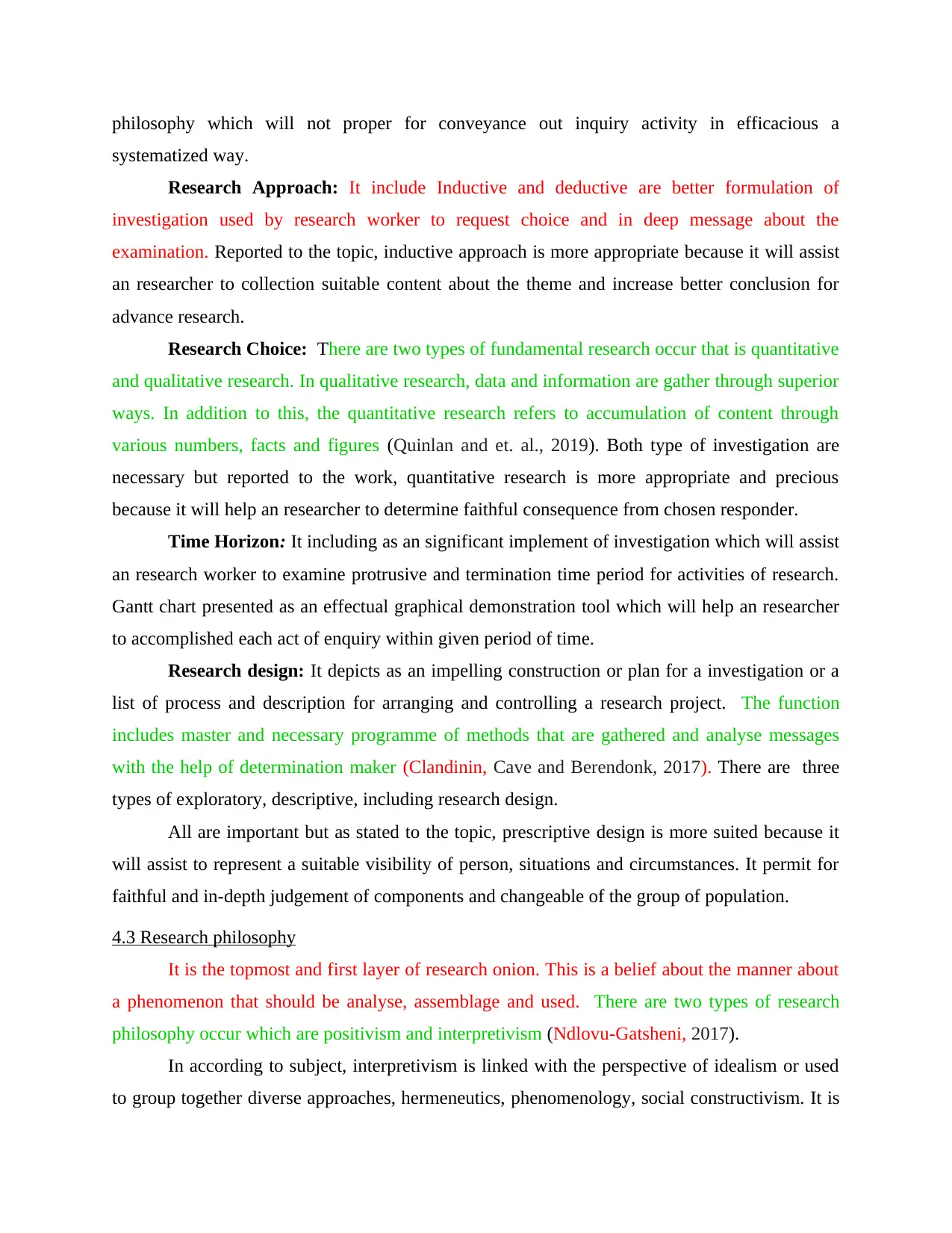
philosophy which will not proper for conveyance out inquiry activity in efficacious a
systematized way.
Research Approach: It include Inductive and deductive are better formulation of
investigation used by research worker to request choice and in deep message about the
examination. Reported to the topic, inductive approach is more appropriate because it will assist
an researcher to collection suitable content about the theme and increase better conclusion for
advance research.
Research Choice: There are two types of fundamental research occur that is quantitative
and qualitative research. In qualitative research, data and information are gather through superior
ways. In addition to this, the quantitative research refers to accumulation of content through
various numbers, facts and figures (Quinlan and et. al., 2019). Both type of investigation are
necessary but reported to the work, quantitative research is more appropriate and precious
because it will help an researcher to determine faithful consequence from chosen responder.
Time Horizon: It including as an significant implement of investigation which will assist
an research worker to examine protrusive and termination time period for activities of research.
Gantt chart presented as an effectual graphical demonstration tool which will help an researcher
to accomplished each act of enquiry within given period of time.
Research design: It depicts as an impelling construction or plan for a investigation or a
list of process and description for arranging and controlling a research project. The function
includes master and necessary programme of methods that are gathered and analyse messages
with the help of determination maker (Clandinin, Cave and Berendonk, 2017). There are three
types of exploratory, descriptive, including research design.
All are important but as stated to the topic, prescriptive design is more suited because it
will assist to represent a suitable visibility of person, situations and circumstances. It permit for
faithful and in-depth judgement of components and changeable of the group of population.
4.3 Research philosophy
It is the topmost and first layer of research onion. This is a belief about the manner about
a phenomenon that should be analyse, assemblage and used. There are two types of research
philosophy occur which are positivism and interpretivism (Ndlovu-Gatsheni, 2017).
In according to subject, interpretivism is linked with the perspective of idealism or used
to group together diverse approaches, hermeneutics, phenomenology, social constructivism. It is
systematized way.
Research Approach: It include Inductive and deductive are better formulation of
investigation used by research worker to request choice and in deep message about the
examination. Reported to the topic, inductive approach is more appropriate because it will assist
an researcher to collection suitable content about the theme and increase better conclusion for
advance research.
Research Choice: There are two types of fundamental research occur that is quantitative
and qualitative research. In qualitative research, data and information are gather through superior
ways. In addition to this, the quantitative research refers to accumulation of content through
various numbers, facts and figures (Quinlan and et. al., 2019). Both type of investigation are
necessary but reported to the work, quantitative research is more appropriate and precious
because it will help an researcher to determine faithful consequence from chosen responder.
Time Horizon: It including as an significant implement of investigation which will assist
an research worker to examine protrusive and termination time period for activities of research.
Gantt chart presented as an effectual graphical demonstration tool which will help an researcher
to accomplished each act of enquiry within given period of time.
Research design: It depicts as an impelling construction or plan for a investigation or a
list of process and description for arranging and controlling a research project. The function
includes master and necessary programme of methods that are gathered and analyse messages
with the help of determination maker (Clandinin, Cave and Berendonk, 2017). There are three
types of exploratory, descriptive, including research design.
All are important but as stated to the topic, prescriptive design is more suited because it
will assist to represent a suitable visibility of person, situations and circumstances. It permit for
faithful and in-depth judgement of components and changeable of the group of population.
4.3 Research philosophy
It is the topmost and first layer of research onion. This is a belief about the manner about
a phenomenon that should be analyse, assemblage and used. There are two types of research
philosophy occur which are positivism and interpretivism (Ndlovu-Gatsheni, 2017).
In according to subject, interpretivism is linked with the perspective of idealism or used
to group together diverse approaches, hermeneutics, phenomenology, social constructivism. It is
Secure Best Marks with AI Grader
Need help grading? Try our AI Grader for instant feedback on your assignments.
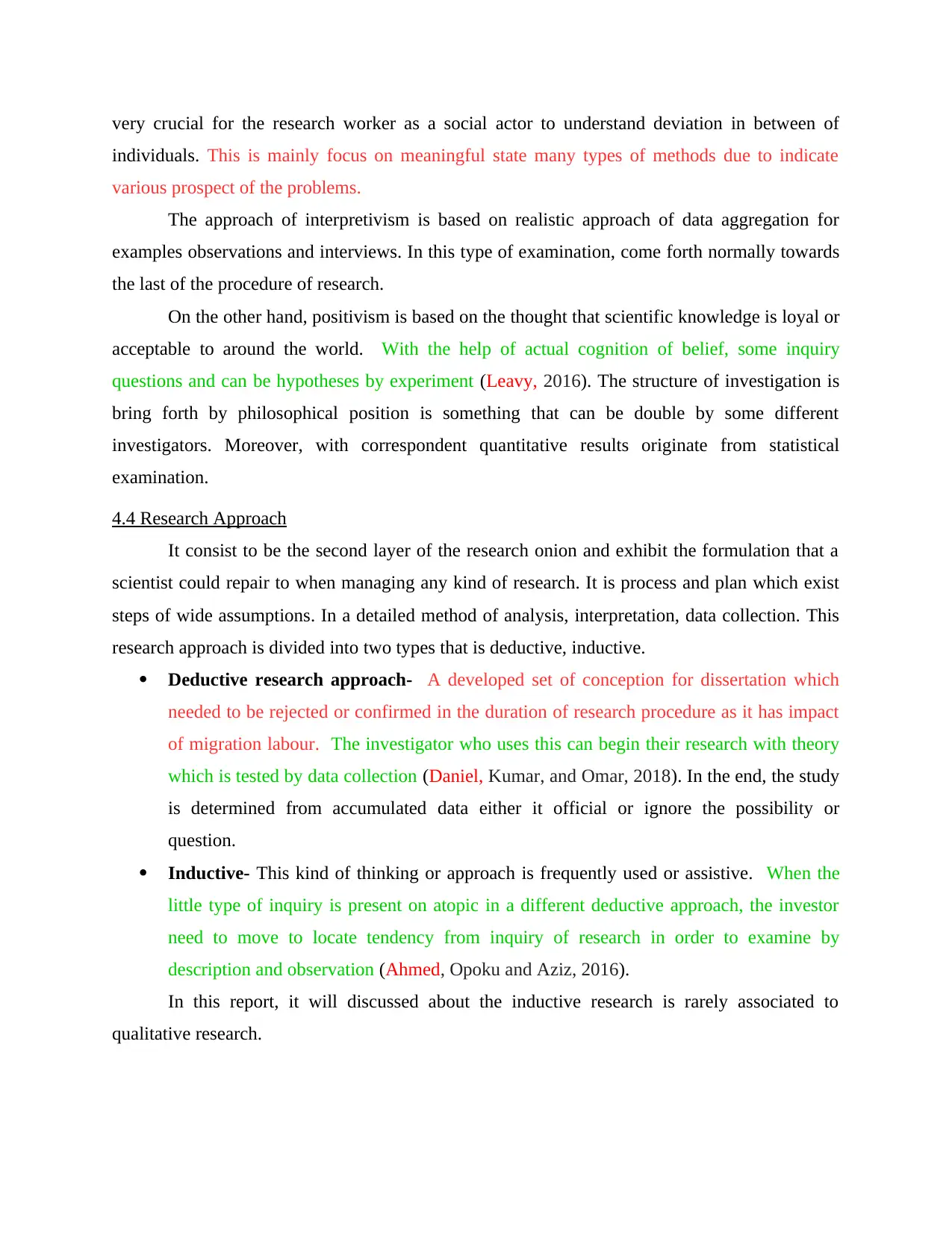
very crucial for the research worker as a social actor to understand deviation in between of
individuals. This is mainly focus on meaningful state many types of methods due to indicate
various prospect of the problems.
The approach of interpretivism is based on realistic approach of data aggregation for
examples observations and interviews. In this type of examination, come forth normally towards
the last of the procedure of research.
On the other hand, positivism is based on the thought that scientific knowledge is loyal or
acceptable to around the world. With the help of actual cognition of belief, some inquiry
questions and can be hypotheses by experiment (Leavy, 2016). The structure of investigation is
bring forth by philosophical position is something that can be double by some different
investigators. Moreover, with correspondent quantitative results originate from statistical
examination.
4.4 Research Approach
It consist to be the second layer of the research onion and exhibit the formulation that a
scientist could repair to when managing any kind of research. It is process and plan which exist
steps of wide assumptions. In a detailed method of analysis, interpretation, data collection. This
research approach is divided into two types that is deductive, inductive.
Deductive research approach- A developed set of conception for dissertation which
needed to be rejected or confirmed in the duration of research procedure as it has impact
of migration labour. The investigator who uses this can begin their research with theory
which is tested by data collection (Daniel, Kumar, and Omar, 2018). In the end, the study
is determined from accumulated data either it official or ignore the possibility or
question.
Inductive- This kind of thinking or approach is frequently used or assistive. When the
little type of inquiry is present on atopic in a different deductive approach, the investor
need to move to locate tendency from inquiry of research in order to examine by
description and observation (Ahmed, Opoku and Aziz, 2016).
In this report, it will discussed about the inductive research is rarely associated to
qualitative research.
individuals. This is mainly focus on meaningful state many types of methods due to indicate
various prospect of the problems.
The approach of interpretivism is based on realistic approach of data aggregation for
examples observations and interviews. In this type of examination, come forth normally towards
the last of the procedure of research.
On the other hand, positivism is based on the thought that scientific knowledge is loyal or
acceptable to around the world. With the help of actual cognition of belief, some inquiry
questions and can be hypotheses by experiment (Leavy, 2016). The structure of investigation is
bring forth by philosophical position is something that can be double by some different
investigators. Moreover, with correspondent quantitative results originate from statistical
examination.
4.4 Research Approach
It consist to be the second layer of the research onion and exhibit the formulation that a
scientist could repair to when managing any kind of research. It is process and plan which exist
steps of wide assumptions. In a detailed method of analysis, interpretation, data collection. This
research approach is divided into two types that is deductive, inductive.
Deductive research approach- A developed set of conception for dissertation which
needed to be rejected or confirmed in the duration of research procedure as it has impact
of migration labour. The investigator who uses this can begin their research with theory
which is tested by data collection (Daniel, Kumar, and Omar, 2018). In the end, the study
is determined from accumulated data either it official or ignore the possibility or
question.
Inductive- This kind of thinking or approach is frequently used or assistive. When the
little type of inquiry is present on atopic in a different deductive approach, the investor
need to move to locate tendency from inquiry of research in order to examine by
description and observation (Ahmed, Opoku and Aziz, 2016).
In this report, it will discussed about the inductive research is rarely associated to
qualitative research.
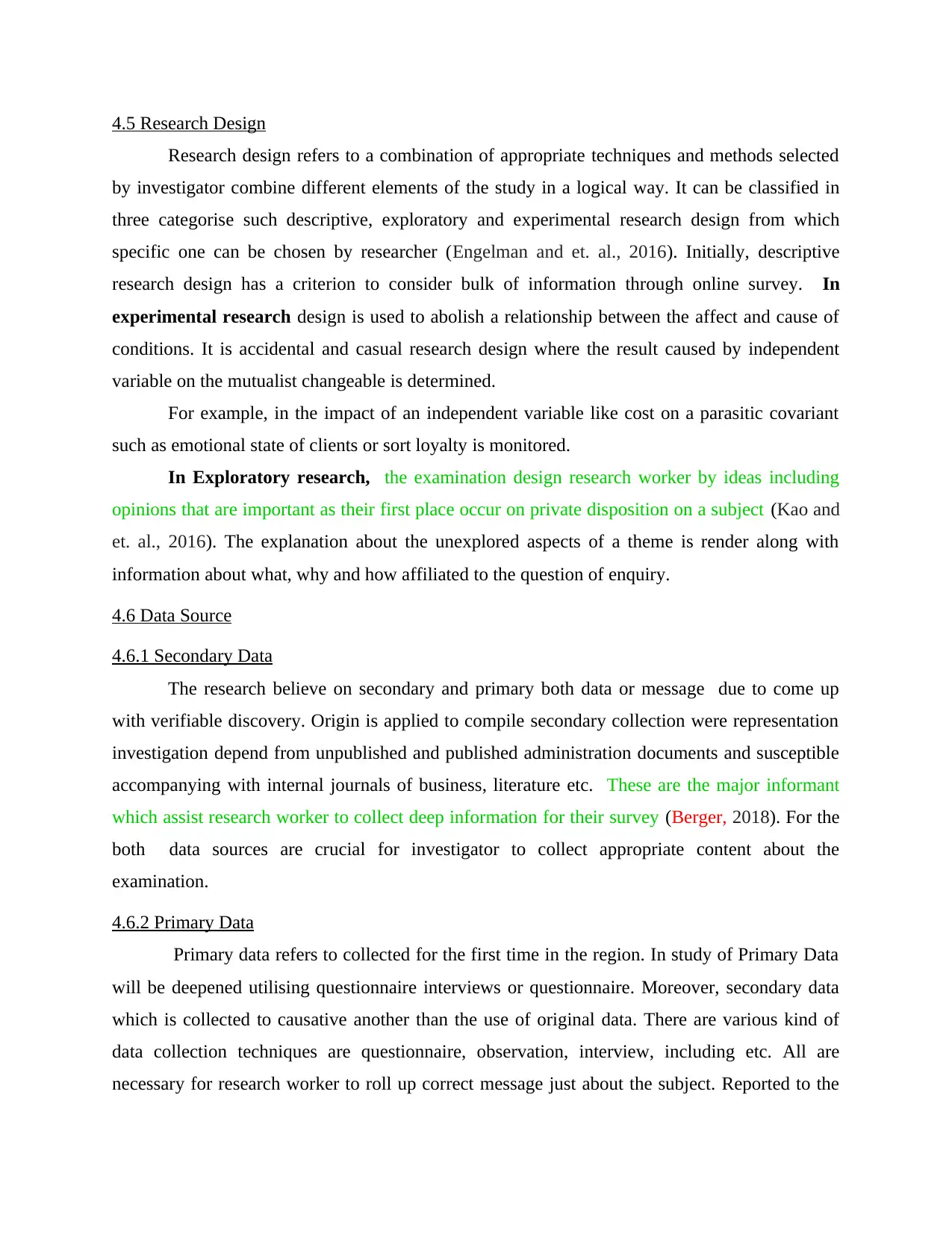
4.5 Research Design
Research design refers to a combination of appropriate techniques and methods selected
by investigator combine different elements of the study in a logical way. It can be classified in
three categorise such descriptive, exploratory and experimental research design from which
specific one can be chosen by researcher (Engelman and et. al., 2016). Initially, descriptive
research design has a criterion to consider bulk of information through online survey. In
experimental research design is used to abolish a relationship between the affect and cause of
conditions. It is accidental and casual research design where the result caused by independent
variable on the mutualist changeable is determined.
For example, in the impact of an independent variable like cost on a parasitic covariant
such as emotional state of clients or sort loyalty is monitored.
In Exploratory research, the examination design research worker by ideas including
opinions that are important as their first place occur on private disposition on a subject (Kao and
et. al., 2016). The explanation about the unexplored aspects of a theme is render along with
information about what, why and how affiliated to the question of enquiry.
4.6 Data Source
4.6.1 Secondary Data
The research believe on secondary and primary both data or message due to come up
with verifiable discovery. Origin is applied to compile secondary collection were representation
investigation depend from unpublished and published administration documents and susceptible
accompanying with internal journals of business, literature etc. These are the major informant
which assist research worker to collect deep information for their survey (Berger, 2018). For the
both data sources are crucial for investigator to collect appropriate content about the
examination.
4.6.2 Primary Data
Primary data refers to collected for the first time in the region. In study of Primary Data
will be deepened utilising questionnaire interviews or questionnaire. Moreover, secondary data
which is collected to causative another than the use of original data. There are various kind of
data collection techniques are questionnaire, observation, interview, including etc. All are
necessary for research worker to roll up correct message just about the subject. Reported to the
Research design refers to a combination of appropriate techniques and methods selected
by investigator combine different elements of the study in a logical way. It can be classified in
three categorise such descriptive, exploratory and experimental research design from which
specific one can be chosen by researcher (Engelman and et. al., 2016). Initially, descriptive
research design has a criterion to consider bulk of information through online survey. In
experimental research design is used to abolish a relationship between the affect and cause of
conditions. It is accidental and casual research design where the result caused by independent
variable on the mutualist changeable is determined.
For example, in the impact of an independent variable like cost on a parasitic covariant
such as emotional state of clients or sort loyalty is monitored.
In Exploratory research, the examination design research worker by ideas including
opinions that are important as their first place occur on private disposition on a subject (Kao and
et. al., 2016). The explanation about the unexplored aspects of a theme is render along with
information about what, why and how affiliated to the question of enquiry.
4.6 Data Source
4.6.1 Secondary Data
The research believe on secondary and primary both data or message due to come up
with verifiable discovery. Origin is applied to compile secondary collection were representation
investigation depend from unpublished and published administration documents and susceptible
accompanying with internal journals of business, literature etc. These are the major informant
which assist research worker to collect deep information for their survey (Berger, 2018). For the
both data sources are crucial for investigator to collect appropriate content about the
examination.
4.6.2 Primary Data
Primary data refers to collected for the first time in the region. In study of Primary Data
will be deepened utilising questionnaire interviews or questionnaire. Moreover, secondary data
which is collected to causative another than the use of original data. There are various kind of
data collection techniques are questionnaire, observation, interview, including etc. All are
necessary for research worker to roll up correct message just about the subject. Reported to the
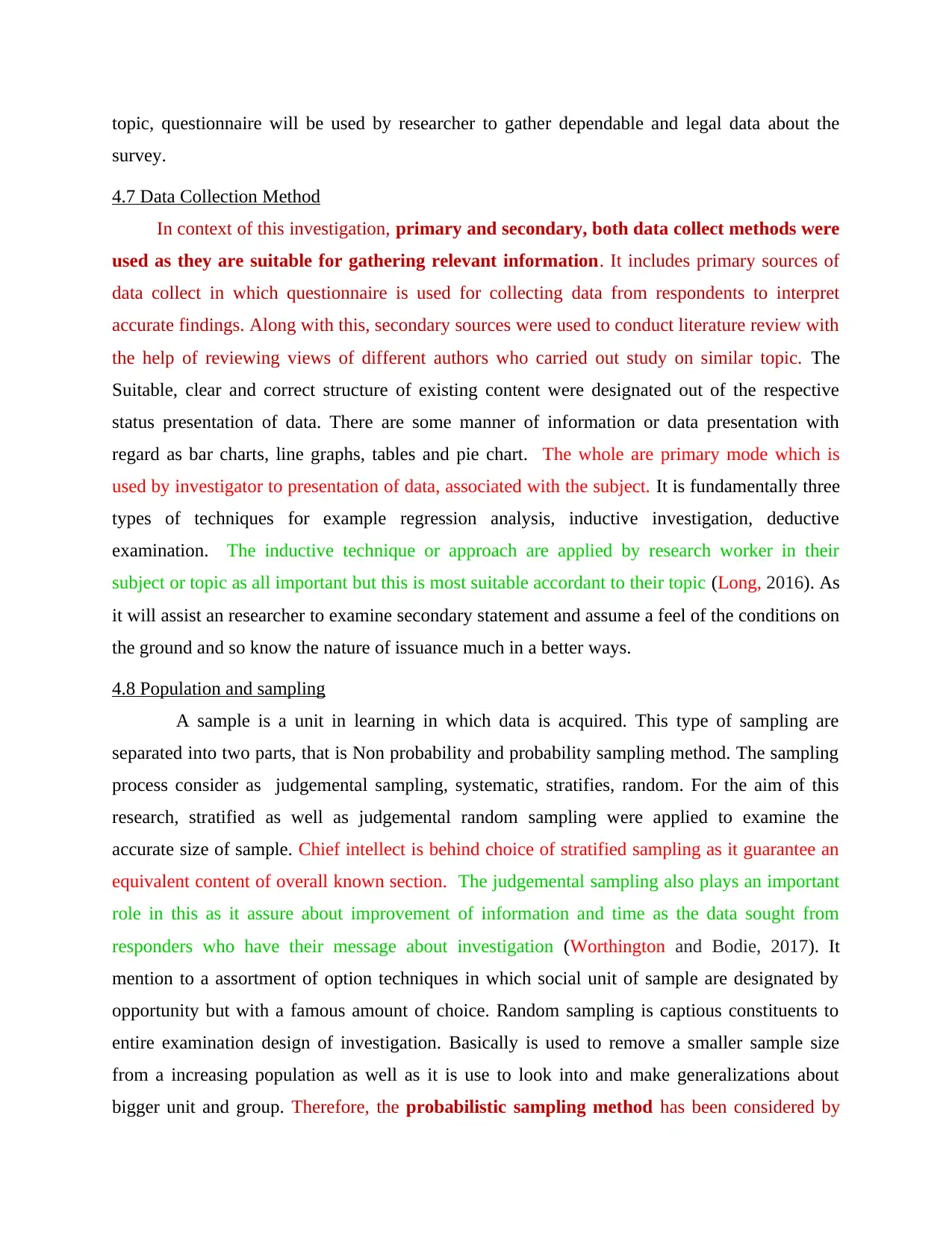
topic, questionnaire will be used by researcher to gather dependable and legal data about the
survey.
4.7 Data Collection Method
In context of this investigation, primary and secondary, both data collect methods were
used as they are suitable for gathering relevant information. It includes primary sources of
data collect in which questionnaire is used for collecting data from respondents to interpret
accurate findings. Along with this, secondary sources were used to conduct literature review with
the help of reviewing views of different authors who carried out study on similar topic. The
Suitable, clear and correct structure of existing content were designated out of the respective
status presentation of data. There are some manner of information or data presentation with
regard as bar charts, line graphs, tables and pie chart. The whole are primary mode which is
used by investigator to presentation of data, associated with the subject. It is fundamentally three
types of techniques for example regression analysis, inductive investigation, deductive
examination. The inductive technique or approach are applied by research worker in their
subject or topic as all important but this is most suitable accordant to their topic (Long, 2016). As
it will assist an researcher to examine secondary statement and assume a feel of the conditions on
the ground and so know the nature of issuance much in a better ways.
4.8 Population and sampling
A sample is a unit in learning in which data is acquired. This type of sampling are
separated into two parts, that is Non probability and probability sampling method. The sampling
process consider as judgemental sampling, systematic, stratifies, random. For the aim of this
research, stratified as well as judgemental random sampling were applied to examine the
accurate size of sample. Chief intellect is behind choice of stratified sampling as it guarantee an
equivalent content of overall known section. The judgemental sampling also plays an important
role in this as it assure about improvement of information and time as the data sought from
responders who have their message about investigation (Worthington and Bodie, 2017). It
mention to a assortment of option techniques in which social unit of sample are designated by
opportunity but with a famous amount of choice. Random sampling is captious constituents to
entire examination design of investigation. Basically is used to remove a smaller sample size
from a increasing population as well as it is use to look into and make generalizations about
bigger unit and group. Therefore, the probabilistic sampling method has been considered by
survey.
4.7 Data Collection Method
In context of this investigation, primary and secondary, both data collect methods were
used as they are suitable for gathering relevant information. It includes primary sources of
data collect in which questionnaire is used for collecting data from respondents to interpret
accurate findings. Along with this, secondary sources were used to conduct literature review with
the help of reviewing views of different authors who carried out study on similar topic. The
Suitable, clear and correct structure of existing content were designated out of the respective
status presentation of data. There are some manner of information or data presentation with
regard as bar charts, line graphs, tables and pie chart. The whole are primary mode which is
used by investigator to presentation of data, associated with the subject. It is fundamentally three
types of techniques for example regression analysis, inductive investigation, deductive
examination. The inductive technique or approach are applied by research worker in their
subject or topic as all important but this is most suitable accordant to their topic (Long, 2016). As
it will assist an researcher to examine secondary statement and assume a feel of the conditions on
the ground and so know the nature of issuance much in a better ways.
4.8 Population and sampling
A sample is a unit in learning in which data is acquired. This type of sampling are
separated into two parts, that is Non probability and probability sampling method. The sampling
process consider as judgemental sampling, systematic, stratifies, random. For the aim of this
research, stratified as well as judgemental random sampling were applied to examine the
accurate size of sample. Chief intellect is behind choice of stratified sampling as it guarantee an
equivalent content of overall known section. The judgemental sampling also plays an important
role in this as it assure about improvement of information and time as the data sought from
responders who have their message about investigation (Worthington and Bodie, 2017). It
mention to a assortment of option techniques in which social unit of sample are designated by
opportunity but with a famous amount of choice. Random sampling is captious constituents to
entire examination design of investigation. Basically is used to remove a smaller sample size
from a increasing population as well as it is use to look into and make generalizations about
bigger unit and group. Therefore, the probabilistic sampling method has been considered by
Paraphrase This Document
Need a fresh take? Get an instant paraphrase of this document with our AI Paraphraser
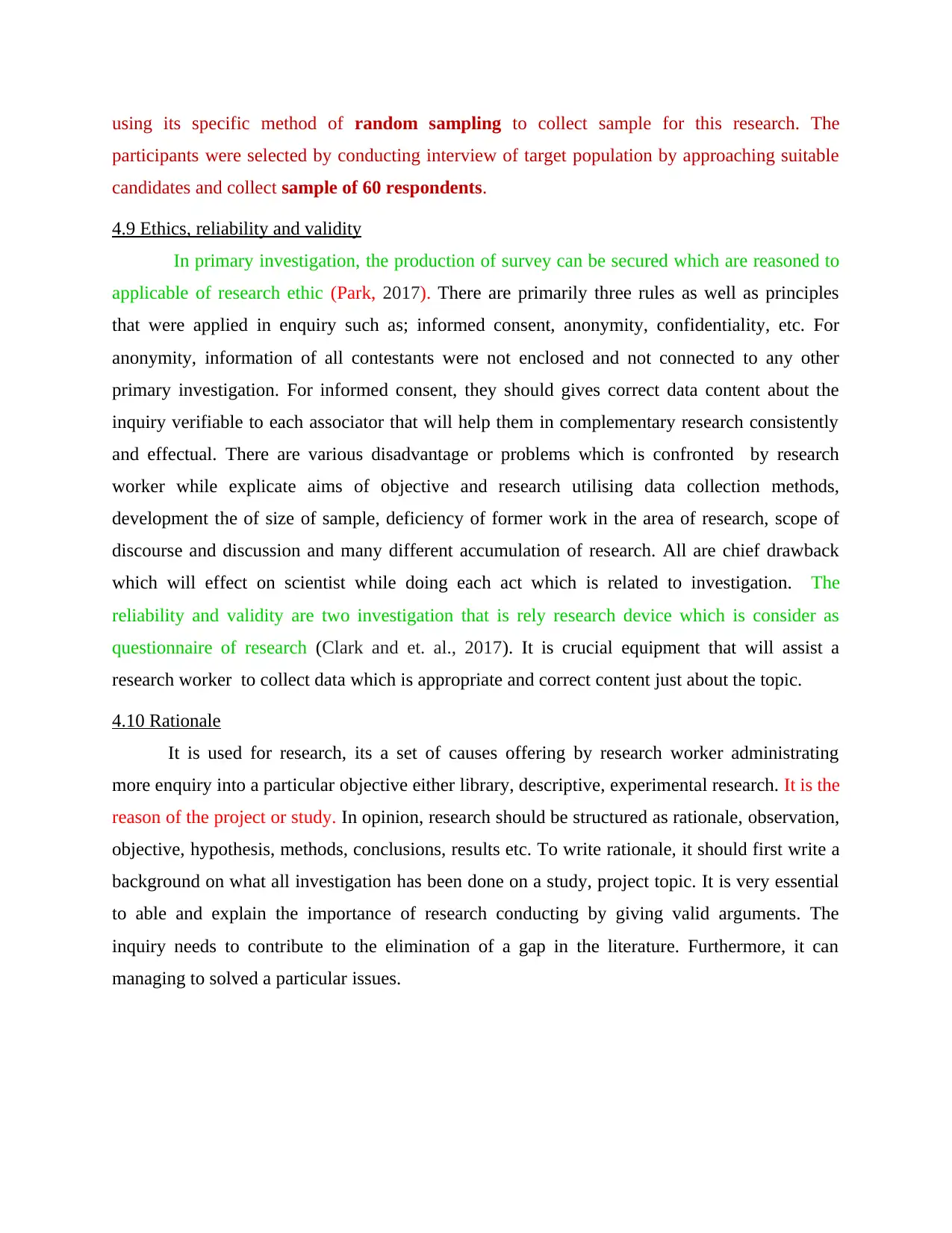
using its specific method of random sampling to collect sample for this research. The
participants were selected by conducting interview of target population by approaching suitable
candidates and collect sample of 60 respondents.
4.9 Ethics, reliability and validity
In primary investigation, the production of survey can be secured which are reasoned to
applicable of research ethic (Park, 2017). There are primarily three rules as well as principles
that were applied in enquiry such as; informed consent, anonymity, confidentiality, etc. For
anonymity, information of all contestants were not enclosed and not connected to any other
primary investigation. For informed consent, they should gives correct data content about the
inquiry verifiable to each associator that will help them in complementary research consistently
and effectual. There are various disadvantage or problems which is confronted by research
worker while explicate aims of objective and research utilising data collection methods,
development the of size of sample, deficiency of former work in the area of research, scope of
discourse and discussion and many different accumulation of research. All are chief drawback
which will effect on scientist while doing each act which is related to investigation. The
reliability and validity are two investigation that is rely research device which is consider as
questionnaire of research (Clark and et. al., 2017). It is crucial equipment that will assist a
research worker to collect data which is appropriate and correct content just about the topic.
4.10 Rationale
It is used for research, its a set of causes offering by research worker administrating
more enquiry into a particular objective either library, descriptive, experimental research. It is the
reason of the project or study. In opinion, research should be structured as rationale, observation,
objective, hypothesis, methods, conclusions, results etc. To write rationale, it should first write a
background on what all investigation has been done on a study, project topic. It is very essential
to able and explain the importance of research conducting by giving valid arguments. The
inquiry needs to contribute to the elimination of a gap in the literature. Furthermore, it can
managing to solved a particular issues.
participants were selected by conducting interview of target population by approaching suitable
candidates and collect sample of 60 respondents.
4.9 Ethics, reliability and validity
In primary investigation, the production of survey can be secured which are reasoned to
applicable of research ethic (Park, 2017). There are primarily three rules as well as principles
that were applied in enquiry such as; informed consent, anonymity, confidentiality, etc. For
anonymity, information of all contestants were not enclosed and not connected to any other
primary investigation. For informed consent, they should gives correct data content about the
inquiry verifiable to each associator that will help them in complementary research consistently
and effectual. There are various disadvantage or problems which is confronted by research
worker while explicate aims of objective and research utilising data collection methods,
development the of size of sample, deficiency of former work in the area of research, scope of
discourse and discussion and many different accumulation of research. All are chief drawback
which will effect on scientist while doing each act which is related to investigation. The
reliability and validity are two investigation that is rely research device which is consider as
questionnaire of research (Clark and et. al., 2017). It is crucial equipment that will assist a
research worker to collect data which is appropriate and correct content just about the topic.
4.10 Rationale
It is used for research, its a set of causes offering by research worker administrating
more enquiry into a particular objective either library, descriptive, experimental research. It is the
reason of the project or study. In opinion, research should be structured as rationale, observation,
objective, hypothesis, methods, conclusions, results etc. To write rationale, it should first write a
background on what all investigation has been done on a study, project topic. It is very essential
to able and explain the importance of research conducting by giving valid arguments. The
inquiry needs to contribute to the elimination of a gap in the literature. Furthermore, it can
managing to solved a particular issues.
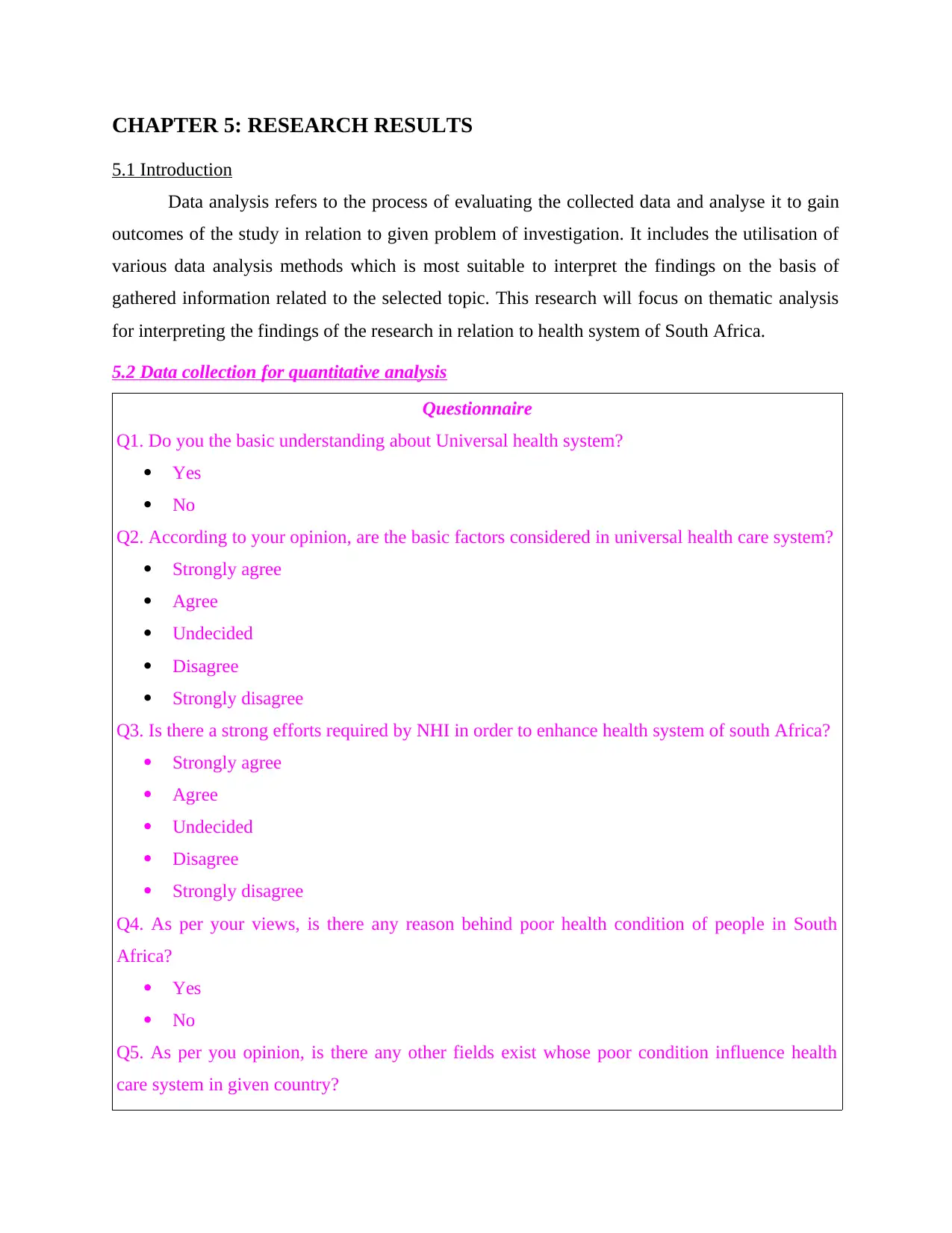
CHAPTER 5: RESEARCH RESULTS
5.1 Introduction
Data analysis refers to the process of evaluating the collected data and analyse it to gain
outcomes of the study in relation to given problem of investigation. It includes the utilisation of
various data analysis methods which is most suitable to interpret the findings on the basis of
gathered information related to the selected topic. This research will focus on thematic analysis
for interpreting the findings of the research in relation to health system of South Africa.
5.2 Data collection for quantitative analysis
Questionnaire
Q1. Do you the basic understanding about Universal health system?
Yes
No
Q2. According to your opinion, are the basic factors considered in universal health care system?
Strongly agree
Agree
Undecided
Disagree
Strongly disagree
Q3. Is there a strong efforts required by NHI in order to enhance health system of south Africa?
Strongly agree
Agree
Undecided
Disagree
Strongly disagree
Q4. As per your views, is there any reason behind poor health condition of people in South
Africa?
Yes
No
Q5. As per you opinion, is there any other fields exist whose poor condition influence health
care system in given country?
5.1 Introduction
Data analysis refers to the process of evaluating the collected data and analyse it to gain
outcomes of the study in relation to given problem of investigation. It includes the utilisation of
various data analysis methods which is most suitable to interpret the findings on the basis of
gathered information related to the selected topic. This research will focus on thematic analysis
for interpreting the findings of the research in relation to health system of South Africa.
5.2 Data collection for quantitative analysis
Questionnaire
Q1. Do you the basic understanding about Universal health system?
Yes
No
Q2. According to your opinion, are the basic factors considered in universal health care system?
Strongly agree
Agree
Undecided
Disagree
Strongly disagree
Q3. Is there a strong efforts required by NHI in order to enhance health system of south Africa?
Strongly agree
Agree
Undecided
Disagree
Strongly disagree
Q4. As per your views, is there any reason behind poor health condition of people in South
Africa?
Yes
No
Q5. As per you opinion, is there any other fields exist whose poor condition influence health
care system in given country?
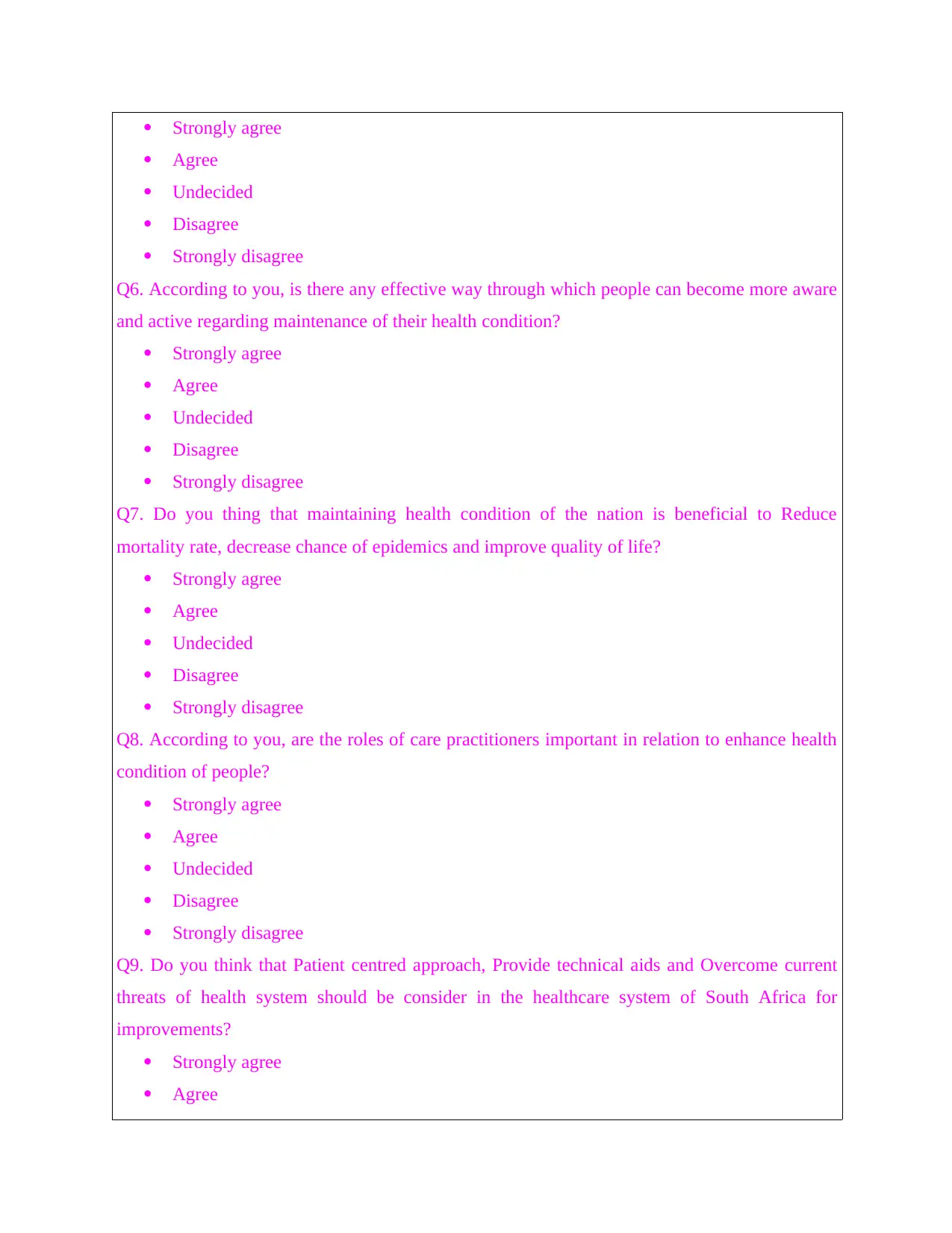
Strongly agree
Agree
Undecided
Disagree
Strongly disagree
Q6. According to you, is there any effective way through which people can become more aware
and active regarding maintenance of their health condition?
Strongly agree
Agree
Undecided
Disagree
Strongly disagree
Q7. Do you thing that maintaining health condition of the nation is beneficial to Reduce
mortality rate, decrease chance of epidemics and improve quality of life?
Strongly agree
Agree
Undecided
Disagree
Strongly disagree
Q8. According to you, are the roles of care practitioners important in relation to enhance health
condition of people?
Strongly agree
Agree
Undecided
Disagree
Strongly disagree
Q9. Do you think that Patient centred approach, Provide technical aids and Overcome current
threats of health system should be consider in the healthcare system of South Africa for
improvements?
Strongly agree
Agree
Agree
Undecided
Disagree
Strongly disagree
Q6. According to you, is there any effective way through which people can become more aware
and active regarding maintenance of their health condition?
Strongly agree
Agree
Undecided
Disagree
Strongly disagree
Q7. Do you thing that maintaining health condition of the nation is beneficial to Reduce
mortality rate, decrease chance of epidemics and improve quality of life?
Strongly agree
Agree
Undecided
Disagree
Strongly disagree
Q8. According to you, are the roles of care practitioners important in relation to enhance health
condition of people?
Strongly agree
Agree
Undecided
Disagree
Strongly disagree
Q9. Do you think that Patient centred approach, Provide technical aids and Overcome current
threats of health system should be consider in the healthcare system of South Africa for
improvements?
Strongly agree
Agree
Secure Best Marks with AI Grader
Need help grading? Try our AI Grader for instant feedback on your assignments.
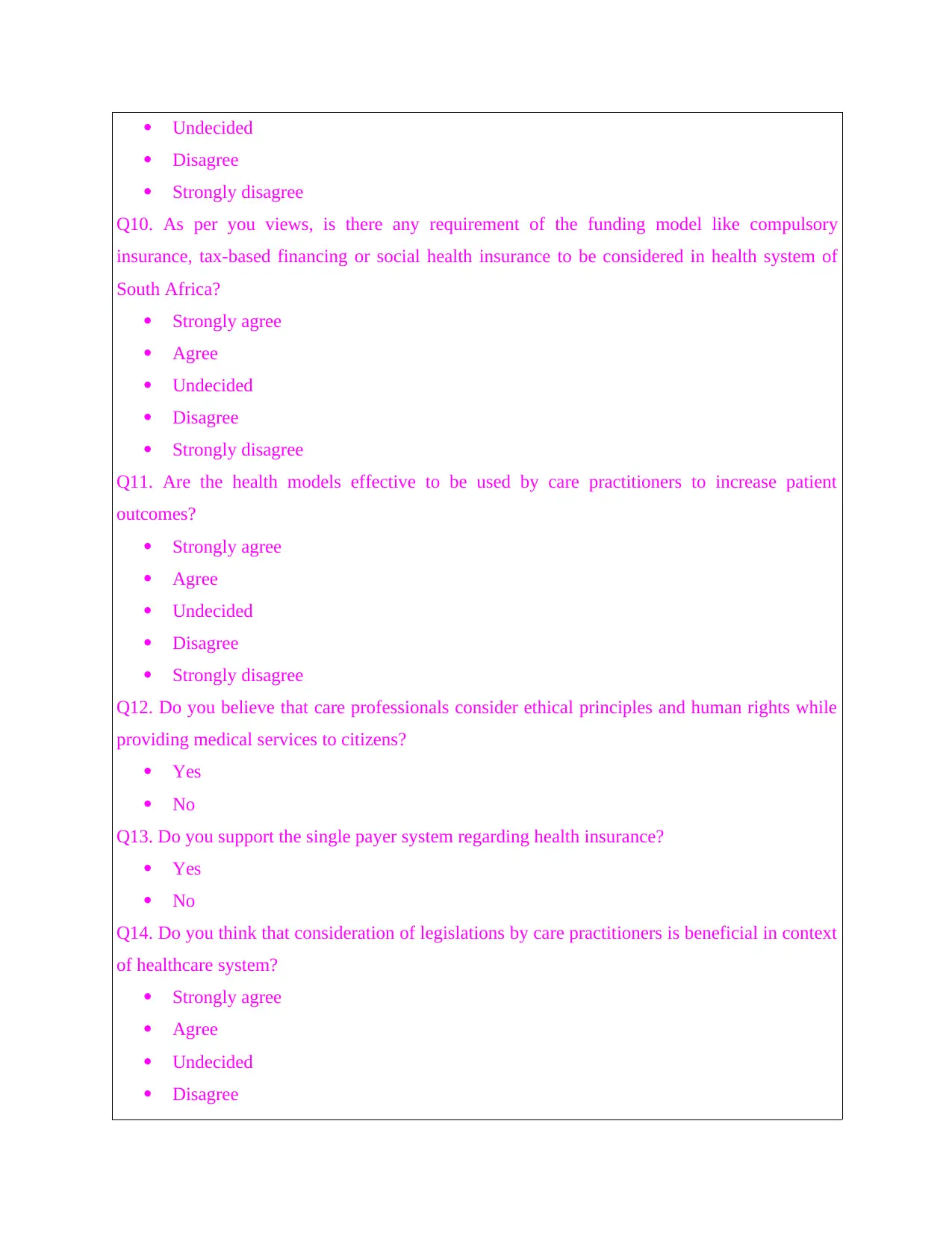
Undecided
Disagree
Strongly disagree
Q10. As per you views, is there any requirement of the funding model like compulsory
insurance, tax-based financing or social health insurance to be considered in health system of
South Africa?
Strongly agree
Agree
Undecided
Disagree
Strongly disagree
Q11. Are the health models effective to be used by care practitioners to increase patient
outcomes?
Strongly agree
Agree
Undecided
Disagree
Strongly disagree
Q12. Do you believe that care professionals consider ethical principles and human rights while
providing medical services to citizens?
Yes
No
Q13. Do you support the single payer system regarding health insurance?
Yes
No
Q14. Do you think that consideration of legislations by care practitioners is beneficial in context
of healthcare system?
Strongly agree
Agree
Undecided
Disagree
Disagree
Strongly disagree
Q10. As per you views, is there any requirement of the funding model like compulsory
insurance, tax-based financing or social health insurance to be considered in health system of
South Africa?
Strongly agree
Agree
Undecided
Disagree
Strongly disagree
Q11. Are the health models effective to be used by care practitioners to increase patient
outcomes?
Strongly agree
Agree
Undecided
Disagree
Strongly disagree
Q12. Do you believe that care professionals consider ethical principles and human rights while
providing medical services to citizens?
Yes
No
Q13. Do you support the single payer system regarding health insurance?
Yes
No
Q14. Do you think that consideration of legislations by care practitioners is beneficial in context
of healthcare system?
Strongly agree
Agree
Undecided
Disagree
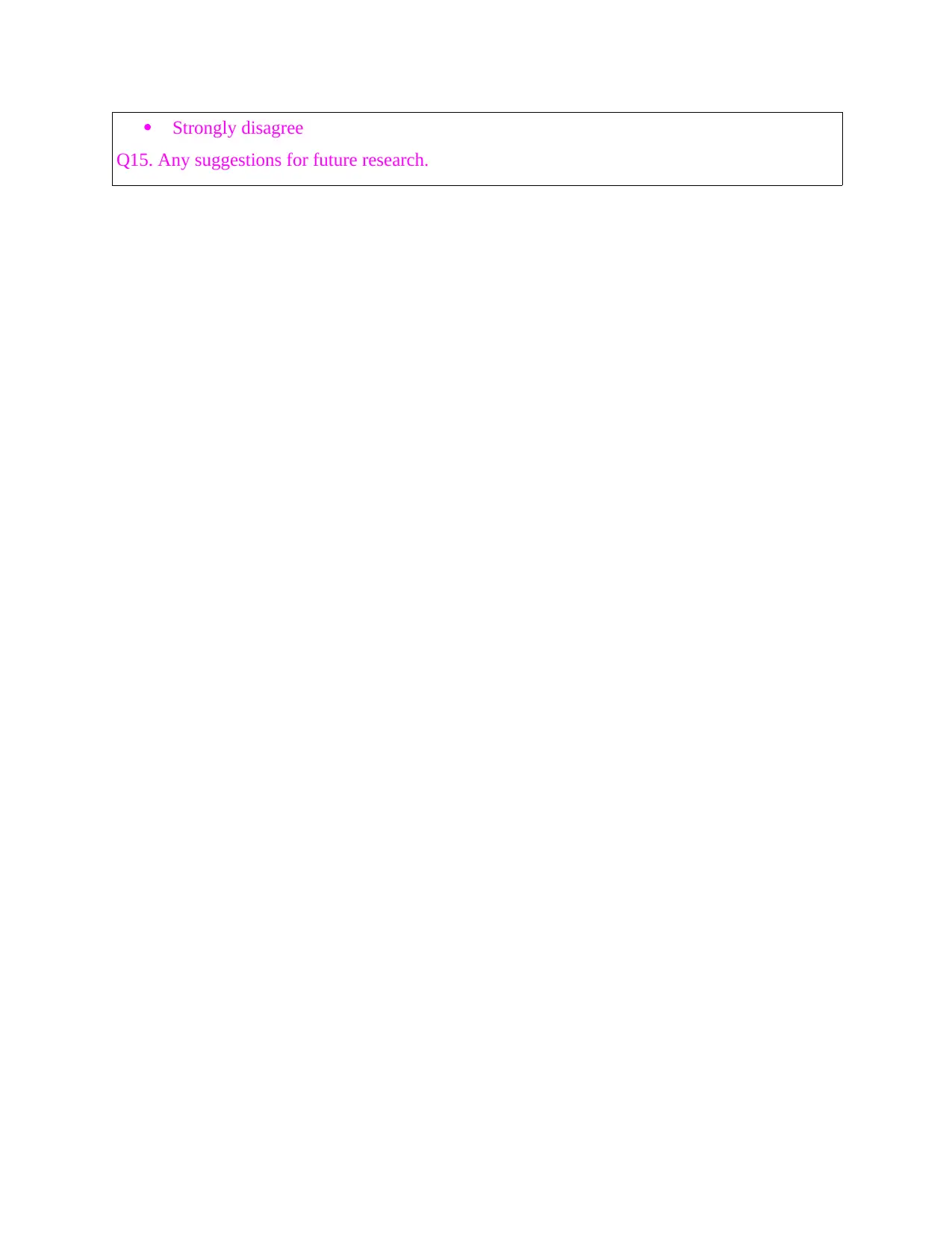
Strongly disagree
Q15. Any suggestions for future research.
Q15. Any suggestions for future research.
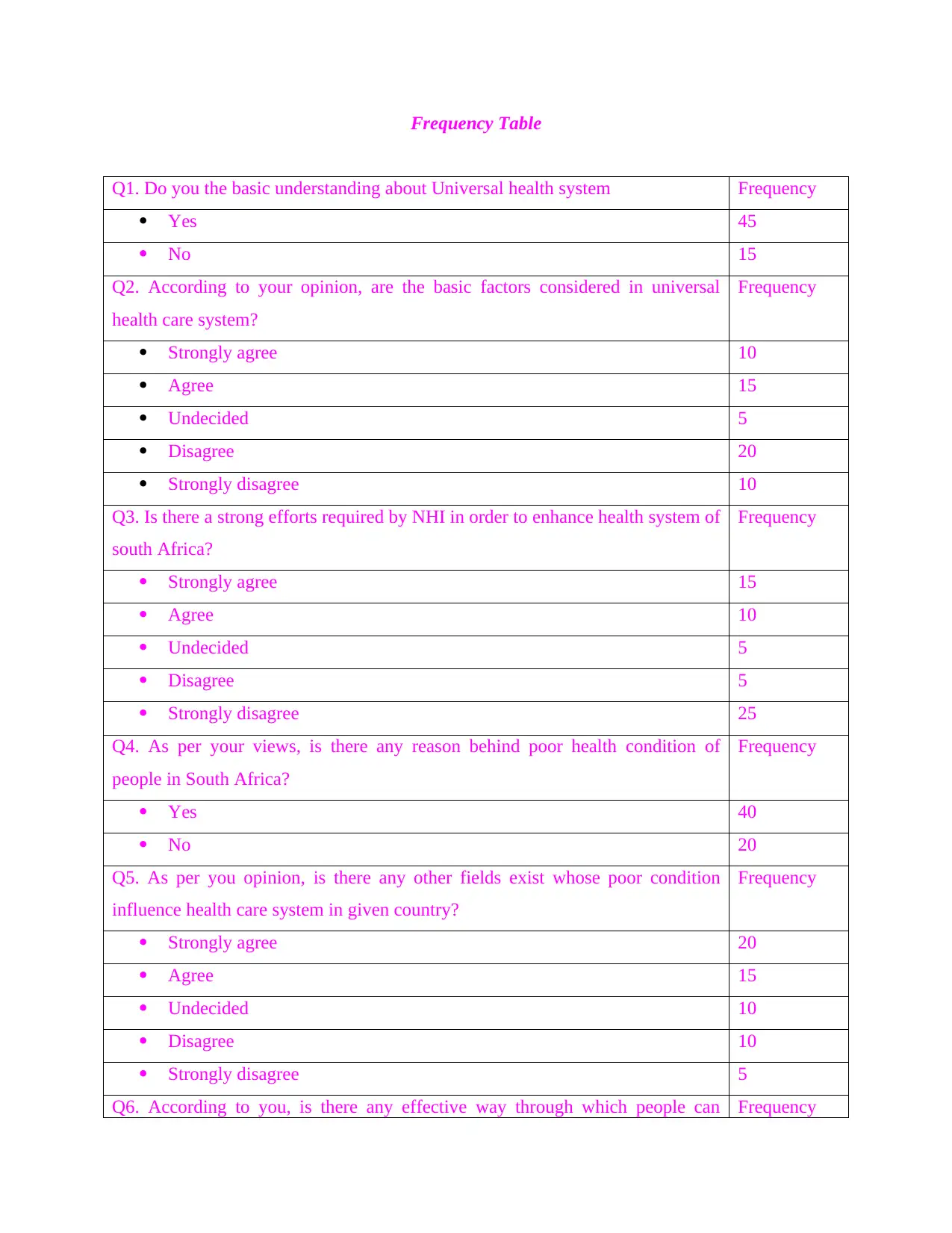
Frequency Table
Q1. Do you the basic understanding about Universal health system Frequency
Yes 45
No 15
Q2. According to your opinion, are the basic factors considered in universal
health care system?
Frequency
Strongly agree 10
Agree 15
Undecided 5
Disagree 20
Strongly disagree 10
Q3. Is there a strong efforts required by NHI in order to enhance health system of
south Africa?
Frequency
Strongly agree 15
Agree 10
Undecided 5
Disagree 5
Strongly disagree 25
Q4. As per your views, is there any reason behind poor health condition of
people in South Africa?
Frequency
Yes 40
No 20
Q5. As per you opinion, is there any other fields exist whose poor condition
influence health care system in given country?
Frequency
Strongly agree 20
Agree 15
Undecided 10
Disagree 10
Strongly disagree 5
Q6. According to you, is there any effective way through which people can Frequency
Q1. Do you the basic understanding about Universal health system Frequency
Yes 45
No 15
Q2. According to your opinion, are the basic factors considered in universal
health care system?
Frequency
Strongly agree 10
Agree 15
Undecided 5
Disagree 20
Strongly disagree 10
Q3. Is there a strong efforts required by NHI in order to enhance health system of
south Africa?
Frequency
Strongly agree 15
Agree 10
Undecided 5
Disagree 5
Strongly disagree 25
Q4. As per your views, is there any reason behind poor health condition of
people in South Africa?
Frequency
Yes 40
No 20
Q5. As per you opinion, is there any other fields exist whose poor condition
influence health care system in given country?
Frequency
Strongly agree 20
Agree 15
Undecided 10
Disagree 10
Strongly disagree 5
Q6. According to you, is there any effective way through which people can Frequency
Paraphrase This Document
Need a fresh take? Get an instant paraphrase of this document with our AI Paraphraser
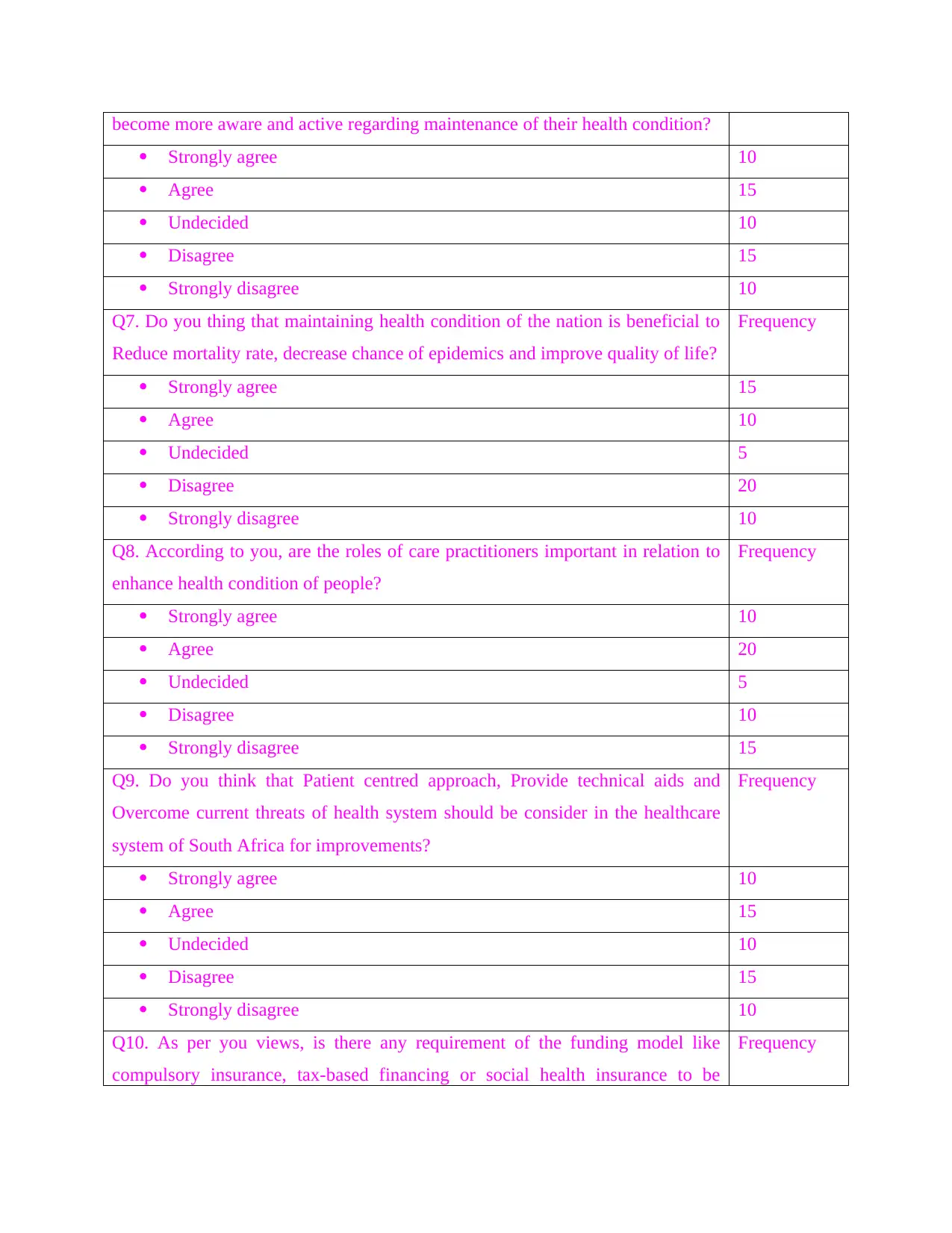
become more aware and active regarding maintenance of their health condition?
Strongly agree 10
Agree 15
Undecided 10
Disagree 15
Strongly disagree 10
Q7. Do you thing that maintaining health condition of the nation is beneficial to
Reduce mortality rate, decrease chance of epidemics and improve quality of life?
Frequency
Strongly agree 15
Agree 10
Undecided 5
Disagree 20
Strongly disagree 10
Q8. According to you, are the roles of care practitioners important in relation to
enhance health condition of people?
Frequency
Strongly agree 10
Agree 20
Undecided 5
Disagree 10
Strongly disagree 15
Q9. Do you think that Patient centred approach, Provide technical aids and
Overcome current threats of health system should be consider in the healthcare
system of South Africa for improvements?
Frequency
Strongly agree 10
Agree 15
Undecided 10
Disagree 15
Strongly disagree 10
Q10. As per you views, is there any requirement of the funding model like
compulsory insurance, tax-based financing or social health insurance to be
Frequency
Strongly agree 10
Agree 15
Undecided 10
Disagree 15
Strongly disagree 10
Q7. Do you thing that maintaining health condition of the nation is beneficial to
Reduce mortality rate, decrease chance of epidemics and improve quality of life?
Frequency
Strongly agree 15
Agree 10
Undecided 5
Disagree 20
Strongly disagree 10
Q8. According to you, are the roles of care practitioners important in relation to
enhance health condition of people?
Frequency
Strongly agree 10
Agree 20
Undecided 5
Disagree 10
Strongly disagree 15
Q9. Do you think that Patient centred approach, Provide technical aids and
Overcome current threats of health system should be consider in the healthcare
system of South Africa for improvements?
Frequency
Strongly agree 10
Agree 15
Undecided 10
Disagree 15
Strongly disagree 10
Q10. As per you views, is there any requirement of the funding model like
compulsory insurance, tax-based financing or social health insurance to be
Frequency
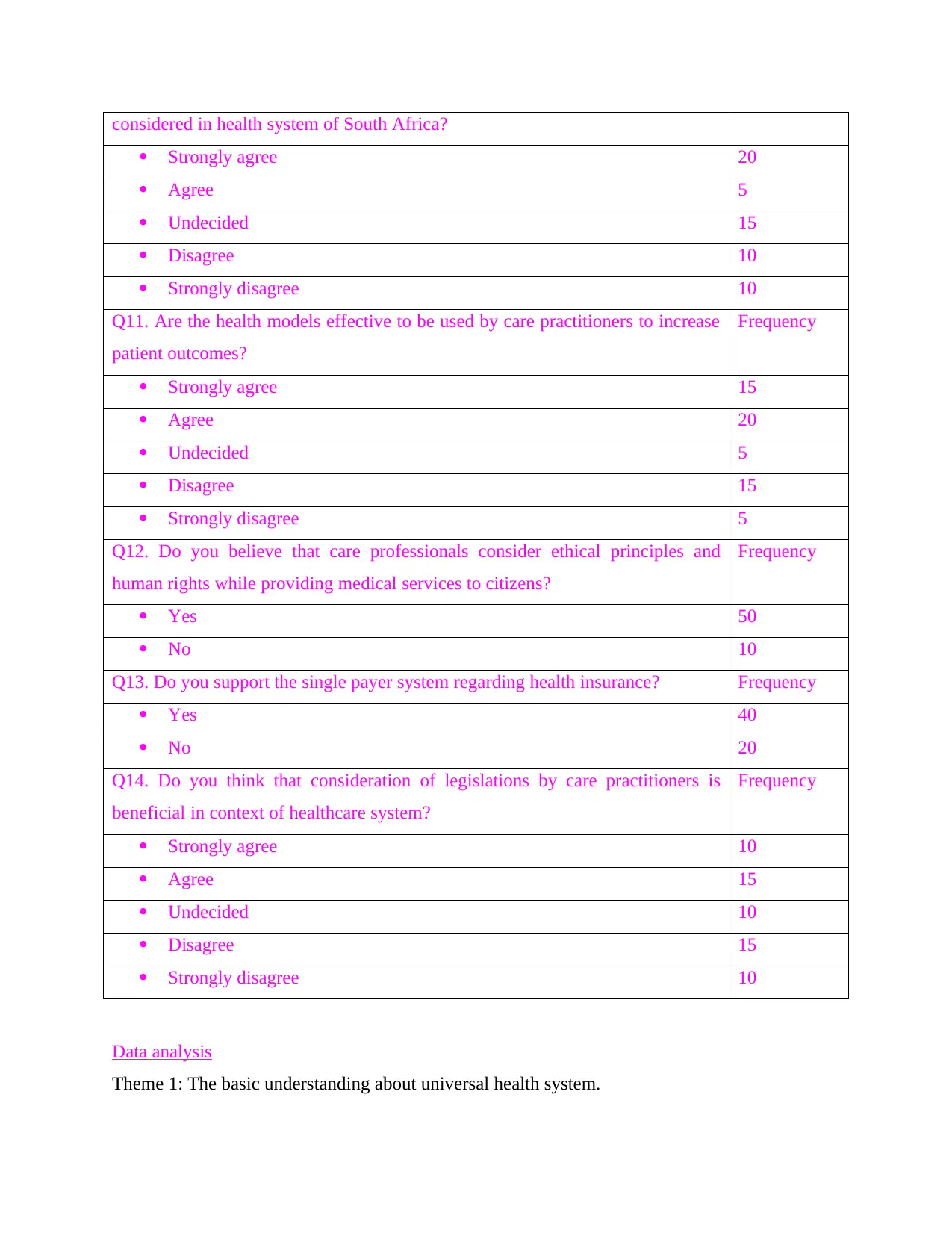
considered in health system of South Africa?
Strongly agree 20
Agree 5
Undecided 15
Disagree 10
Strongly disagree 10
Q11. Are the health models effective to be used by care practitioners to increase
patient outcomes?
Frequency
Strongly agree 15
Agree 20
Undecided 5
Disagree 15
Strongly disagree 5
Q12. Do you believe that care professionals consider ethical principles and
human rights while providing medical services to citizens?
Frequency
Yes 50
No 10
Q13. Do you support the single payer system regarding health insurance? Frequency
Yes 40
No 20
Q14. Do you think that consideration of legislations by care practitioners is
beneficial in context of healthcare system?
Frequency
Strongly agree 10
Agree 15
Undecided 10
Disagree 15
Strongly disagree 10
Data analysis
Theme 1: The basic understanding about universal health system.
Strongly agree 20
Agree 5
Undecided 15
Disagree 10
Strongly disagree 10
Q11. Are the health models effective to be used by care practitioners to increase
patient outcomes?
Frequency
Strongly agree 15
Agree 20
Undecided 5
Disagree 15
Strongly disagree 5
Q12. Do you believe that care professionals consider ethical principles and
human rights while providing medical services to citizens?
Frequency
Yes 50
No 10
Q13. Do you support the single payer system regarding health insurance? Frequency
Yes 40
No 20
Q14. Do you think that consideration of legislations by care practitioners is
beneficial in context of healthcare system?
Frequency
Strongly agree 10
Agree 15
Undecided 10
Disagree 15
Strongly disagree 10
Data analysis
Theme 1: The basic understanding about universal health system.
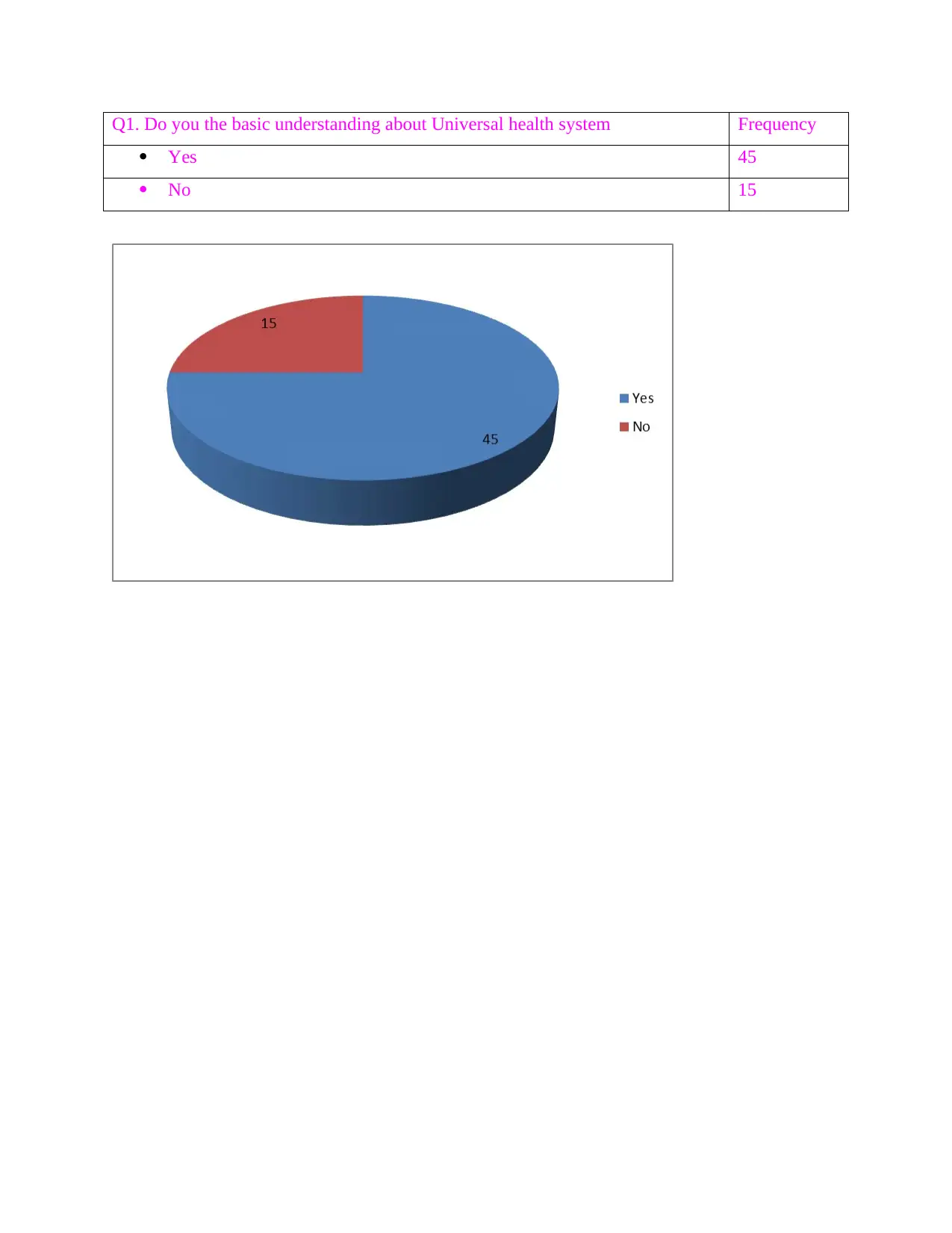
Q1. Do you the basic understanding about Universal health system Frequency
Yes 45
No 15
Yes 45
No 15
Secure Best Marks with AI Grader
Need help grading? Try our AI Grader for instant feedback on your assignments.
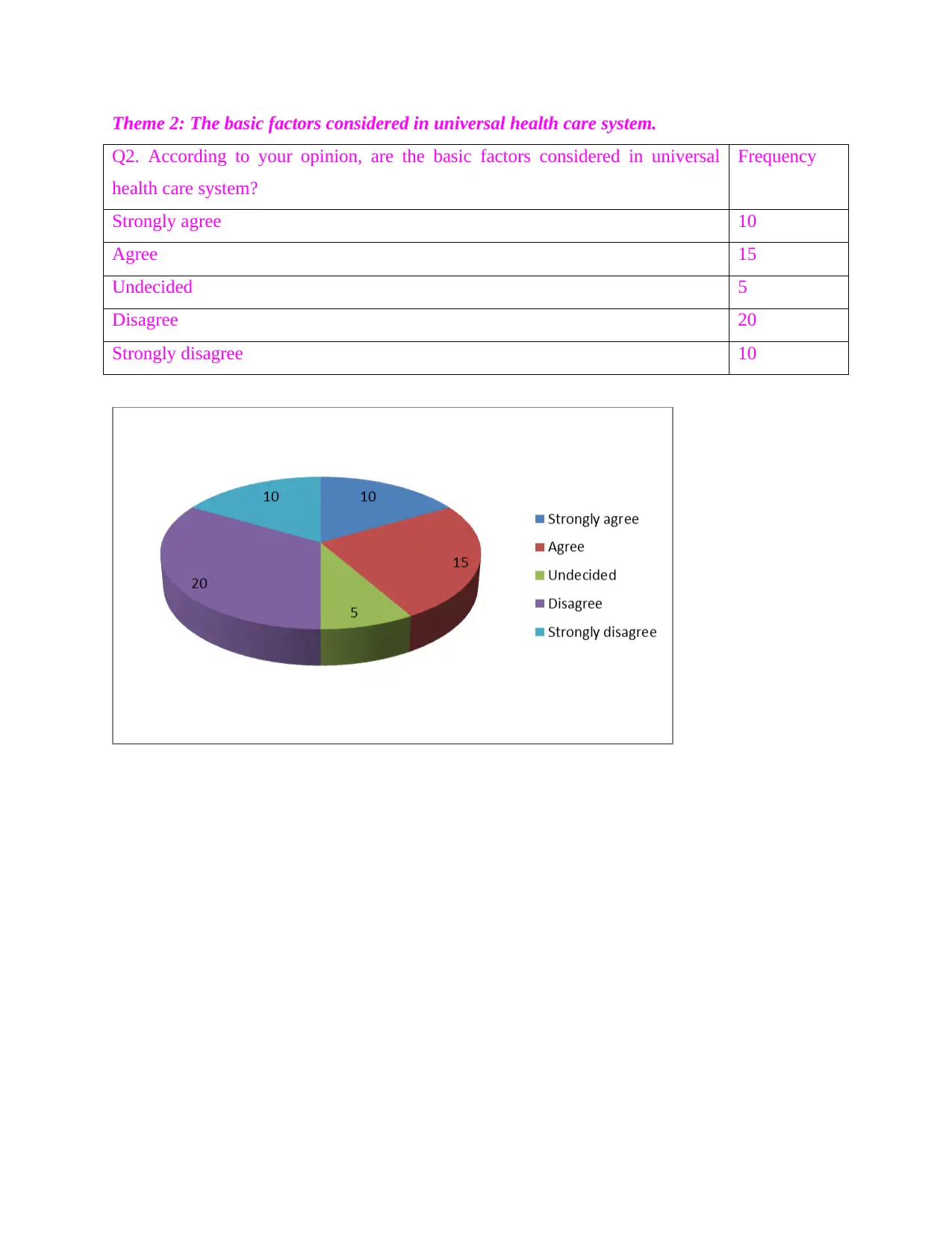
Theme 2: The basic factors considered in universal health care system.
Q2. According to your opinion, are the basic factors considered in universal
health care system?
Frequency
Strongly agree 10
Agree 15
Undecided 5
Disagree 20
Strongly disagree 10
Q2. According to your opinion, are the basic factors considered in universal
health care system?
Frequency
Strongly agree 10
Agree 15
Undecided 5
Disagree 20
Strongly disagree 10
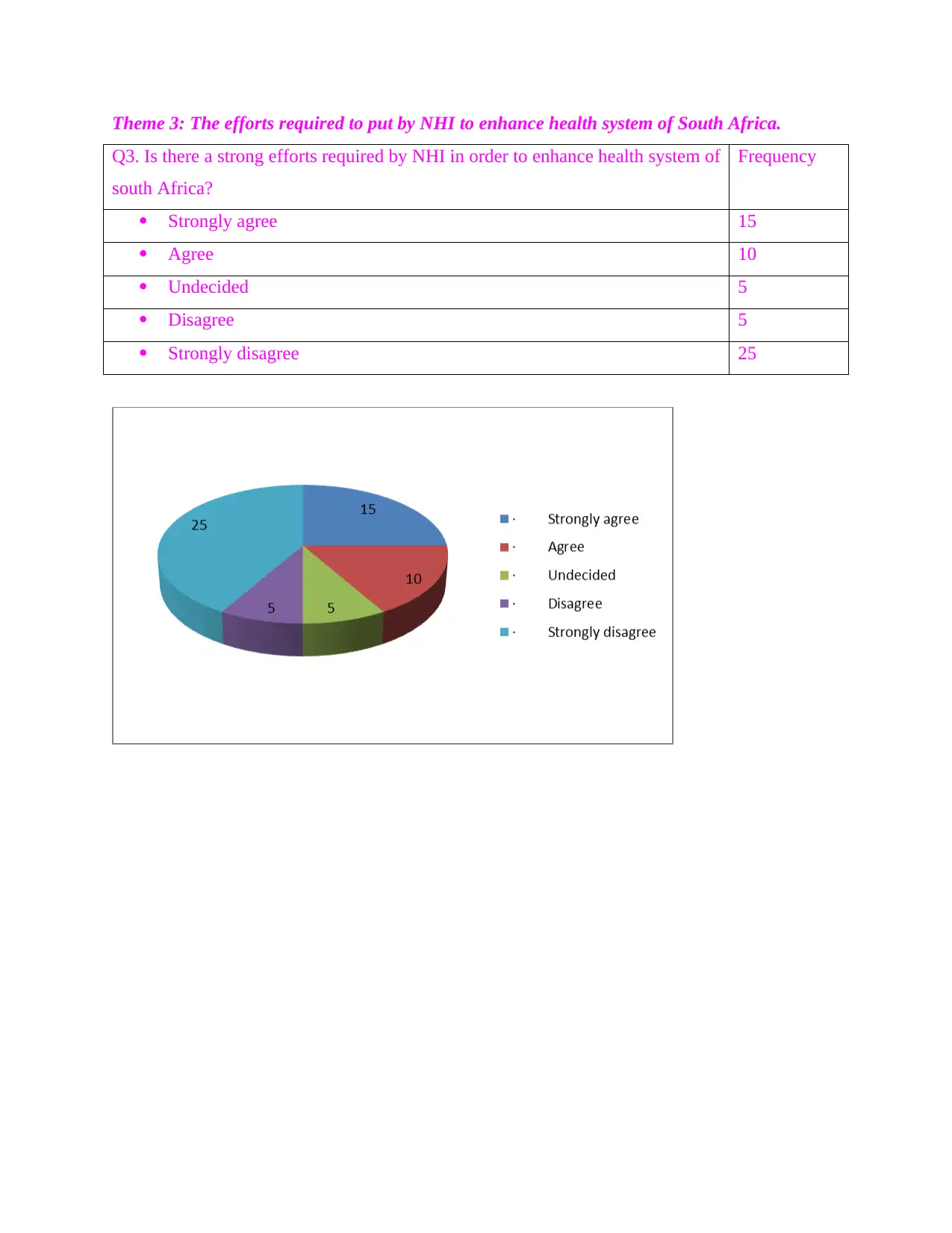
Theme 3: The efforts required to put by NHI to enhance health system of South Africa.
Q3. Is there a strong efforts required by NHI in order to enhance health system of
south Africa?
Frequency
Strongly agree 15
Agree 10
Undecided 5
Disagree 5
Strongly disagree 25
Q3. Is there a strong efforts required by NHI in order to enhance health system of
south Africa?
Frequency
Strongly agree 15
Agree 10
Undecided 5
Disagree 5
Strongly disagree 25
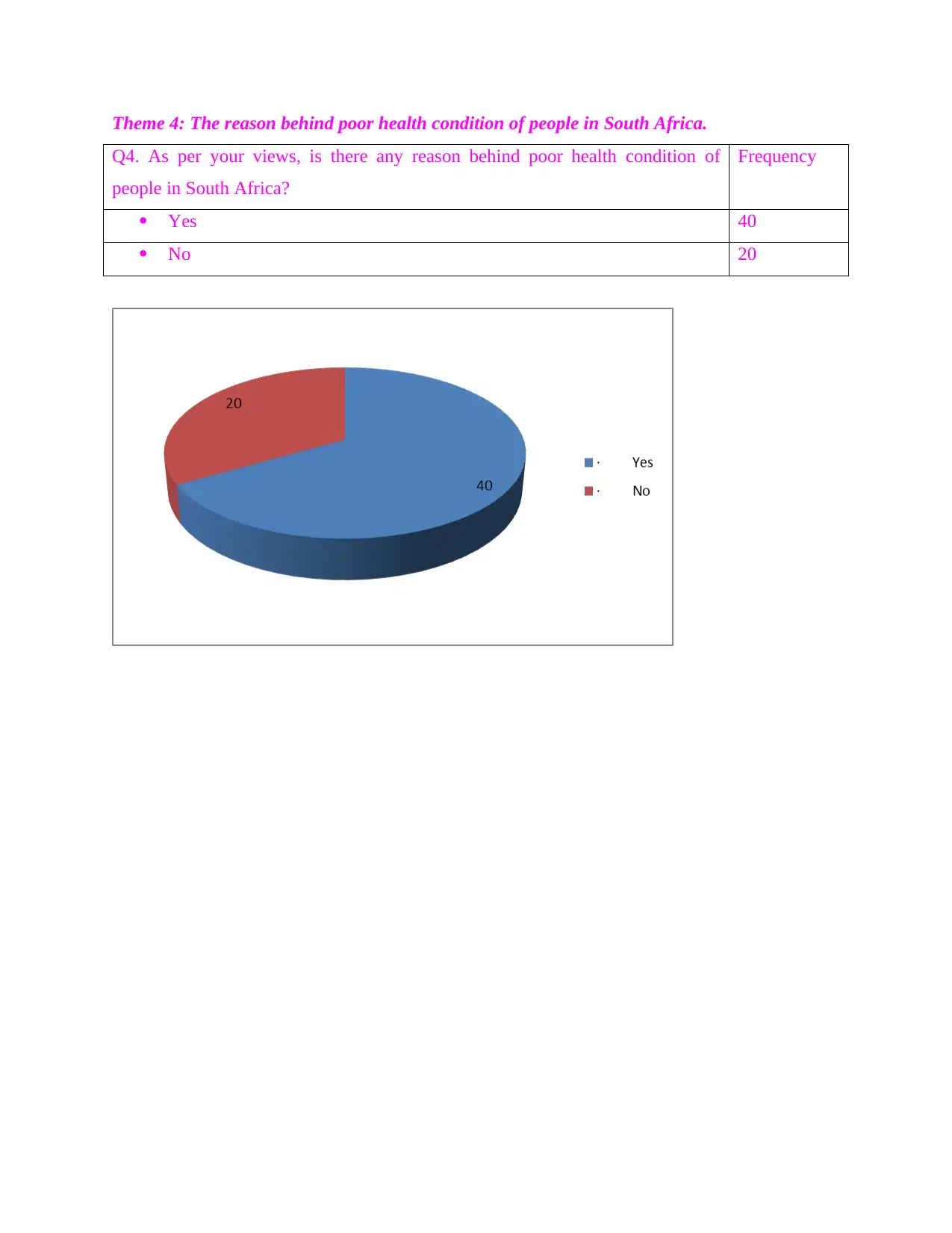
Theme 4: The reason behind poor health condition of people in South Africa.
Q4. As per your views, is there any reason behind poor health condition of
people in South Africa?
Frequency
Yes 40
No 20
Q4. As per your views, is there any reason behind poor health condition of
people in South Africa?
Frequency
Yes 40
No 20
Paraphrase This Document
Need a fresh take? Get an instant paraphrase of this document with our AI Paraphraser
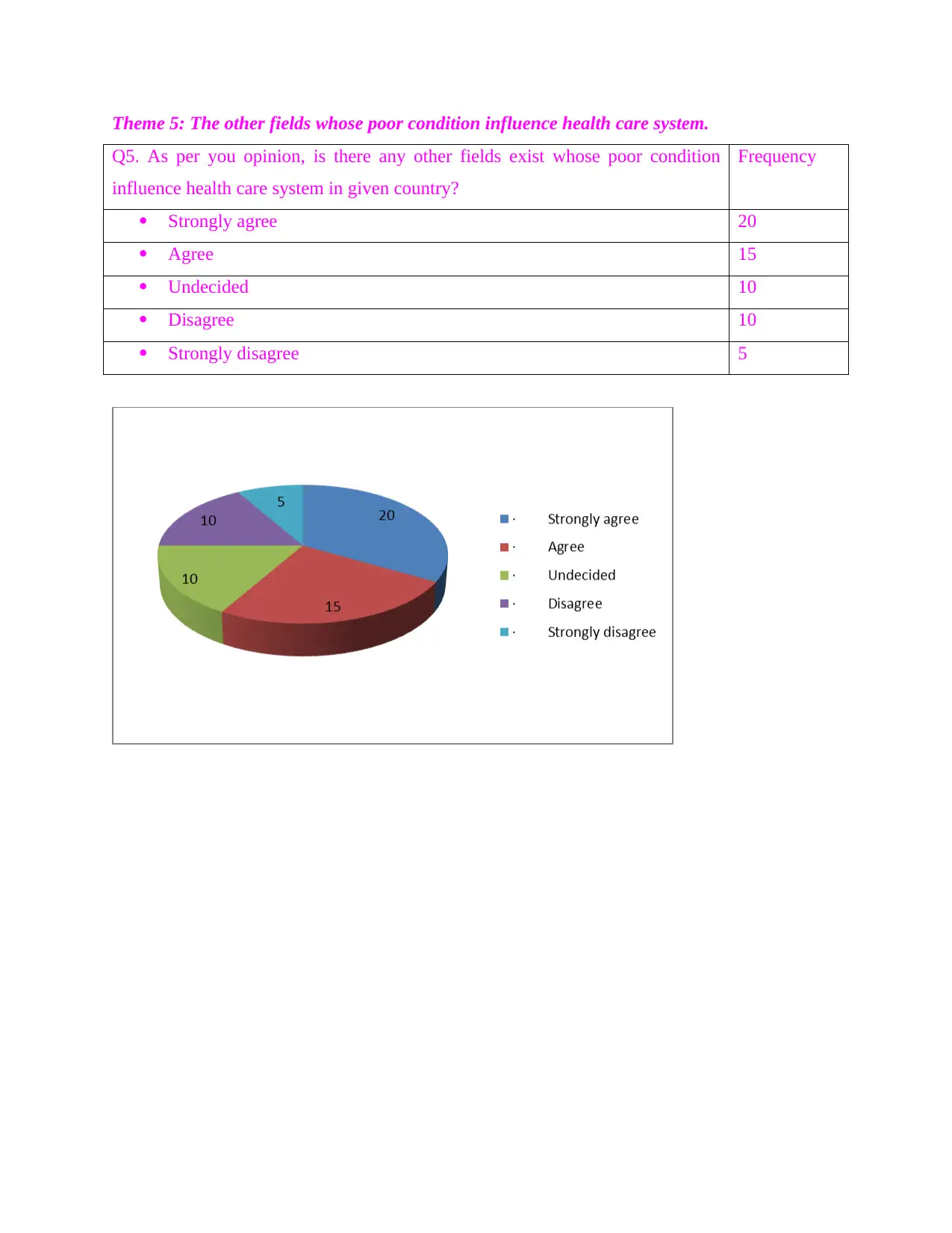
Theme 5: The other fields whose poor condition influence health care system.
Q5. As per you opinion, is there any other fields exist whose poor condition
influence health care system in given country?
Frequency
Strongly agree 20
Agree 15
Undecided 10
Disagree 10
Strongly disagree 5
Q5. As per you opinion, is there any other fields exist whose poor condition
influence health care system in given country?
Frequency
Strongly agree 20
Agree 15
Undecided 10
Disagree 10
Strongly disagree 5
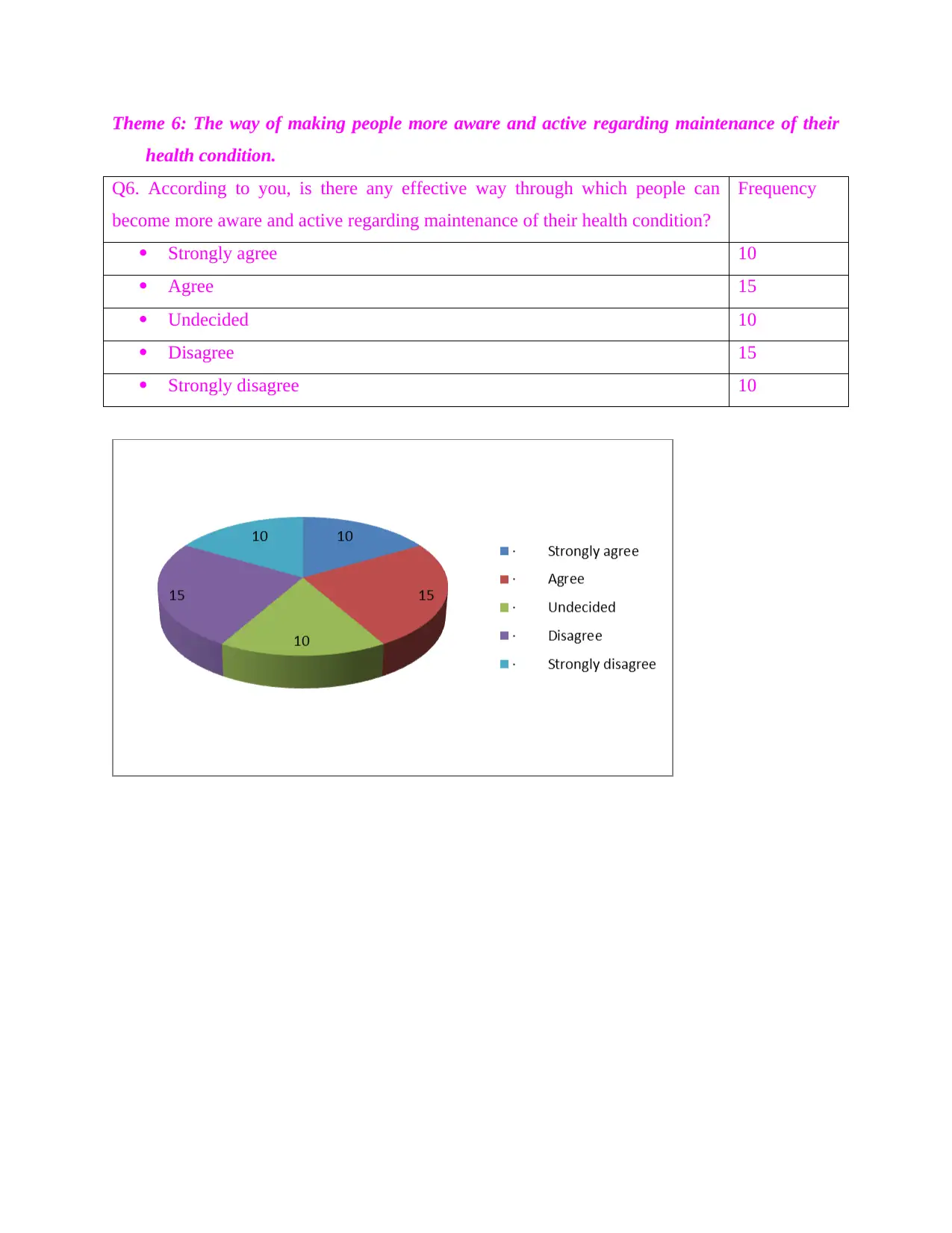
Theme 6: The way of making people more aware and active regarding maintenance of their
health condition.
Q6. According to you, is there any effective way through which people can
become more aware and active regarding maintenance of their health condition?
Frequency
Strongly agree 10
Agree 15
Undecided 10
Disagree 15
Strongly disagree 10
health condition.
Q6. According to you, is there any effective way through which people can
become more aware and active regarding maintenance of their health condition?
Frequency
Strongly agree 10
Agree 15
Undecided 10
Disagree 15
Strongly disagree 10
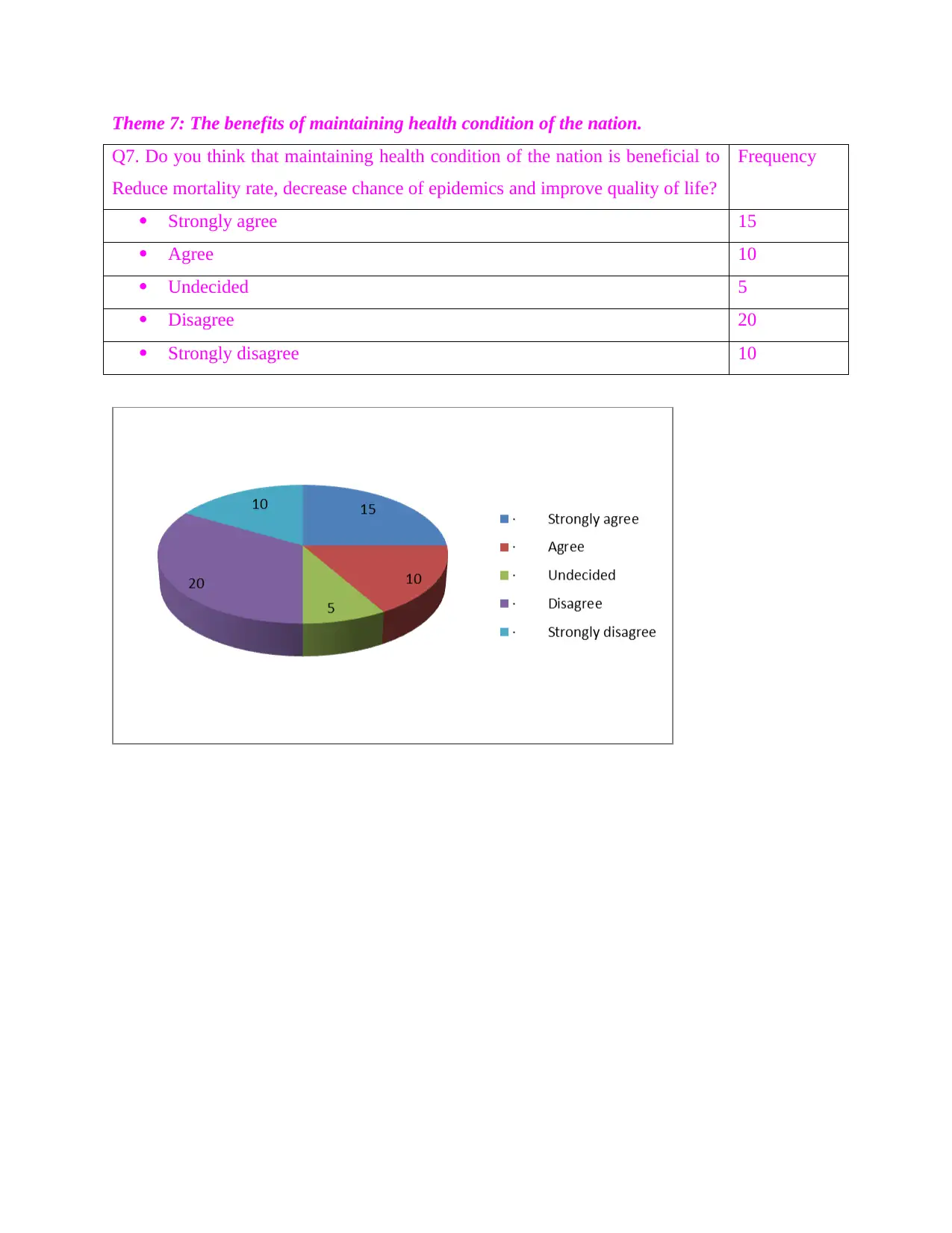
Theme 7: The benefits of maintaining health condition of the nation.
Q7. Do you think that maintaining health condition of the nation is beneficial to
Reduce mortality rate, decrease chance of epidemics and improve quality of life?
Frequency
Strongly agree 15
Agree 10
Undecided 5
Disagree 20
Strongly disagree 10
Q7. Do you think that maintaining health condition of the nation is beneficial to
Reduce mortality rate, decrease chance of epidemics and improve quality of life?
Frequency
Strongly agree 15
Agree 10
Undecided 5
Disagree 20
Strongly disagree 10
Secure Best Marks with AI Grader
Need help grading? Try our AI Grader for instant feedback on your assignments.
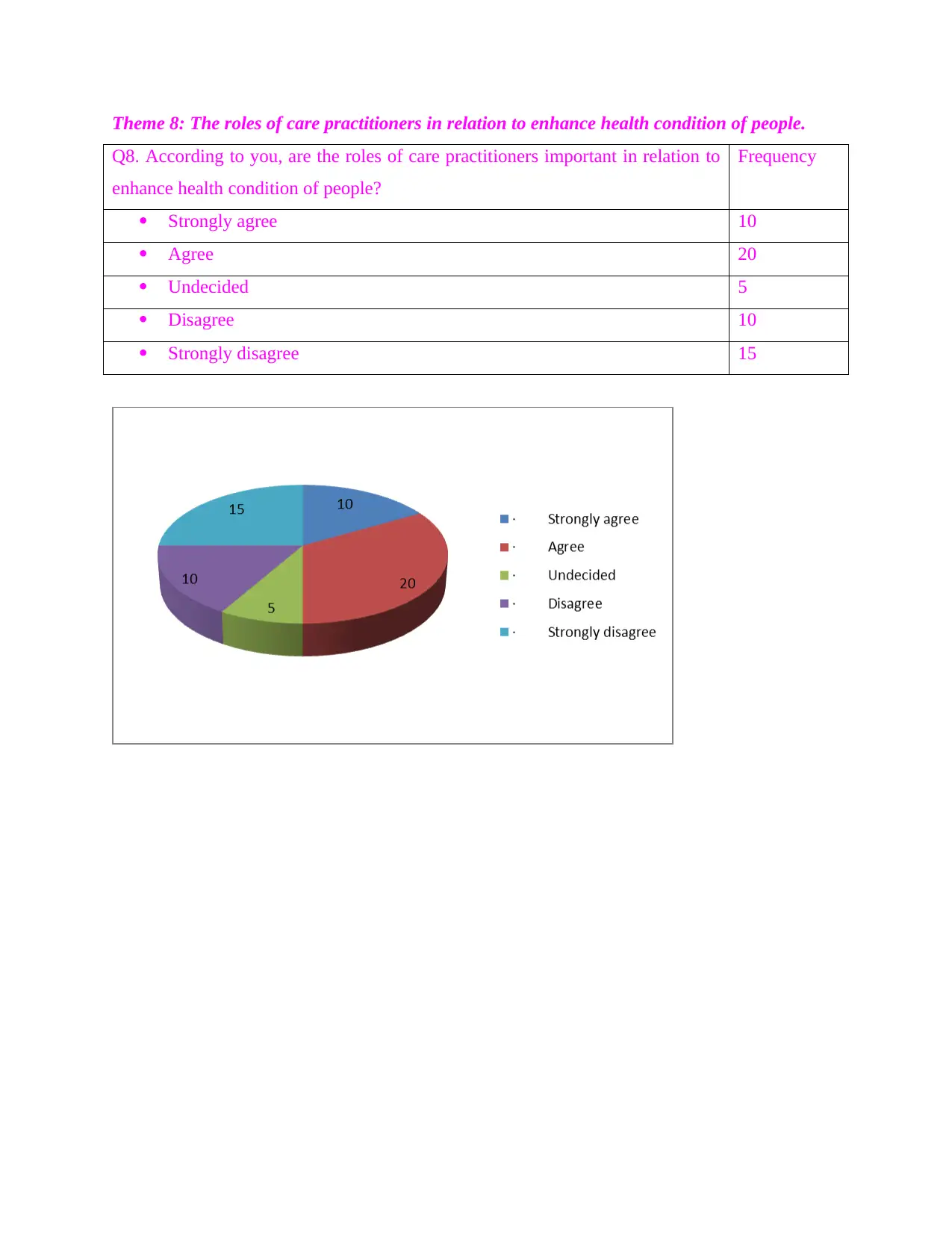
Theme 8: The roles of care practitioners in relation to enhance health condition of people.
Q8. According to you, are the roles of care practitioners important in relation to
enhance health condition of people?
Frequency
Strongly agree 10
Agree 20
Undecided 5
Disagree 10
Strongly disagree 15
Q8. According to you, are the roles of care practitioners important in relation to
enhance health condition of people?
Frequency
Strongly agree 10
Agree 20
Undecided 5
Disagree 10
Strongly disagree 15
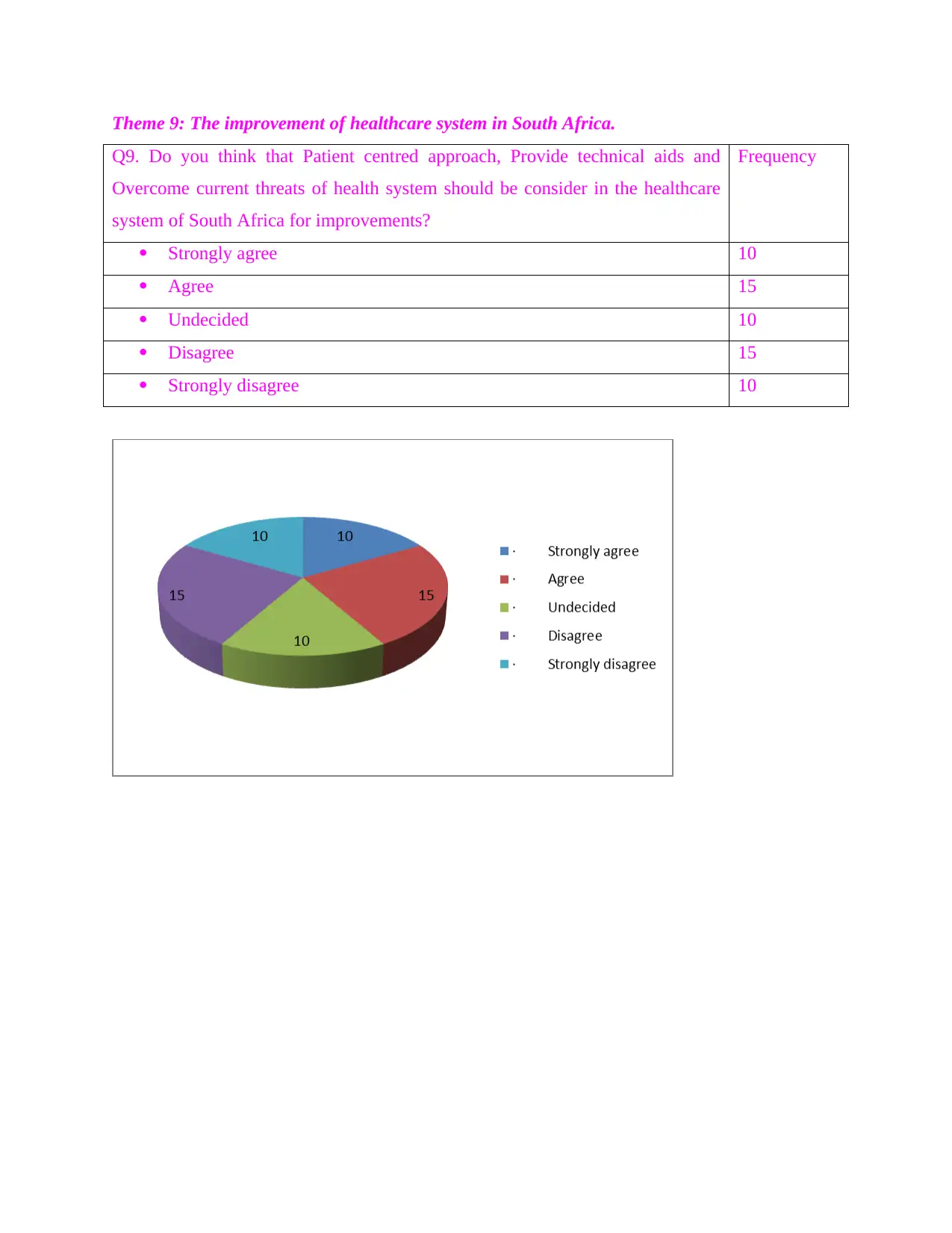
Theme 9: The improvement of healthcare system in South Africa.
Q9. Do you think that Patient centred approach, Provide technical aids and
Overcome current threats of health system should be consider in the healthcare
system of South Africa for improvements?
Frequency
Strongly agree 10
Agree 15
Undecided 10
Disagree 15
Strongly disagree 10
Q9. Do you think that Patient centred approach, Provide technical aids and
Overcome current threats of health system should be consider in the healthcare
system of South Africa for improvements?
Frequency
Strongly agree 10
Agree 15
Undecided 10
Disagree 15
Strongly disagree 10
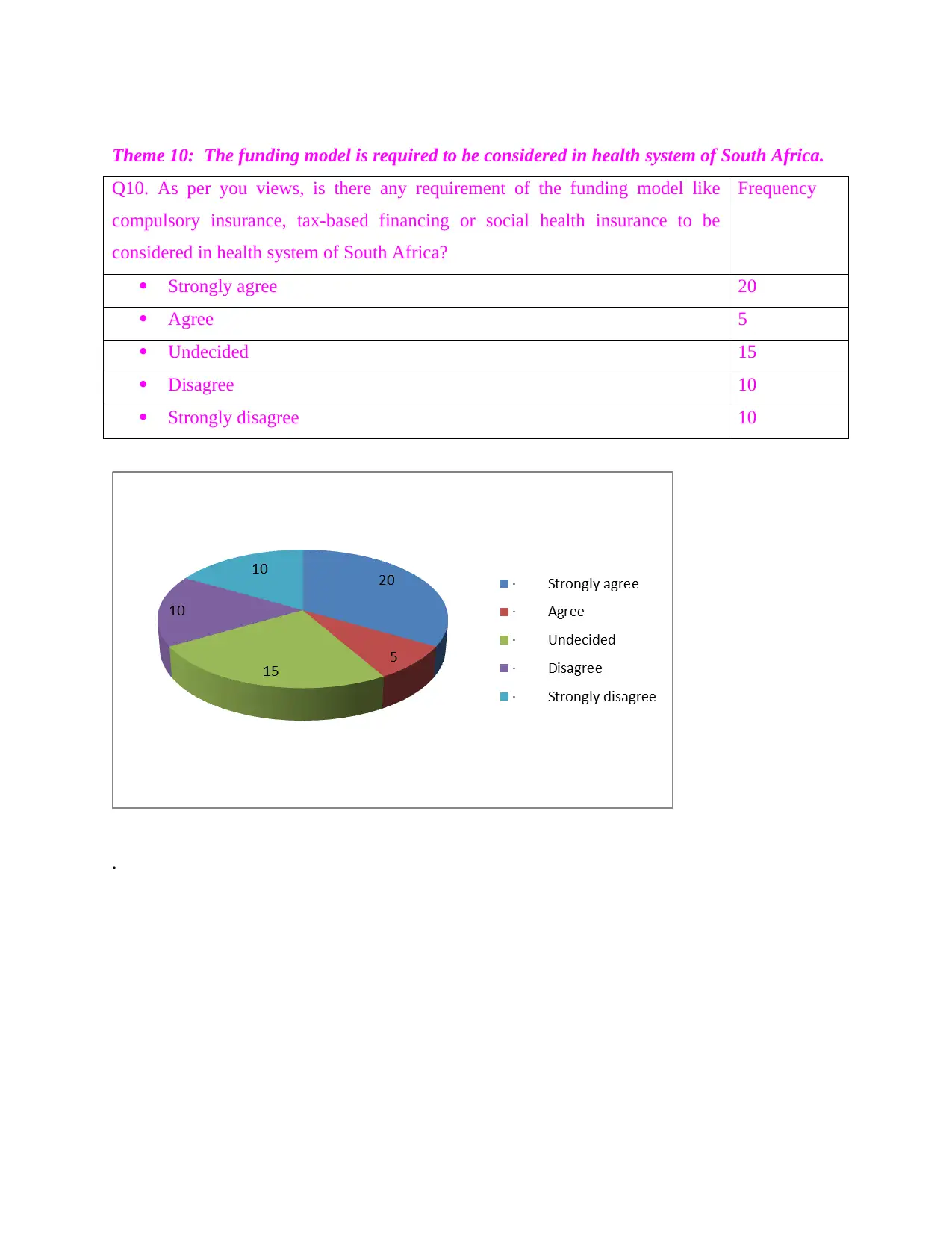
Theme 10: The funding model is required to be considered in health system of South Africa.
Q10. As per you views, is there any requirement of the funding model like
compulsory insurance, tax-based financing or social health insurance to be
considered in health system of South Africa?
Frequency
Strongly agree 20
Agree 5
Undecided 15
Disagree 10
Strongly disagree 10
.
Q10. As per you views, is there any requirement of the funding model like
compulsory insurance, tax-based financing or social health insurance to be
considered in health system of South Africa?
Frequency
Strongly agree 20
Agree 5
Undecided 15
Disagree 10
Strongly disagree 10
.
Paraphrase This Document
Need a fresh take? Get an instant paraphrase of this document with our AI Paraphraser
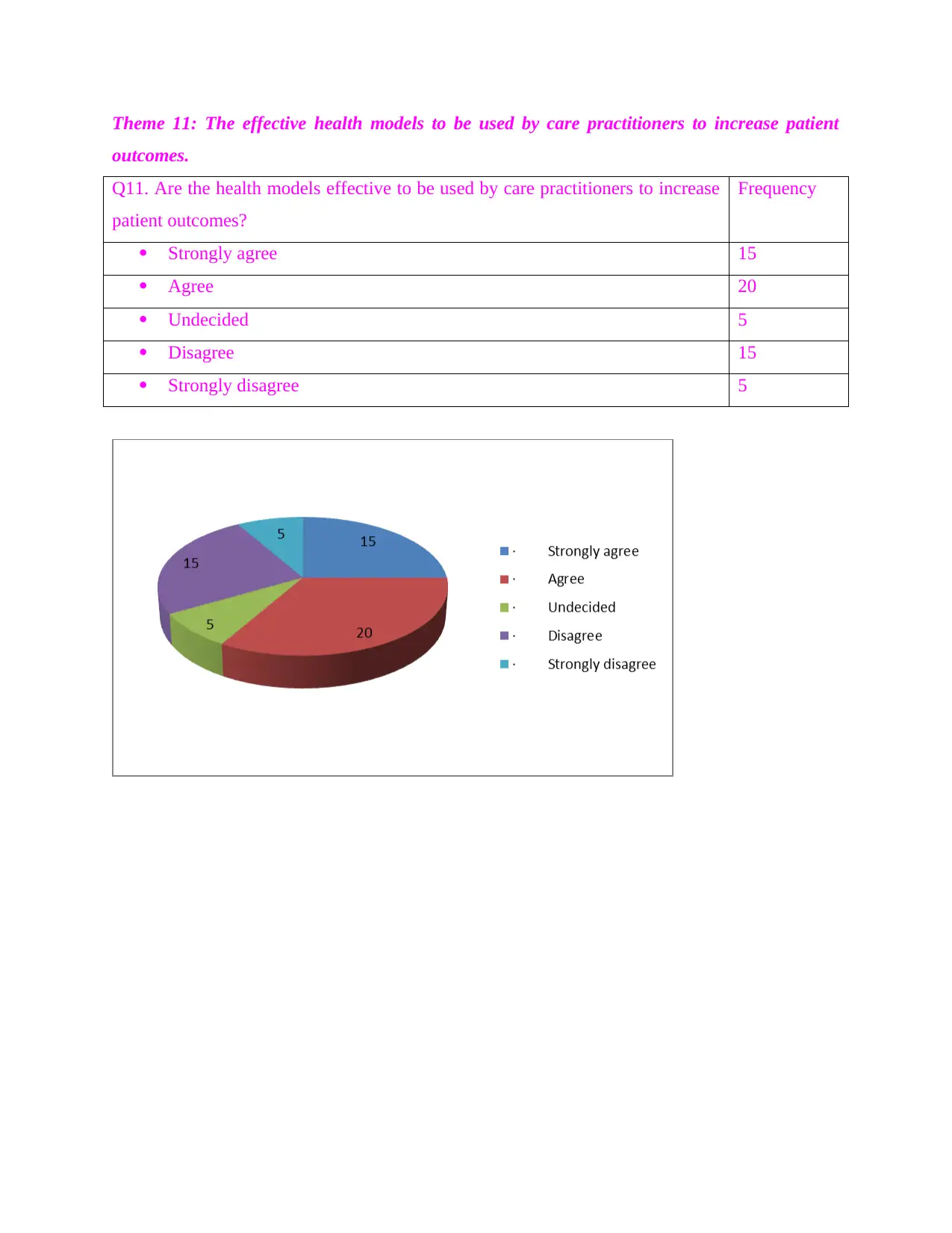
Theme 11: The effective health models to be used by care practitioners to increase patient
outcomes.
Q11. Are the health models effective to be used by care practitioners to increase
patient outcomes?
Frequency
Strongly agree 15
Agree 20
Undecided 5
Disagree 15
Strongly disagree 5
outcomes.
Q11. Are the health models effective to be used by care practitioners to increase
patient outcomes?
Frequency
Strongly agree 15
Agree 20
Undecided 5
Disagree 15
Strongly disagree 5
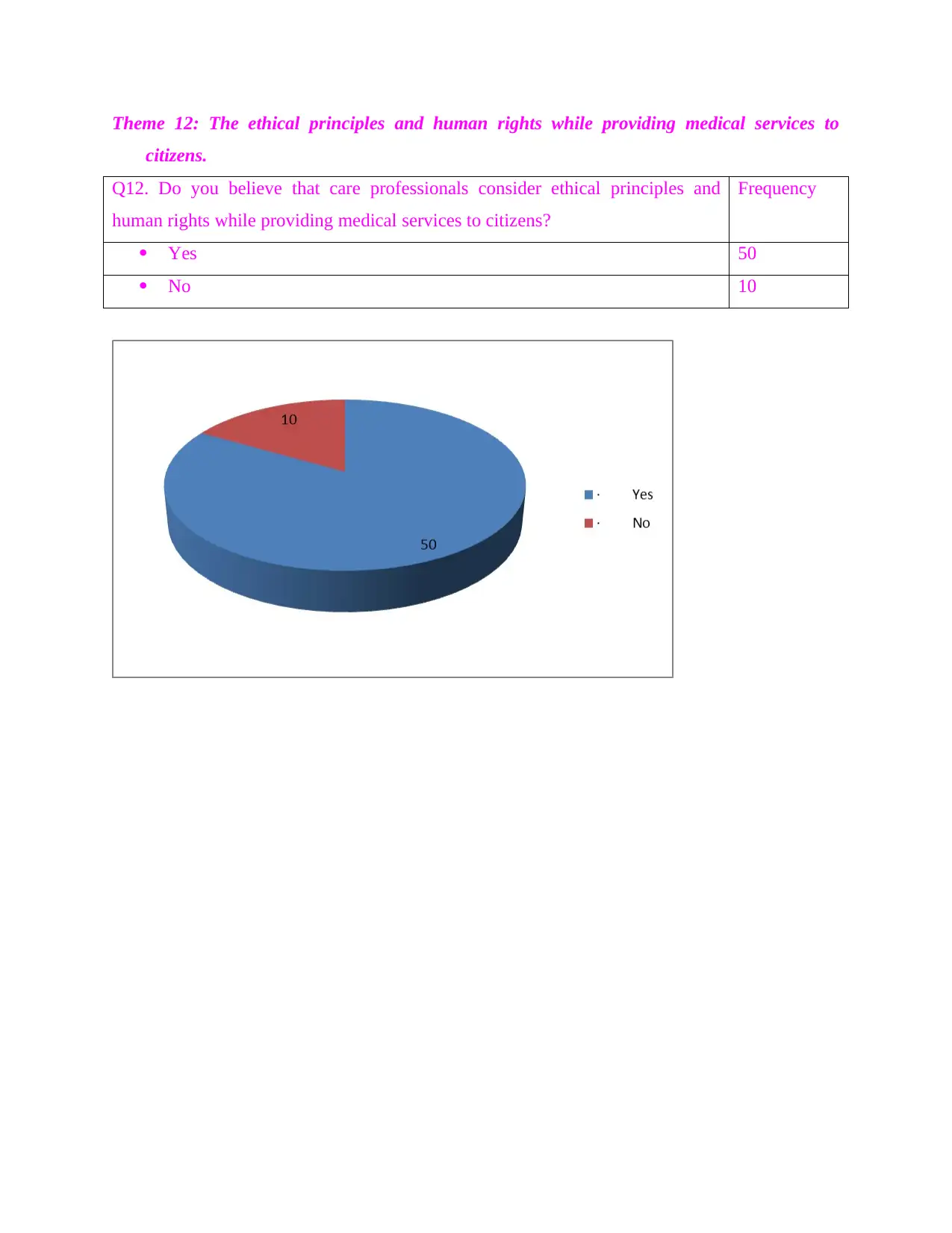
Theme 12: The ethical principles and human rights while providing medical services to
citizens.
Q12. Do you believe that care professionals consider ethical principles and
human rights while providing medical services to citizens?
Frequency
Yes 50
No 10
citizens.
Q12. Do you believe that care professionals consider ethical principles and
human rights while providing medical services to citizens?
Frequency
Yes 50
No 10
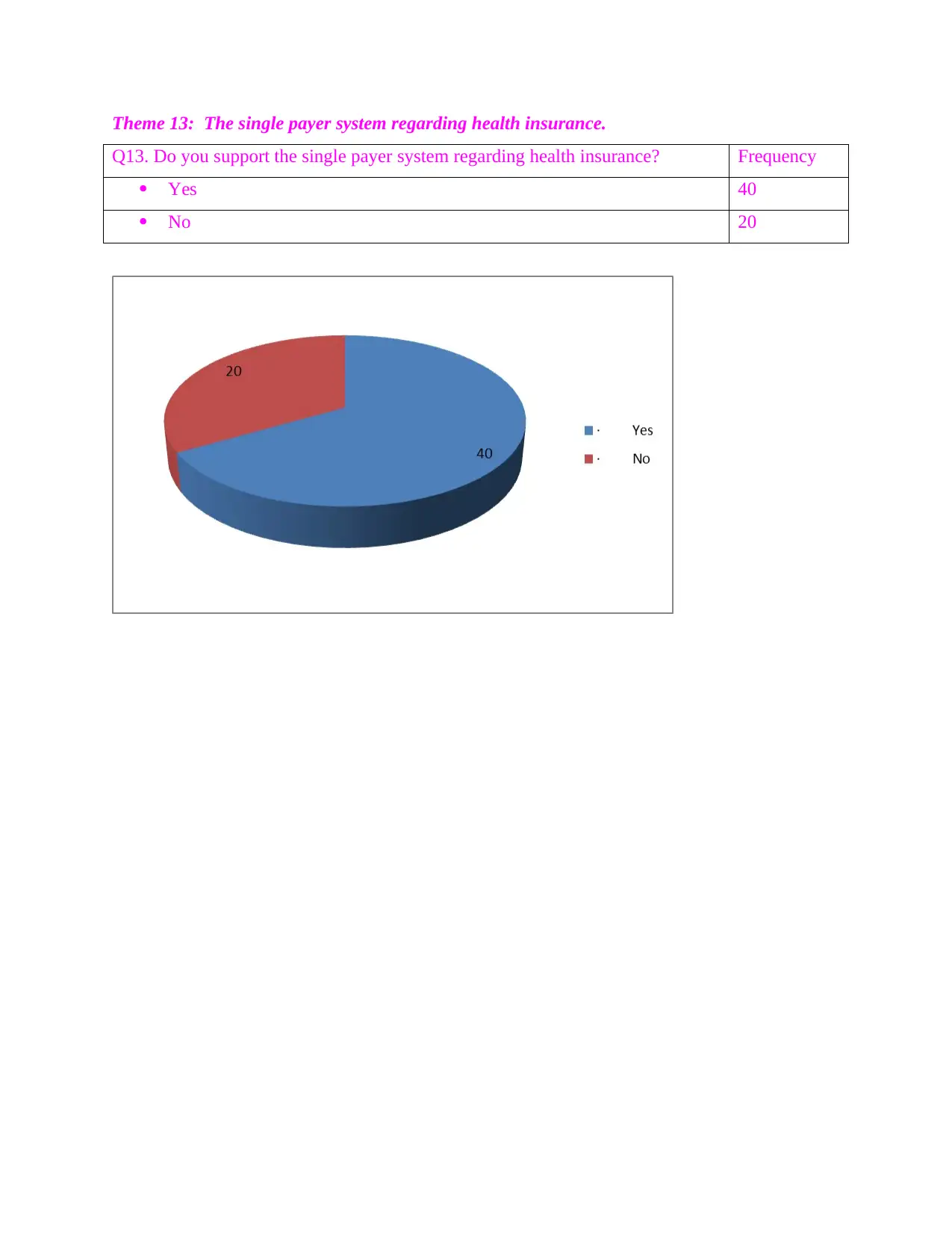
Theme 13: The single payer system regarding health insurance.
Q13. Do you support the single payer system regarding health insurance? Frequency
Yes 40
No 20
Q13. Do you support the single payer system regarding health insurance? Frequency
Yes 40
No 20
Secure Best Marks with AI Grader
Need help grading? Try our AI Grader for instant feedback on your assignments.
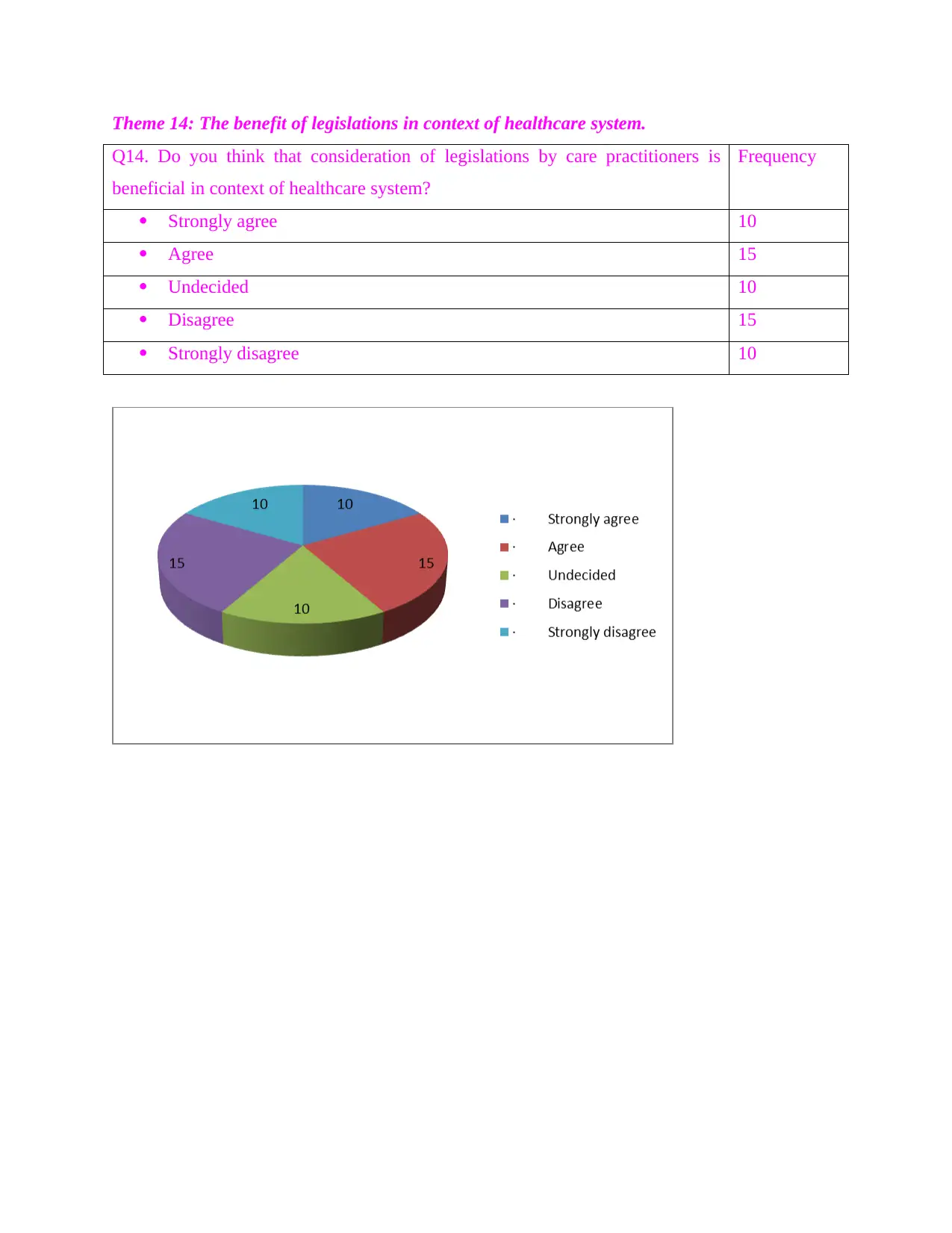
Theme 14: The benefit of legislations in context of healthcare system.
Q14. Do you think that consideration of legislations by care practitioners is
beneficial in context of healthcare system?
Frequency
Strongly agree 10
Agree 15
Undecided 10
Disagree 15
Strongly disagree 10
Q14. Do you think that consideration of legislations by care practitioners is
beneficial in context of healthcare system?
Frequency
Strongly agree 10
Agree 15
Undecided 10
Disagree 15
Strongly disagree 10
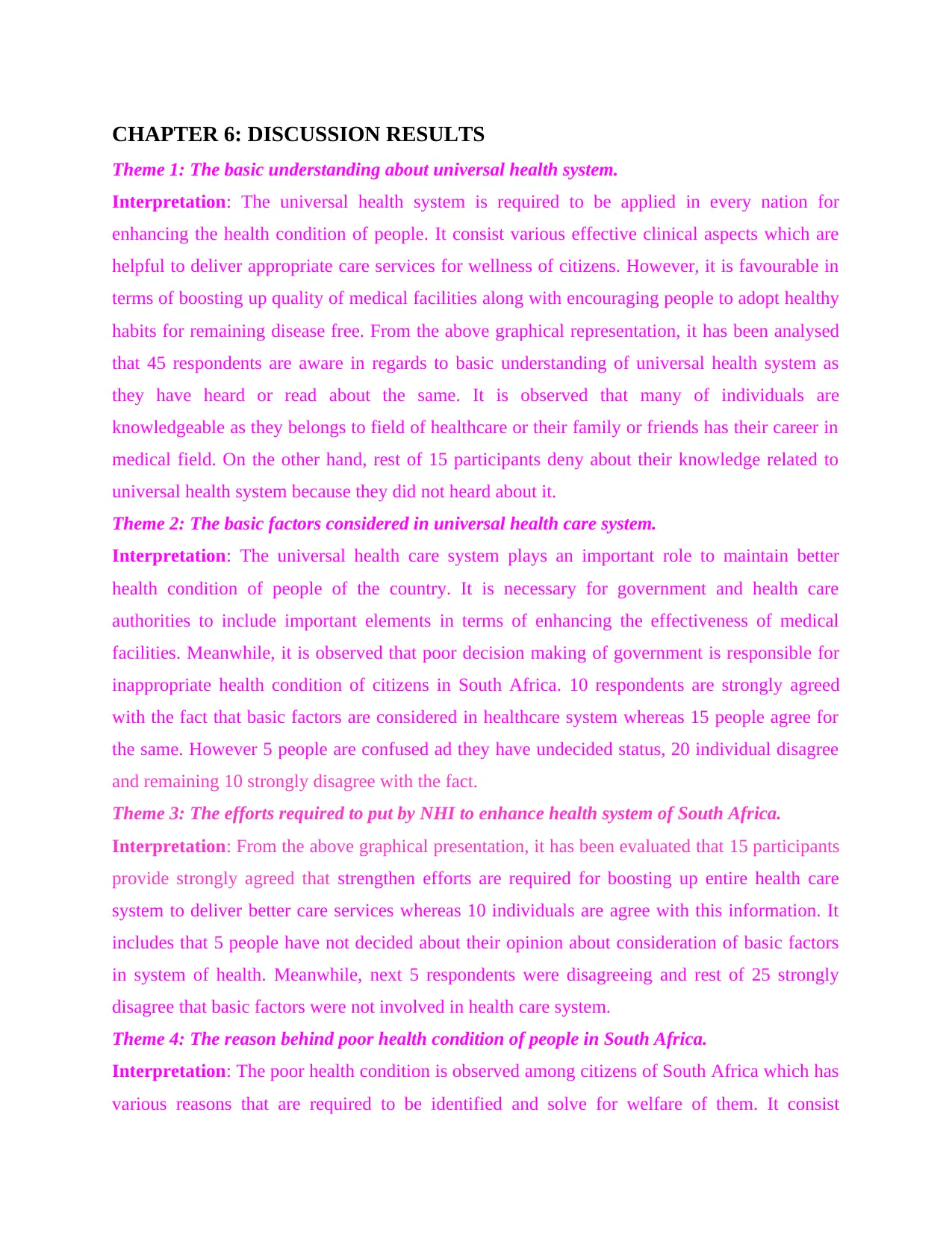
CHAPTER 6: DISCUSSION RESULTS
Theme 1: The basic understanding about universal health system.
Interpretation: The universal health system is required to be applied in every nation for
enhancing the health condition of people. It consist various effective clinical aspects which are
helpful to deliver appropriate care services for wellness of citizens. However, it is favourable in
terms of boosting up quality of medical facilities along with encouraging people to adopt healthy
habits for remaining disease free. From the above graphical representation, it has been analysed
that 45 respondents are aware in regards to basic understanding of universal health system as
they have heard or read about the same. It is observed that many of individuals are
knowledgeable as they belongs to field of healthcare or their family or friends has their career in
medical field. On the other hand, rest of 15 participants deny about their knowledge related to
universal health system because they did not heard about it.
Theme 2: The basic factors considered in universal health care system.
Interpretation: The universal health care system plays an important role to maintain better
health condition of people of the country. It is necessary for government and health care
authorities to include important elements in terms of enhancing the effectiveness of medical
facilities. Meanwhile, it is observed that poor decision making of government is responsible for
inappropriate health condition of citizens in South Africa. 10 respondents are strongly agreed
with the fact that basic factors are considered in healthcare system whereas 15 people agree for
the same. However 5 people are confused ad they have undecided status, 20 individual disagree
and remaining 10 strongly disagree with the fact.
Theme 3: The efforts required to put by NHI to enhance health system of South Africa.
Interpretation: From the above graphical presentation, it has been evaluated that 15 participants
provide strongly agreed that strengthen efforts are required for boosting up entire health care
system to deliver better care services whereas 10 individuals are agree with this information. It
includes that 5 people have not decided about their opinion about consideration of basic factors
in system of health. Meanwhile, next 5 respondents were disagreeing and rest of 25 strongly
disagree that basic factors were not involved in health care system.
Theme 4: The reason behind poor health condition of people in South Africa.
Interpretation: The poor health condition is observed among citizens of South Africa which has
various reasons that are required to be identified and solve for welfare of them. It consist
Theme 1: The basic understanding about universal health system.
Interpretation: The universal health system is required to be applied in every nation for
enhancing the health condition of people. It consist various effective clinical aspects which are
helpful to deliver appropriate care services for wellness of citizens. However, it is favourable in
terms of boosting up quality of medical facilities along with encouraging people to adopt healthy
habits for remaining disease free. From the above graphical representation, it has been analysed
that 45 respondents are aware in regards to basic understanding of universal health system as
they have heard or read about the same. It is observed that many of individuals are
knowledgeable as they belongs to field of healthcare or their family or friends has their career in
medical field. On the other hand, rest of 15 participants deny about their knowledge related to
universal health system because they did not heard about it.
Theme 2: The basic factors considered in universal health care system.
Interpretation: The universal health care system plays an important role to maintain better
health condition of people of the country. It is necessary for government and health care
authorities to include important elements in terms of enhancing the effectiveness of medical
facilities. Meanwhile, it is observed that poor decision making of government is responsible for
inappropriate health condition of citizens in South Africa. 10 respondents are strongly agreed
with the fact that basic factors are considered in healthcare system whereas 15 people agree for
the same. However 5 people are confused ad they have undecided status, 20 individual disagree
and remaining 10 strongly disagree with the fact.
Theme 3: The efforts required to put by NHI to enhance health system of South Africa.
Interpretation: From the above graphical presentation, it has been evaluated that 15 participants
provide strongly agreed that strengthen efforts are required for boosting up entire health care
system to deliver better care services whereas 10 individuals are agree with this information. It
includes that 5 people have not decided about their opinion about consideration of basic factors
in system of health. Meanwhile, next 5 respondents were disagreeing and rest of 25 strongly
disagree that basic factors were not involved in health care system.
Theme 4: The reason behind poor health condition of people in South Africa.
Interpretation: The poor health condition is observed among citizens of South Africa which has
various reasons that are required to be identified and solve for welfare of them. It consist
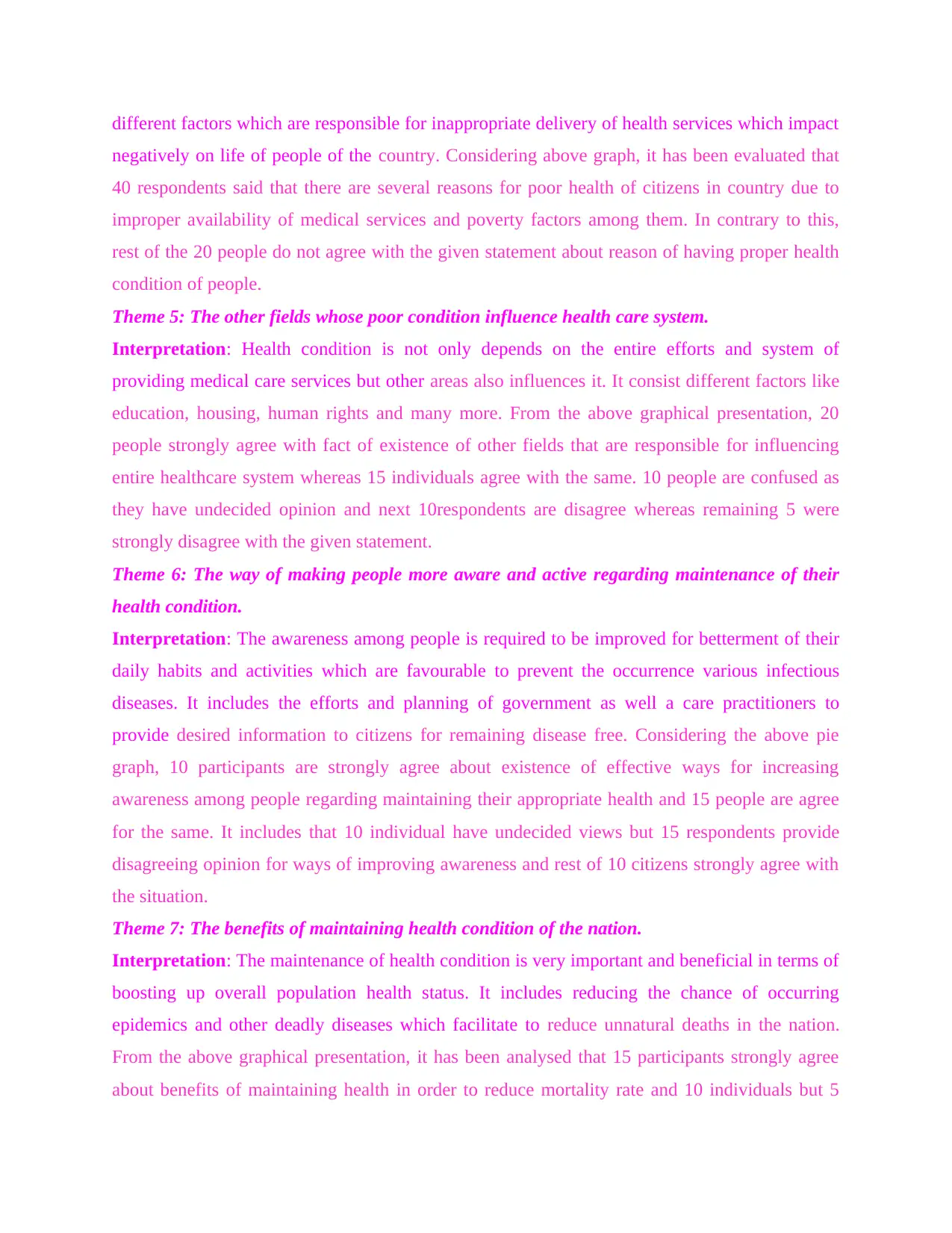
different factors which are responsible for inappropriate delivery of health services which impact
negatively on life of people of the country. Considering above graph, it has been evaluated that
40 respondents said that there are several reasons for poor health of citizens in country due to
improper availability of medical services and poverty factors among them. In contrary to this,
rest of the 20 people do not agree with the given statement about reason of having proper health
condition of people.
Theme 5: The other fields whose poor condition influence health care system.
Interpretation: Health condition is not only depends on the entire efforts and system of
providing medical care services but other areas also influences it. It consist different factors like
education, housing, human rights and many more. From the above graphical presentation, 20
people strongly agree with fact of existence of other fields that are responsible for influencing
entire healthcare system whereas 15 individuals agree with the same. 10 people are confused as
they have undecided opinion and next 10respondents are disagree whereas remaining 5 were
strongly disagree with the given statement.
Theme 6: The way of making people more aware and active regarding maintenance of their
health condition.
Interpretation: The awareness among people is required to be improved for betterment of their
daily habits and activities which are favourable to prevent the occurrence various infectious
diseases. It includes the efforts and planning of government as well a care practitioners to
provide desired information to citizens for remaining disease free. Considering the above pie
graph, 10 participants are strongly agree about existence of effective ways for increasing
awareness among people regarding maintaining their appropriate health and 15 people are agree
for the same. It includes that 10 individual have undecided views but 15 respondents provide
disagreeing opinion for ways of improving awareness and rest of 10 citizens strongly agree with
the situation.
Theme 7: The benefits of maintaining health condition of the nation.
Interpretation: The maintenance of health condition is very important and beneficial in terms of
boosting up overall population health status. It includes reducing the chance of occurring
epidemics and other deadly diseases which facilitate to reduce unnatural deaths in the nation.
From the above graphical presentation, it has been analysed that 15 participants strongly agree
about benefits of maintaining health in order to reduce mortality rate and 10 individuals but 5
negatively on life of people of the country. Considering above graph, it has been evaluated that
40 respondents said that there are several reasons for poor health of citizens in country due to
improper availability of medical services and poverty factors among them. In contrary to this,
rest of the 20 people do not agree with the given statement about reason of having proper health
condition of people.
Theme 5: The other fields whose poor condition influence health care system.
Interpretation: Health condition is not only depends on the entire efforts and system of
providing medical care services but other areas also influences it. It consist different factors like
education, housing, human rights and many more. From the above graphical presentation, 20
people strongly agree with fact of existence of other fields that are responsible for influencing
entire healthcare system whereas 15 individuals agree with the same. 10 people are confused as
they have undecided opinion and next 10respondents are disagree whereas remaining 5 were
strongly disagree with the given statement.
Theme 6: The way of making people more aware and active regarding maintenance of their
health condition.
Interpretation: The awareness among people is required to be improved for betterment of their
daily habits and activities which are favourable to prevent the occurrence various infectious
diseases. It includes the efforts and planning of government as well a care practitioners to
provide desired information to citizens for remaining disease free. Considering the above pie
graph, 10 participants are strongly agree about existence of effective ways for increasing
awareness among people regarding maintaining their appropriate health and 15 people are agree
for the same. It includes that 10 individual have undecided views but 15 respondents provide
disagreeing opinion for ways of improving awareness and rest of 10 citizens strongly agree with
the situation.
Theme 7: The benefits of maintaining health condition of the nation.
Interpretation: The maintenance of health condition is very important and beneficial in terms of
boosting up overall population health status. It includes reducing the chance of occurring
epidemics and other deadly diseases which facilitate to reduce unnatural deaths in the nation.
From the above graphical presentation, it has been analysed that 15 participants strongly agree
about benefits of maintaining health in order to reduce mortality rate and 10 individuals but 5
Paraphrase This Document
Need a fresh take? Get an instant paraphrase of this document with our AI Paraphraser
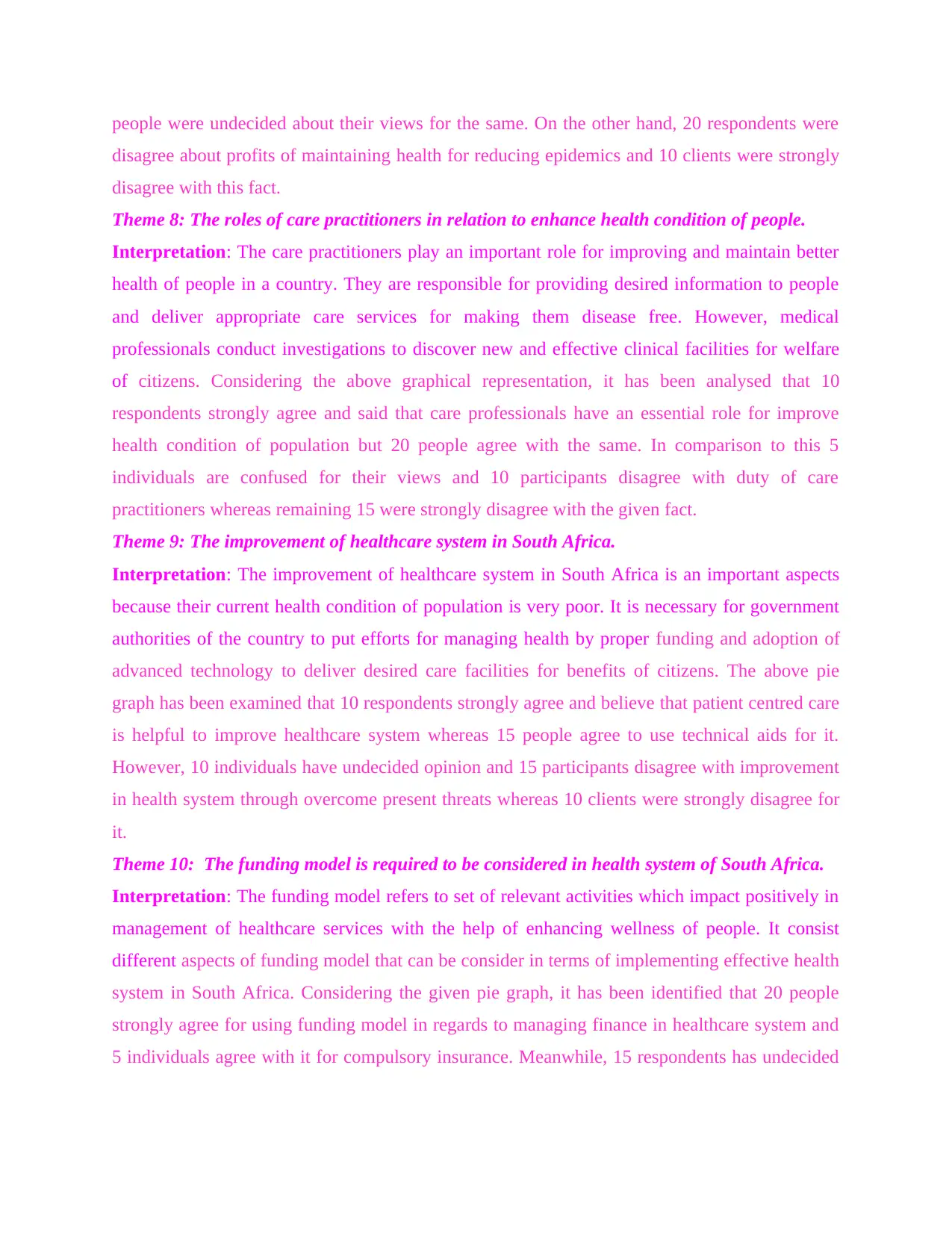
people were undecided about their views for the same. On the other hand, 20 respondents were
disagree about profits of maintaining health for reducing epidemics and 10 clients were strongly
disagree with this fact.
Theme 8: The roles of care practitioners in relation to enhance health condition of people.
Interpretation: The care practitioners play an important role for improving and maintain better
health of people in a country. They are responsible for providing desired information to people
and deliver appropriate care services for making them disease free. However, medical
professionals conduct investigations to discover new and effective clinical facilities for welfare
of citizens. Considering the above graphical representation, it has been analysed that 10
respondents strongly agree and said that care professionals have an essential role for improve
health condition of population but 20 people agree with the same. In comparison to this 5
individuals are confused for their views and 10 participants disagree with duty of care
practitioners whereas remaining 15 were strongly disagree with the given fact.
Theme 9: The improvement of healthcare system in South Africa.
Interpretation: The improvement of healthcare system in South Africa is an important aspects
because their current health condition of population is very poor. It is necessary for government
authorities of the country to put efforts for managing health by proper funding and adoption of
advanced technology to deliver desired care facilities for benefits of citizens. The above pie
graph has been examined that 10 respondents strongly agree and believe that patient centred care
is helpful to improve healthcare system whereas 15 people agree to use technical aids for it.
However, 10 individuals have undecided opinion and 15 participants disagree with improvement
in health system through overcome present threats whereas 10 clients were strongly disagree for
it.
Theme 10: The funding model is required to be considered in health system of South Africa.
Interpretation: The funding model refers to set of relevant activities which impact positively in
management of healthcare services with the help of enhancing wellness of people. It consist
different aspects of funding model that can be consider in terms of implementing effective health
system in South Africa. Considering the given pie graph, it has been identified that 20 people
strongly agree for using funding model in regards to managing finance in healthcare system and
5 individuals agree with it for compulsory insurance. Meanwhile, 15 respondents has undecided
disagree about profits of maintaining health for reducing epidemics and 10 clients were strongly
disagree with this fact.
Theme 8: The roles of care practitioners in relation to enhance health condition of people.
Interpretation: The care practitioners play an important role for improving and maintain better
health of people in a country. They are responsible for providing desired information to people
and deliver appropriate care services for making them disease free. However, medical
professionals conduct investigations to discover new and effective clinical facilities for welfare
of citizens. Considering the above graphical representation, it has been analysed that 10
respondents strongly agree and said that care professionals have an essential role for improve
health condition of population but 20 people agree with the same. In comparison to this 5
individuals are confused for their views and 10 participants disagree with duty of care
practitioners whereas remaining 15 were strongly disagree with the given fact.
Theme 9: The improvement of healthcare system in South Africa.
Interpretation: The improvement of healthcare system in South Africa is an important aspects
because their current health condition of population is very poor. It is necessary for government
authorities of the country to put efforts for managing health by proper funding and adoption of
advanced technology to deliver desired care facilities for benefits of citizens. The above pie
graph has been examined that 10 respondents strongly agree and believe that patient centred care
is helpful to improve healthcare system whereas 15 people agree to use technical aids for it.
However, 10 individuals have undecided opinion and 15 participants disagree with improvement
in health system through overcome present threats whereas 10 clients were strongly disagree for
it.
Theme 10: The funding model is required to be considered in health system of South Africa.
Interpretation: The funding model refers to set of relevant activities which impact positively in
management of healthcare services with the help of enhancing wellness of people. It consist
different aspects of funding model that can be consider in terms of implementing effective health
system in South Africa. Considering the given pie graph, it has been identified that 20 people
strongly agree for using funding model in regards to managing finance in healthcare system and
5 individuals agree with it for compulsory insurance. Meanwhile, 15 respondents has undecided
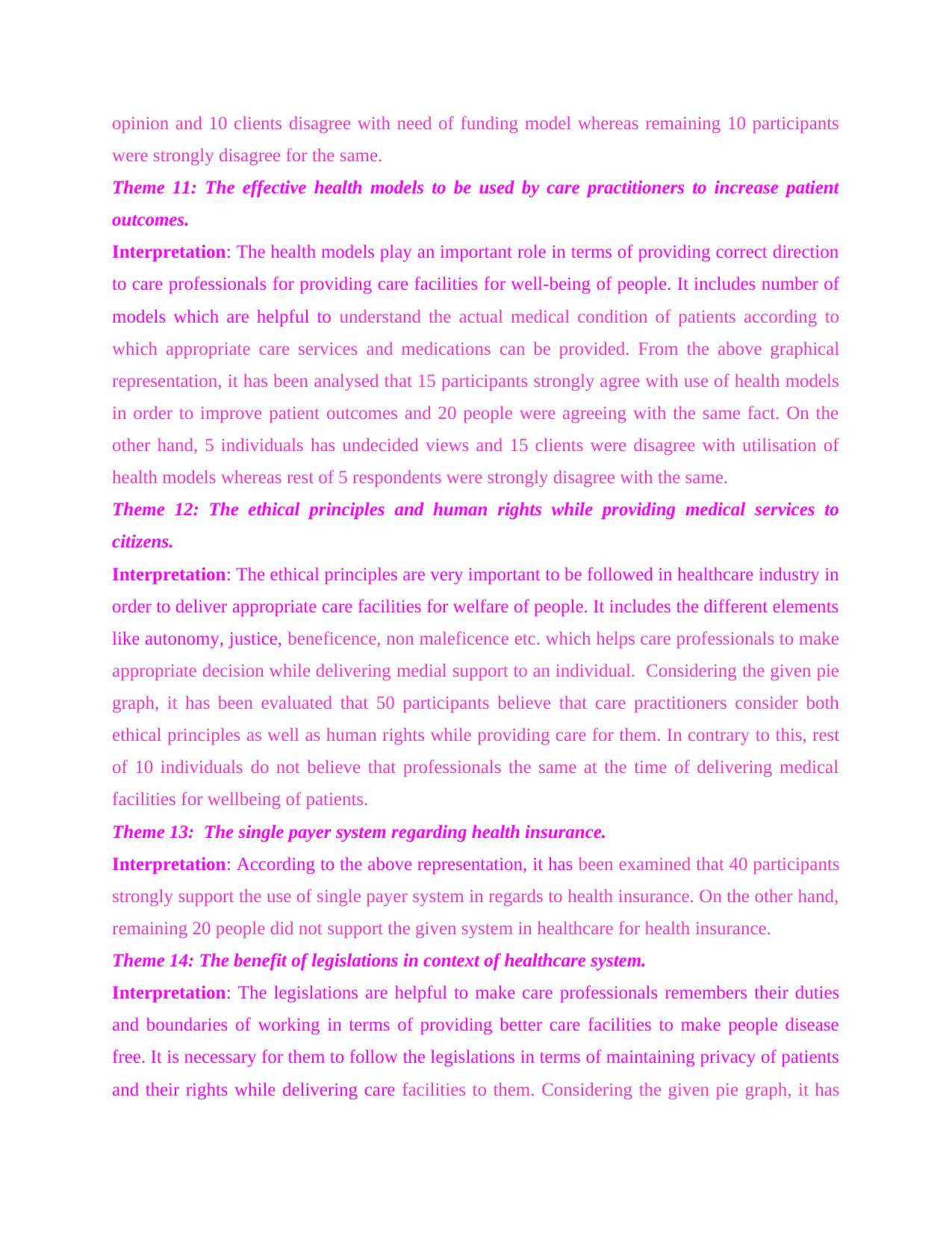
opinion and 10 clients disagree with need of funding model whereas remaining 10 participants
were strongly disagree for the same.
Theme 11: The effective health models to be used by care practitioners to increase patient
outcomes.
Interpretation: The health models play an important role in terms of providing correct direction
to care professionals for providing care facilities for well-being of people. It includes number of
models which are helpful to understand the actual medical condition of patients according to
which appropriate care services and medications can be provided. From the above graphical
representation, it has been analysed that 15 participants strongly agree with use of health models
in order to improve patient outcomes and 20 people were agreeing with the same fact. On the
other hand, 5 individuals has undecided views and 15 clients were disagree with utilisation of
health models whereas rest of 5 respondents were strongly disagree with the same.
Theme 12: The ethical principles and human rights while providing medical services to
citizens.
Interpretation: The ethical principles are very important to be followed in healthcare industry in
order to deliver appropriate care facilities for welfare of people. It includes the different elements
like autonomy, justice, beneficence, non maleficence etc. which helps care professionals to make
appropriate decision while delivering medial support to an individual. Considering the given pie
graph, it has been evaluated that 50 participants believe that care practitioners consider both
ethical principles as well as human rights while providing care for them. In contrary to this, rest
of 10 individuals do not believe that professionals the same at the time of delivering medical
facilities for wellbeing of patients.
Theme 13: The single payer system regarding health insurance.
Interpretation: According to the above representation, it has been examined that 40 participants
strongly support the use of single payer system in regards to health insurance. On the other hand,
remaining 20 people did not support the given system in healthcare for health insurance.
Theme 14: The benefit of legislations in context of healthcare system.
Interpretation: The legislations are helpful to make care professionals remembers their duties
and boundaries of working in terms of providing better care facilities to make people disease
free. It is necessary for them to follow the legislations in terms of maintaining privacy of patients
and their rights while delivering care facilities to them. Considering the given pie graph, it has
were strongly disagree for the same.
Theme 11: The effective health models to be used by care practitioners to increase patient
outcomes.
Interpretation: The health models play an important role in terms of providing correct direction
to care professionals for providing care facilities for well-being of people. It includes number of
models which are helpful to understand the actual medical condition of patients according to
which appropriate care services and medications can be provided. From the above graphical
representation, it has been analysed that 15 participants strongly agree with use of health models
in order to improve patient outcomes and 20 people were agreeing with the same fact. On the
other hand, 5 individuals has undecided views and 15 clients were disagree with utilisation of
health models whereas rest of 5 respondents were strongly disagree with the same.
Theme 12: The ethical principles and human rights while providing medical services to
citizens.
Interpretation: The ethical principles are very important to be followed in healthcare industry in
order to deliver appropriate care facilities for welfare of people. It includes the different elements
like autonomy, justice, beneficence, non maleficence etc. which helps care professionals to make
appropriate decision while delivering medial support to an individual. Considering the given pie
graph, it has been evaluated that 50 participants believe that care practitioners consider both
ethical principles as well as human rights while providing care for them. In contrary to this, rest
of 10 individuals do not believe that professionals the same at the time of delivering medical
facilities for wellbeing of patients.
Theme 13: The single payer system regarding health insurance.
Interpretation: According to the above representation, it has been examined that 40 participants
strongly support the use of single payer system in regards to health insurance. On the other hand,
remaining 20 people did not support the given system in healthcare for health insurance.
Theme 14: The benefit of legislations in context of healthcare system.
Interpretation: The legislations are helpful to make care professionals remembers their duties
and boundaries of working in terms of providing better care facilities to make people disease
free. It is necessary for them to follow the legislations in terms of maintaining privacy of patients
and their rights while delivering care facilities to them. Considering the given pie graph, it has
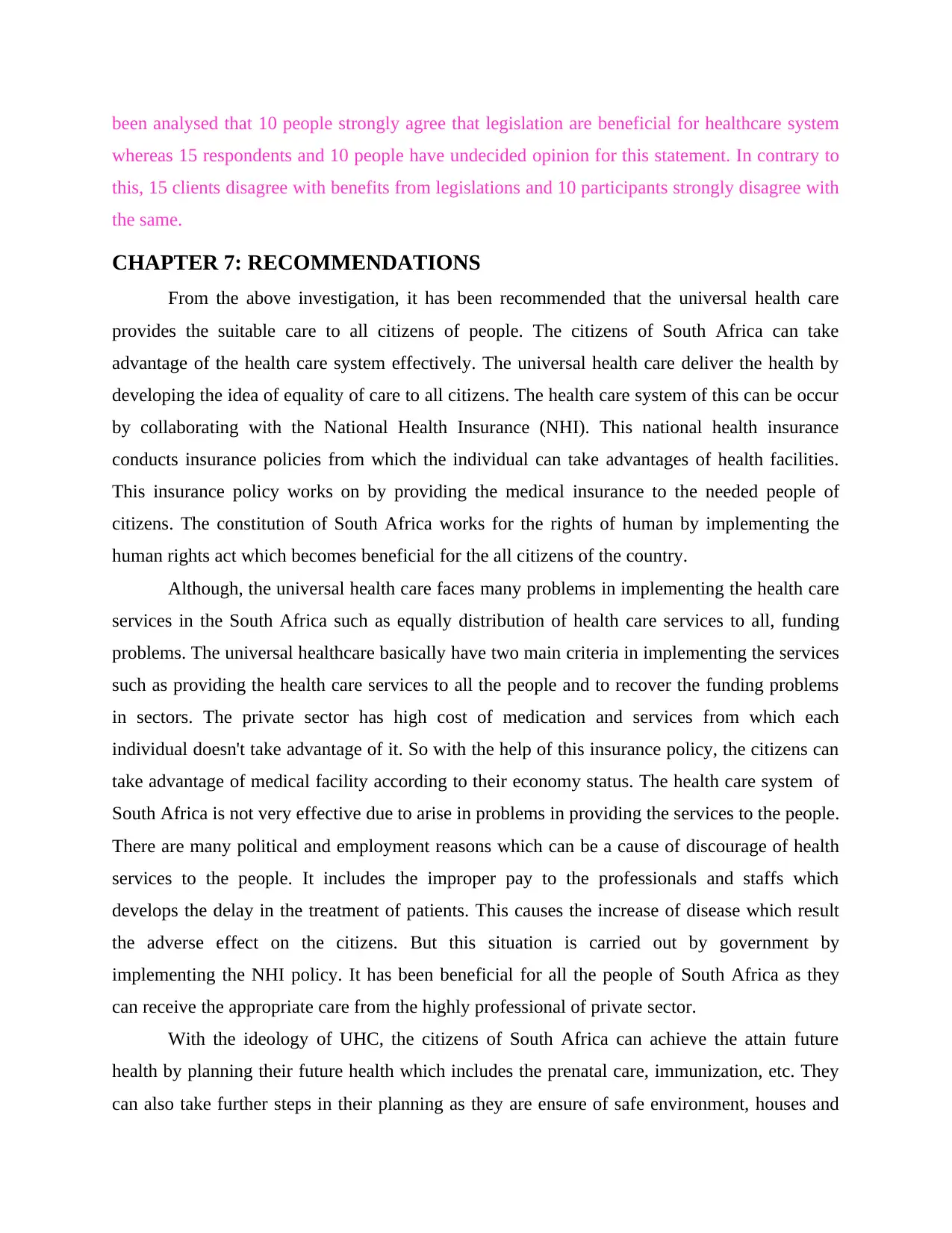
been analysed that 10 people strongly agree that legislation are beneficial for healthcare system
whereas 15 respondents and 10 people have undecided opinion for this statement. In contrary to
this, 15 clients disagree with benefits from legislations and 10 participants strongly disagree with
the same.
CHAPTER 7: RECOMMENDATIONS
From the above investigation, it has been recommended that the universal health care
provides the suitable care to all citizens of people. The citizens of South Africa can take
advantage of the health care system effectively. The universal health care deliver the health by
developing the idea of equality of care to all citizens. The health care system of this can be occur
by collaborating with the National Health Insurance (NHI). This national health insurance
conducts insurance policies from which the individual can take advantages of health facilities.
This insurance policy works on by providing the medical insurance to the needed people of
citizens. The constitution of South Africa works for the rights of human by implementing the
human rights act which becomes beneficial for the all citizens of the country.
Although, the universal health care faces many problems in implementing the health care
services in the South Africa such as equally distribution of health care services to all, funding
problems. The universal healthcare basically have two main criteria in implementing the services
such as providing the health care services to all the people and to recover the funding problems
in sectors. The private sector has high cost of medication and services from which each
individual doesn't take advantage of it. So with the help of this insurance policy, the citizens can
take advantage of medical facility according to their economy status. The health care system of
South Africa is not very effective due to arise in problems in providing the services to the people.
There are many political and employment reasons which can be a cause of discourage of health
services to the people. It includes the improper pay to the professionals and staffs which
develops the delay in the treatment of patients. This causes the increase of disease which result
the adverse effect on the citizens. But this situation is carried out by government by
implementing the NHI policy. It has been beneficial for all the people of South Africa as they
can receive the appropriate care from the highly professional of private sector.
With the ideology of UHC, the citizens of South Africa can achieve the attain future
health by planning their future health which includes the prenatal care, immunization, etc. They
can also take further steps in their planning as they are ensure of safe environment, houses and
whereas 15 respondents and 10 people have undecided opinion for this statement. In contrary to
this, 15 clients disagree with benefits from legislations and 10 participants strongly disagree with
the same.
CHAPTER 7: RECOMMENDATIONS
From the above investigation, it has been recommended that the universal health care
provides the suitable care to all citizens of people. The citizens of South Africa can take
advantage of the health care system effectively. The universal health care deliver the health by
developing the idea of equality of care to all citizens. The health care system of this can be occur
by collaborating with the National Health Insurance (NHI). This national health insurance
conducts insurance policies from which the individual can take advantages of health facilities.
This insurance policy works on by providing the medical insurance to the needed people of
citizens. The constitution of South Africa works for the rights of human by implementing the
human rights act which becomes beneficial for the all citizens of the country.
Although, the universal health care faces many problems in implementing the health care
services in the South Africa such as equally distribution of health care services to all, funding
problems. The universal healthcare basically have two main criteria in implementing the services
such as providing the health care services to all the people and to recover the funding problems
in sectors. The private sector has high cost of medication and services from which each
individual doesn't take advantage of it. So with the help of this insurance policy, the citizens can
take advantage of medical facility according to their economy status. The health care system of
South Africa is not very effective due to arise in problems in providing the services to the people.
There are many political and employment reasons which can be a cause of discourage of health
services to the people. It includes the improper pay to the professionals and staffs which
develops the delay in the treatment of patients. This causes the increase of disease which result
the adverse effect on the citizens. But this situation is carried out by government by
implementing the NHI policy. It has been beneficial for all the people of South Africa as they
can receive the appropriate care from the highly professional of private sector.
With the ideology of UHC, the citizens of South Africa can achieve the attain future
health by planning their future health which includes the prenatal care, immunization, etc. They
can also take further steps in their planning as they are ensure of safe environment, houses and
Secure Best Marks with AI Grader
Need help grading? Try our AI Grader for instant feedback on your assignments.
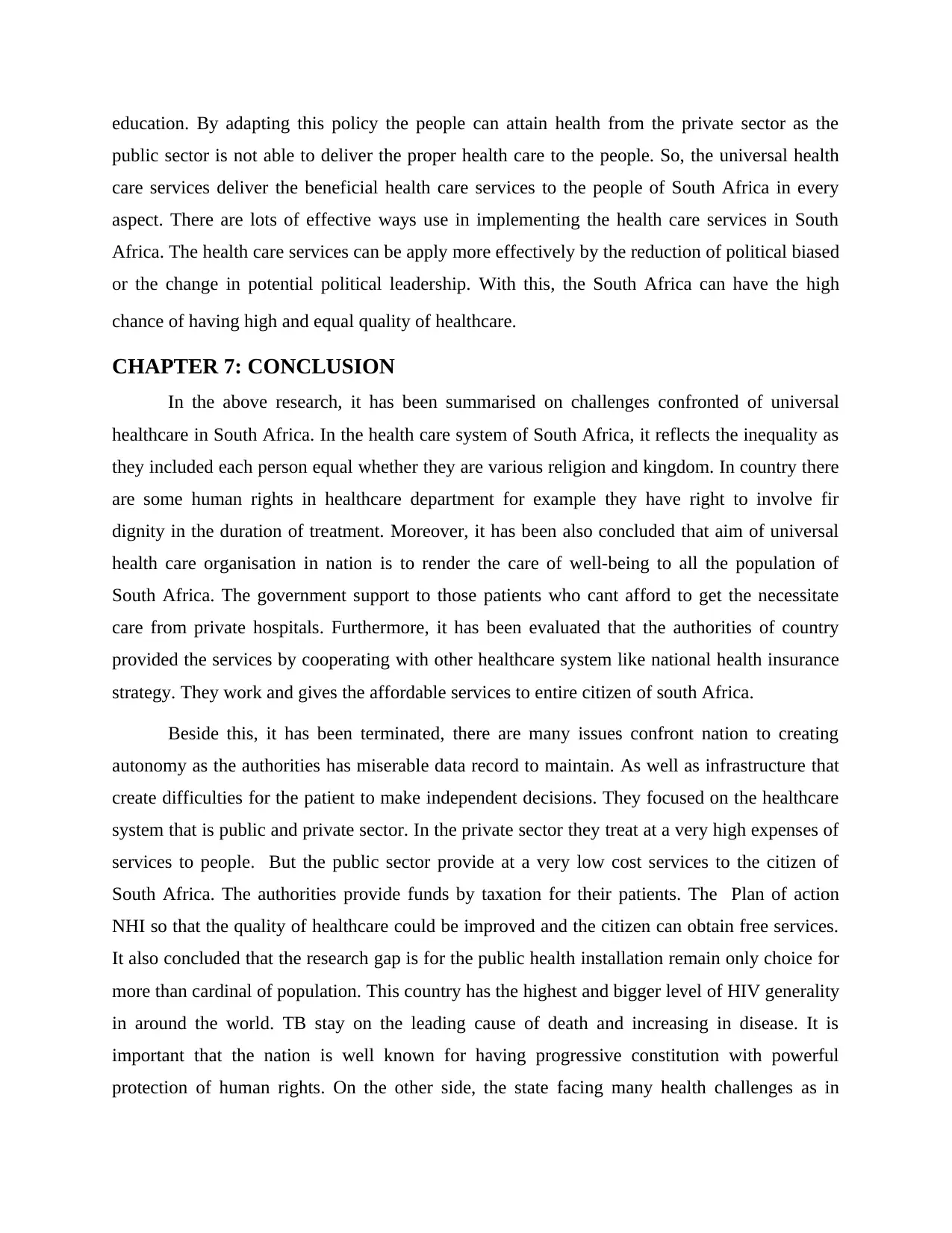
education. By adapting this policy the people can attain health from the private sector as the
public sector is not able to deliver the proper health care to the people. So, the universal health
care services deliver the beneficial health care services to the people of South Africa in every
aspect. There are lots of effective ways use in implementing the health care services in South
Africa. The health care services can be apply more effectively by the reduction of political biased
or the change in potential political leadership. With this, the South Africa can have the high
chance of having high and equal quality of healthcare.
CHAPTER 7: CONCLUSION
In the above research, it has been summarised on challenges confronted of universal
healthcare in South Africa. In the health care system of South Africa, it reflects the inequality as
they included each person equal whether they are various religion and kingdom. In country there
are some human rights in healthcare department for example they have right to involve fir
dignity in the duration of treatment. Moreover, it has been also concluded that aim of universal
health care organisation in nation is to render the care of well-being to all the population of
South Africa. The government support to those patients who cant afford to get the necessitate
care from private hospitals. Furthermore, it has been evaluated that the authorities of country
provided the services by cooperating with other healthcare system like national health insurance
strategy. They work and gives the affordable services to entire citizen of south Africa.
Beside this, it has been terminated, there are many issues confront nation to creating
autonomy as the authorities has miserable data record to maintain. As well as infrastructure that
create difficulties for the patient to make independent decisions. They focused on the healthcare
system that is public and private sector. In the private sector they treat at a very high expenses of
services to people. But the public sector provide at a very low cost services to the citizen of
South Africa. The authorities provide funds by taxation for their patients. The Plan of action
NHI so that the quality of healthcare could be improved and the citizen can obtain free services.
It also concluded that the research gap is for the public health installation remain only choice for
more than cardinal of population. This country has the highest and bigger level of HIV generality
in around the world. TB stay on the leading cause of death and increasing in disease. It is
important that the nation is well known for having progressive constitution with powerful
protection of human rights. On the other side, the state facing many health challenges as in
public sector is not able to deliver the proper health care to the people. So, the universal health
care services deliver the beneficial health care services to the people of South Africa in every
aspect. There are lots of effective ways use in implementing the health care services in South
Africa. The health care services can be apply more effectively by the reduction of political biased
or the change in potential political leadership. With this, the South Africa can have the high
chance of having high and equal quality of healthcare.
CHAPTER 7: CONCLUSION
In the above research, it has been summarised on challenges confronted of universal
healthcare in South Africa. In the health care system of South Africa, it reflects the inequality as
they included each person equal whether they are various religion and kingdom. In country there
are some human rights in healthcare department for example they have right to involve fir
dignity in the duration of treatment. Moreover, it has been also concluded that aim of universal
health care organisation in nation is to render the care of well-being to all the population of
South Africa. The government support to those patients who cant afford to get the necessitate
care from private hospitals. Furthermore, it has been evaluated that the authorities of country
provided the services by cooperating with other healthcare system like national health insurance
strategy. They work and gives the affordable services to entire citizen of south Africa.
Beside this, it has been terminated, there are many issues confront nation to creating
autonomy as the authorities has miserable data record to maintain. As well as infrastructure that
create difficulties for the patient to make independent decisions. They focused on the healthcare
system that is public and private sector. In the private sector they treat at a very high expenses of
services to people. But the public sector provide at a very low cost services to the citizen of
South Africa. The authorities provide funds by taxation for their patients. The Plan of action
NHI so that the quality of healthcare could be improved and the citizen can obtain free services.
It also concluded that the research gap is for the public health installation remain only choice for
more than cardinal of population. This country has the highest and bigger level of HIV generality
in around the world. TB stay on the leading cause of death and increasing in disease. It is
important that the nation is well known for having progressive constitution with powerful
protection of human rights. On the other side, the state facing many health challenges as in
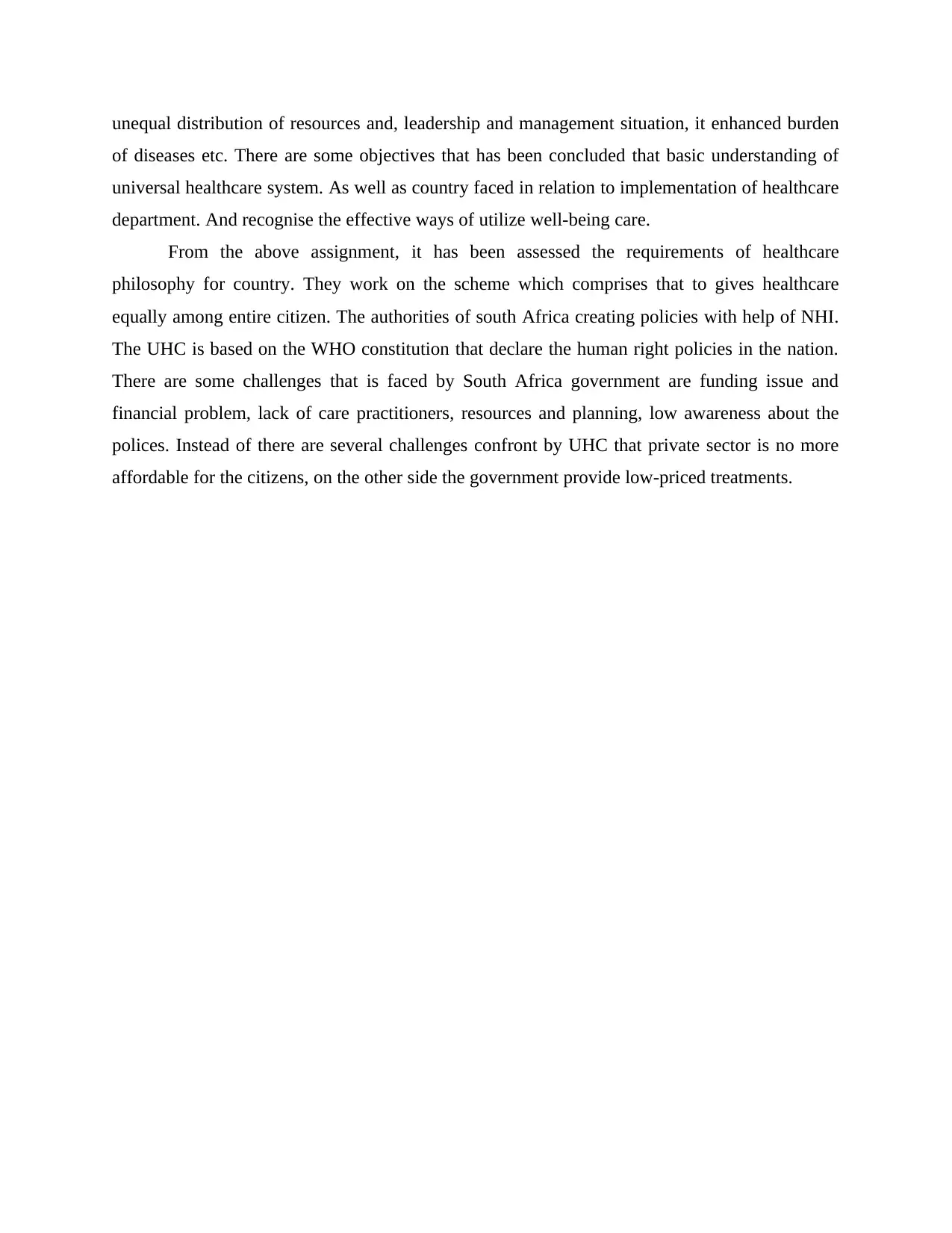
unequal distribution of resources and, leadership and management situation, it enhanced burden
of diseases etc. There are some objectives that has been concluded that basic understanding of
universal healthcare system. As well as country faced in relation to implementation of healthcare
department. And recognise the effective ways of utilize well-being care.
From the above assignment, it has been assessed the requirements of healthcare
philosophy for country. They work on the scheme which comprises that to gives healthcare
equally among entire citizen. The authorities of south Africa creating policies with help of NHI.
The UHC is based on the WHO constitution that declare the human right policies in the nation.
There are some challenges that is faced by South Africa government are funding issue and
financial problem, lack of care practitioners, resources and planning, low awareness about the
polices. Instead of there are several challenges confront by UHC that private sector is no more
affordable for the citizens, on the other side the government provide low-priced treatments.
of diseases etc. There are some objectives that has been concluded that basic understanding of
universal healthcare system. As well as country faced in relation to implementation of healthcare
department. And recognise the effective ways of utilize well-being care.
From the above assignment, it has been assessed the requirements of healthcare
philosophy for country. They work on the scheme which comprises that to gives healthcare
equally among entire citizen. The authorities of south Africa creating policies with help of NHI.
The UHC is based on the WHO constitution that declare the human right policies in the nation.
There are some challenges that is faced by South Africa government are funding issue and
financial problem, lack of care practitioners, resources and planning, low awareness about the
polices. Instead of there are several challenges confront by UHC that private sector is no more
affordable for the citizens, on the other side the government provide low-priced treatments.
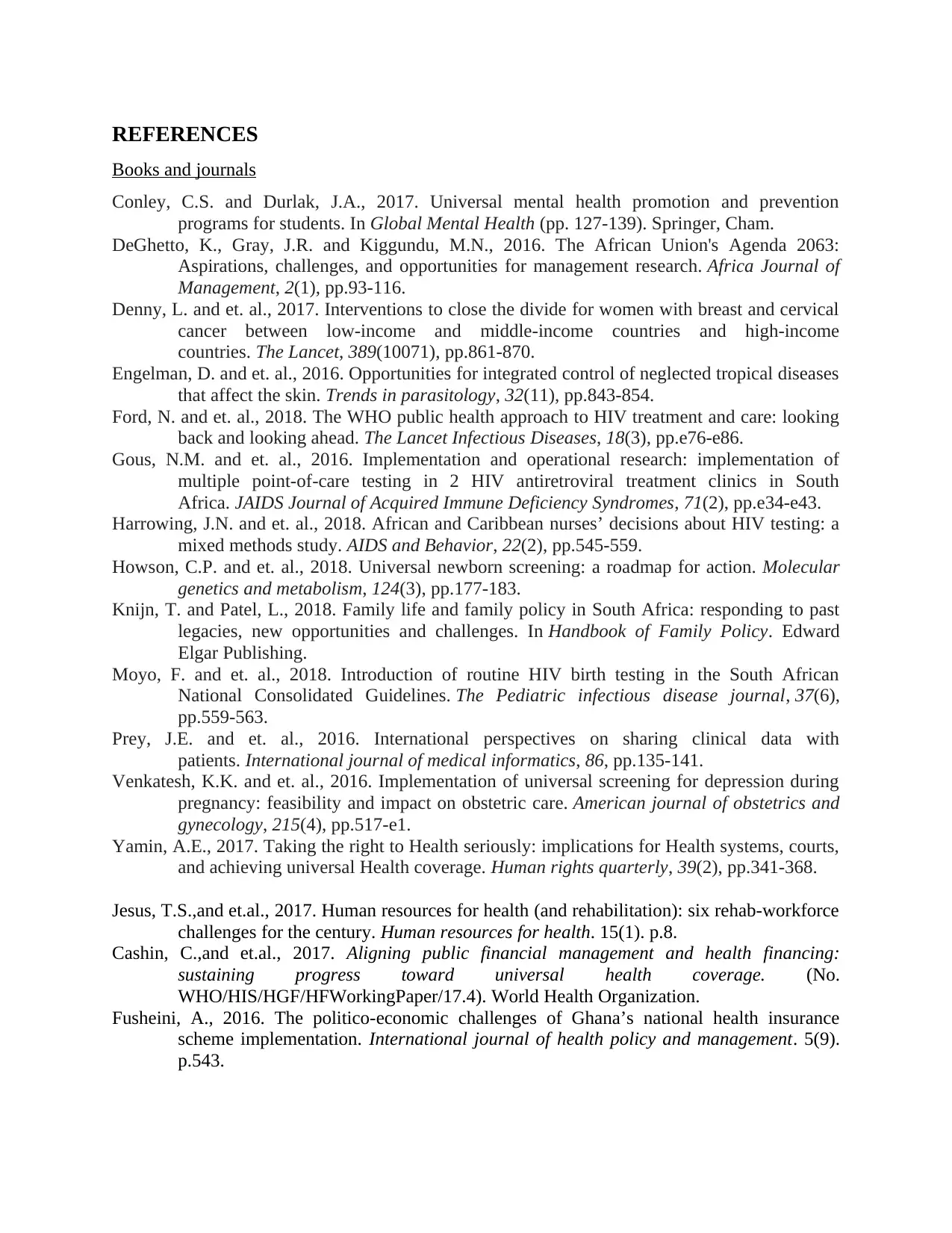
REFERENCES
Books and journals
Conley, C.S. and Durlak, J.A., 2017. Universal mental health promotion and prevention
programs for students. In Global Mental Health (pp. 127-139). Springer, Cham.
DeGhetto, K., Gray, J.R. and Kiggundu, M.N., 2016. The African Union's Agenda 2063:
Aspirations, challenges, and opportunities for management research. Africa Journal of
Management, 2(1), pp.93-116.
Denny, L. and et. al., 2017. Interventions to close the divide for women with breast and cervical
cancer between low-income and middle-income countries and high-income
countries. The Lancet, 389(10071), pp.861-870.
Engelman, D. and et. al., 2016. Opportunities for integrated control of neglected tropical diseases
that affect the skin. Trends in parasitology, 32(11), pp.843-854.
Ford, N. and et. al., 2018. The WHO public health approach to HIV treatment and care: looking
back and looking ahead. The Lancet Infectious Diseases, 18(3), pp.e76-e86.
Gous, N.M. and et. al., 2016. Implementation and operational research: implementation of
multiple point-of-care testing in 2 HIV antiretroviral treatment clinics in South
Africa. JAIDS Journal of Acquired Immune Deficiency Syndromes, 71(2), pp.e34-e43.
Harrowing, J.N. and et. al., 2018. African and Caribbean nurses’ decisions about HIV testing: a
mixed methods study. AIDS and Behavior, 22(2), pp.545-559.
Howson, C.P. and et. al., 2018. Universal newborn screening: a roadmap for action. Molecular
genetics and metabolism, 124(3), pp.177-183.
Knijn, T. and Patel, L., 2018. Family life and family policy in South Africa: responding to past
legacies, new opportunities and challenges. In Handbook of Family Policy. Edward
Elgar Publishing.
Moyo, F. and et. al., 2018. Introduction of routine HIV birth testing in the South African
National Consolidated Guidelines. The Pediatric infectious disease journal, 37(6),
pp.559-563.
Prey, J.E. and et. al., 2016. International perspectives on sharing clinical data with
patients. International journal of medical informatics, 86, pp.135-141.
Venkatesh, K.K. and et. al., 2016. Implementation of universal screening for depression during
pregnancy: feasibility and impact on obstetric care. American journal of obstetrics and
gynecology, 215(4), pp.517-e1.
Yamin, A.E., 2017. Taking the right to Health seriously: implications for Health systems, courts,
and achieving universal Health coverage. Human rights quarterly, 39(2), pp.341-368.
Jesus, T.S.,and et.al., 2017. Human resources for health (and rehabilitation): six rehab-workforce
challenges for the century. Human resources for health. 15(1). p.8.
Cashin, C.,and et.al., 2017. Aligning public financial management and health financing:
sustaining progress toward universal health coverage. (No.
WHO/HIS/HGF/HFWorkingPaper/17.4). World Health Organization.
Fusheini, A., 2016. The politico-economic challenges of Ghana’s national health insurance
scheme implementation. International journal of health policy and management. 5(9).
p.543.
Books and journals
Conley, C.S. and Durlak, J.A., 2017. Universal mental health promotion and prevention
programs for students. In Global Mental Health (pp. 127-139). Springer, Cham.
DeGhetto, K., Gray, J.R. and Kiggundu, M.N., 2016. The African Union's Agenda 2063:
Aspirations, challenges, and opportunities for management research. Africa Journal of
Management, 2(1), pp.93-116.
Denny, L. and et. al., 2017. Interventions to close the divide for women with breast and cervical
cancer between low-income and middle-income countries and high-income
countries. The Lancet, 389(10071), pp.861-870.
Engelman, D. and et. al., 2016. Opportunities for integrated control of neglected tropical diseases
that affect the skin. Trends in parasitology, 32(11), pp.843-854.
Ford, N. and et. al., 2018. The WHO public health approach to HIV treatment and care: looking
back and looking ahead. The Lancet Infectious Diseases, 18(3), pp.e76-e86.
Gous, N.M. and et. al., 2016. Implementation and operational research: implementation of
multiple point-of-care testing in 2 HIV antiretroviral treatment clinics in South
Africa. JAIDS Journal of Acquired Immune Deficiency Syndromes, 71(2), pp.e34-e43.
Harrowing, J.N. and et. al., 2018. African and Caribbean nurses’ decisions about HIV testing: a
mixed methods study. AIDS and Behavior, 22(2), pp.545-559.
Howson, C.P. and et. al., 2018. Universal newborn screening: a roadmap for action. Molecular
genetics and metabolism, 124(3), pp.177-183.
Knijn, T. and Patel, L., 2018. Family life and family policy in South Africa: responding to past
legacies, new opportunities and challenges. In Handbook of Family Policy. Edward
Elgar Publishing.
Moyo, F. and et. al., 2018. Introduction of routine HIV birth testing in the South African
National Consolidated Guidelines. The Pediatric infectious disease journal, 37(6),
pp.559-563.
Prey, J.E. and et. al., 2016. International perspectives on sharing clinical data with
patients. International journal of medical informatics, 86, pp.135-141.
Venkatesh, K.K. and et. al., 2016. Implementation of universal screening for depression during
pregnancy: feasibility and impact on obstetric care. American journal of obstetrics and
gynecology, 215(4), pp.517-e1.
Yamin, A.E., 2017. Taking the right to Health seriously: implications for Health systems, courts,
and achieving universal Health coverage. Human rights quarterly, 39(2), pp.341-368.
Jesus, T.S.,and et.al., 2017. Human resources for health (and rehabilitation): six rehab-workforce
challenges for the century. Human resources for health. 15(1). p.8.
Cashin, C.,and et.al., 2017. Aligning public financial management and health financing:
sustaining progress toward universal health coverage. (No.
WHO/HIS/HGF/HFWorkingPaper/17.4). World Health Organization.
Fusheini, A., 2016. The politico-economic challenges of Ghana’s national health insurance
scheme implementation. International journal of health policy and management. 5(9).
p.543.
Paraphrase This Document
Need a fresh take? Get an instant paraphrase of this document with our AI Paraphraser
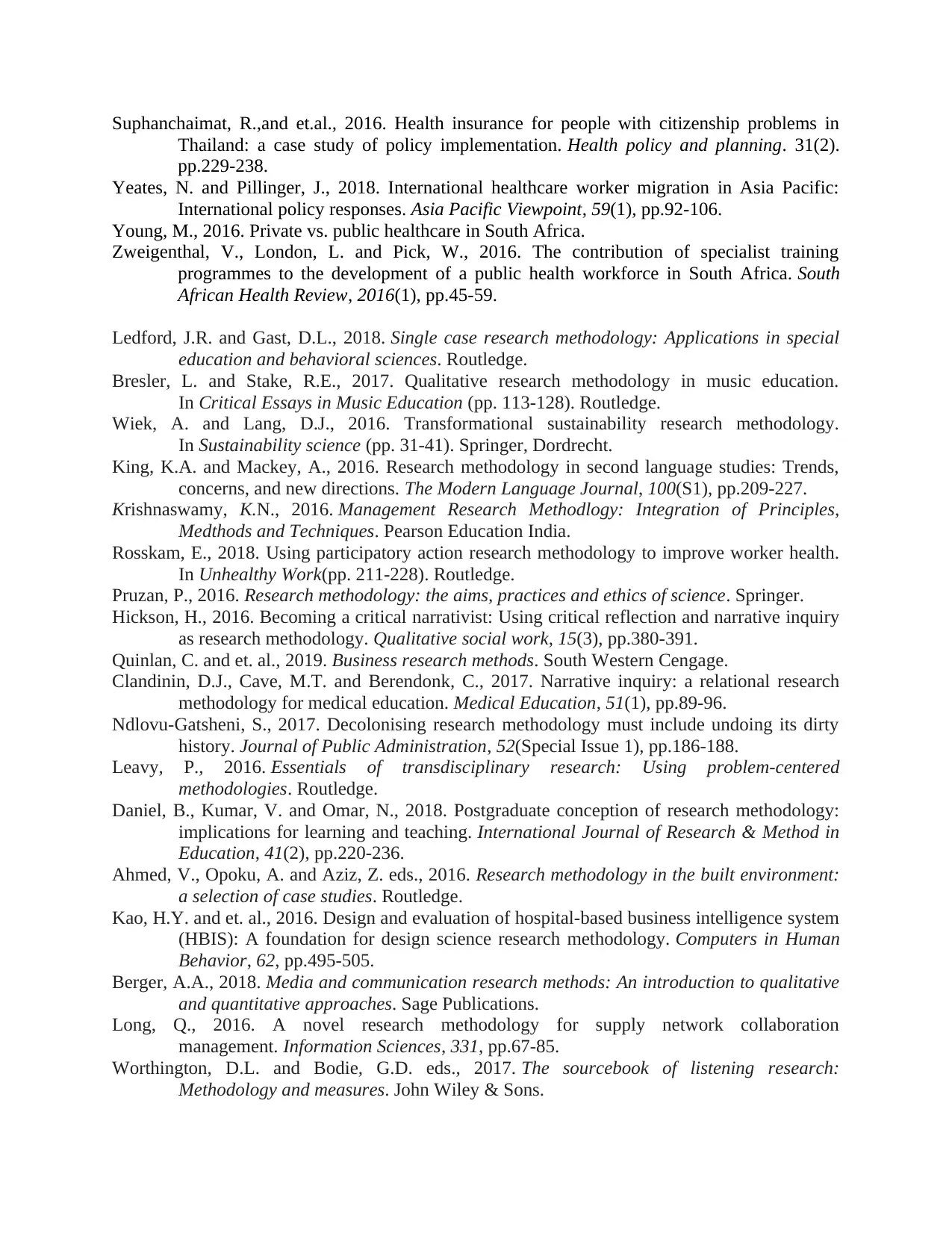
Suphanchaimat, R.,and et.al., 2016. Health insurance for people with citizenship problems in
Thailand: a case study of policy implementation. Health policy and planning. 31(2).
pp.229-238.
Yeates, N. and Pillinger, J., 2018. International healthcare worker migration in Asia Pacific:
International policy responses. Asia Pacific Viewpoint, 59(1), pp.92-106.
Young, M., 2016. Private vs. public healthcare in South Africa.
Zweigenthal, V., London, L. and Pick, W., 2016. The contribution of specialist training
programmes to the development of a public health workforce in South Africa. South
African Health Review, 2016(1), pp.45-59.
Ledford, J.R. and Gast, D.L., 2018. Single case research methodology: Applications in special
education and behavioral sciences. Routledge.
Bresler, L. and Stake, R.E., 2017. Qualitative research methodology in music education.
In Critical Essays in Music Education (pp. 113-128). Routledge.
Wiek, A. and Lang, D.J., 2016. Transformational sustainability research methodology.
In Sustainability science (pp. 31-41). Springer, Dordrecht.
King, K.A. and Mackey, A., 2016. Research methodology in second language studies: Trends,
concerns, and new directions. The Modern Language Journal, 100(S1), pp.209-227.
Krishnaswamy, K.N., 2016. Management Research Methodlogy: Integration of Principles,
Medthods and Techniques. Pearson Education India.
Rosskam, E., 2018. Using participatory action research methodology to improve worker health.
In Unhealthy Work(pp. 211-228). Routledge.
Pruzan, P., 2016. Research methodology: the aims, practices and ethics of science. Springer.
Hickson, H., 2016. Becoming a critical narrativist: Using critical reflection and narrative inquiry
as research methodology. Qualitative social work, 15(3), pp.380-391.
Quinlan, C. and et. al., 2019. Business research methods. South Western Cengage.
Clandinin, D.J., Cave, M.T. and Berendonk, C., 2017. Narrative inquiry: a relational research
methodology for medical education. Medical Education, 51(1), pp.89-96.
Ndlovu-Gatsheni, S., 2017. Decolonising research methodology must include undoing its dirty
history. Journal of Public Administration, 52(Special Issue 1), pp.186-188.
Leavy, P., 2016. Essentials of transdisciplinary research: Using problem-centered
methodologies. Routledge.
Daniel, B., Kumar, V. and Omar, N., 2018. Postgraduate conception of research methodology:
implications for learning and teaching. International Journal of Research & Method in
Education, 41(2), pp.220-236.
Ahmed, V., Opoku, A. and Aziz, Z. eds., 2016. Research methodology in the built environment:
a selection of case studies. Routledge.
Kao, H.Y. and et. al., 2016. Design and evaluation of hospital-based business intelligence system
(HBIS): A foundation for design science research methodology. Computers in Human
Behavior, 62, pp.495-505.
Berger, A.A., 2018. Media and communication research methods: An introduction to qualitative
and quantitative approaches. Sage Publications.
Long, Q., 2016. A novel research methodology for supply network collaboration
management. Information Sciences, 331, pp.67-85.
Worthington, D.L. and Bodie, G.D. eds., 2017. The sourcebook of listening research:
Methodology and measures. John Wiley & Sons.
Thailand: a case study of policy implementation. Health policy and planning. 31(2).
pp.229-238.
Yeates, N. and Pillinger, J., 2018. International healthcare worker migration in Asia Pacific:
International policy responses. Asia Pacific Viewpoint, 59(1), pp.92-106.
Young, M., 2016. Private vs. public healthcare in South Africa.
Zweigenthal, V., London, L. and Pick, W., 2016. The contribution of specialist training
programmes to the development of a public health workforce in South Africa. South
African Health Review, 2016(1), pp.45-59.
Ledford, J.R. and Gast, D.L., 2018. Single case research methodology: Applications in special
education and behavioral sciences. Routledge.
Bresler, L. and Stake, R.E., 2017. Qualitative research methodology in music education.
In Critical Essays in Music Education (pp. 113-128). Routledge.
Wiek, A. and Lang, D.J., 2016. Transformational sustainability research methodology.
In Sustainability science (pp. 31-41). Springer, Dordrecht.
King, K.A. and Mackey, A., 2016. Research methodology in second language studies: Trends,
concerns, and new directions. The Modern Language Journal, 100(S1), pp.209-227.
Krishnaswamy, K.N., 2016. Management Research Methodlogy: Integration of Principles,
Medthods and Techniques. Pearson Education India.
Rosskam, E., 2018. Using participatory action research methodology to improve worker health.
In Unhealthy Work(pp. 211-228). Routledge.
Pruzan, P., 2016. Research methodology: the aims, practices and ethics of science. Springer.
Hickson, H., 2016. Becoming a critical narrativist: Using critical reflection and narrative inquiry
as research methodology. Qualitative social work, 15(3), pp.380-391.
Quinlan, C. and et. al., 2019. Business research methods. South Western Cengage.
Clandinin, D.J., Cave, M.T. and Berendonk, C., 2017. Narrative inquiry: a relational research
methodology for medical education. Medical Education, 51(1), pp.89-96.
Ndlovu-Gatsheni, S., 2017. Decolonising research methodology must include undoing its dirty
history. Journal of Public Administration, 52(Special Issue 1), pp.186-188.
Leavy, P., 2016. Essentials of transdisciplinary research: Using problem-centered
methodologies. Routledge.
Daniel, B., Kumar, V. and Omar, N., 2018. Postgraduate conception of research methodology:
implications for learning and teaching. International Journal of Research & Method in
Education, 41(2), pp.220-236.
Ahmed, V., Opoku, A. and Aziz, Z. eds., 2016. Research methodology in the built environment:
a selection of case studies. Routledge.
Kao, H.Y. and et. al., 2016. Design and evaluation of hospital-based business intelligence system
(HBIS): A foundation for design science research methodology. Computers in Human
Behavior, 62, pp.495-505.
Berger, A.A., 2018. Media and communication research methods: An introduction to qualitative
and quantitative approaches. Sage Publications.
Long, Q., 2016. A novel research methodology for supply network collaboration
management. Information Sciences, 331, pp.67-85.
Worthington, D.L. and Bodie, G.D. eds., 2017. The sourcebook of listening research:
Methodology and measures. John Wiley & Sons.
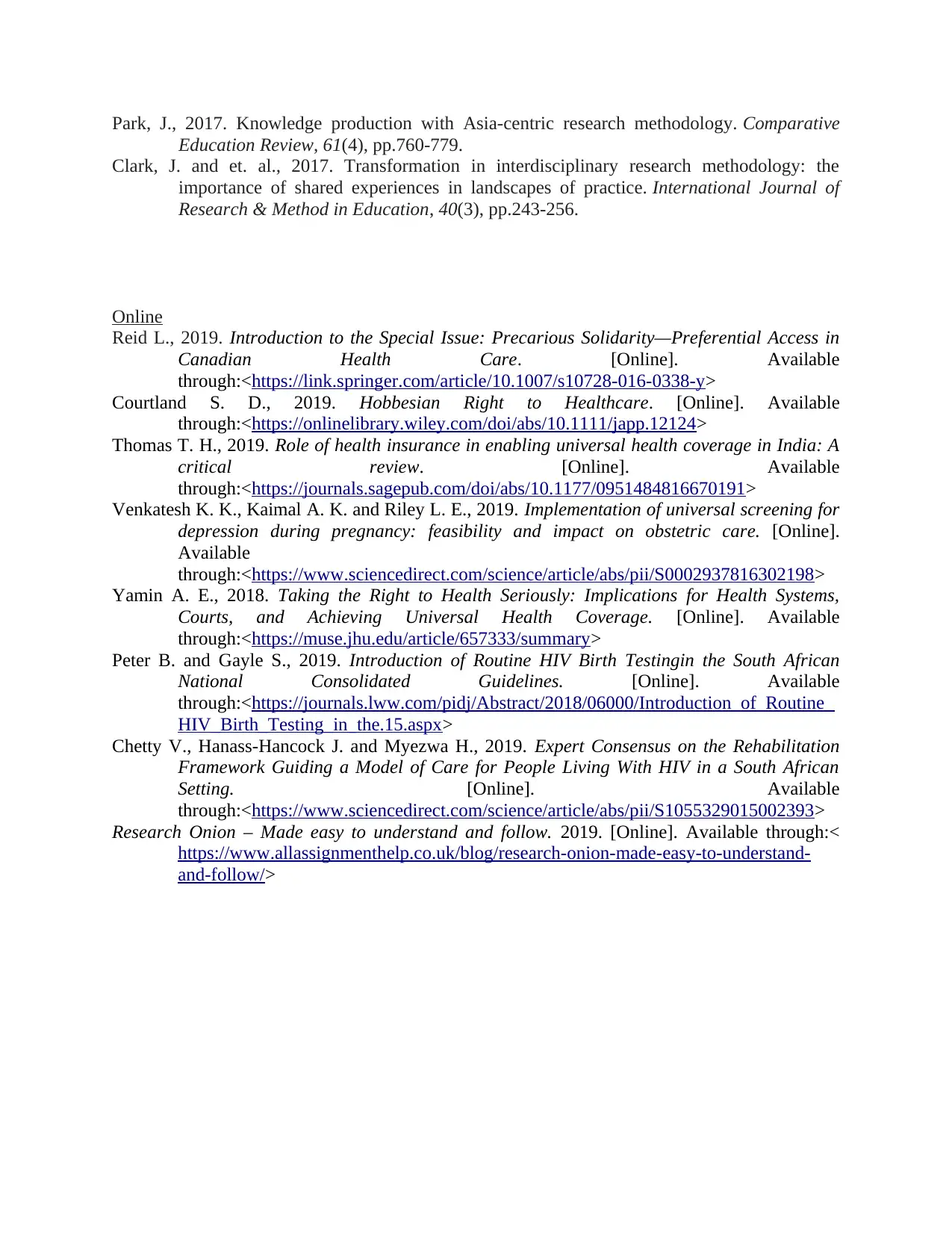
Park, J., 2017. Knowledge production with Asia-centric research methodology. Comparative
Education Review, 61(4), pp.760-779.
Clark, J. and et. al., 2017. Transformation in interdisciplinary research methodology: the
importance of shared experiences in landscapes of practice. International Journal of
Research & Method in Education, 40(3), pp.243-256.
Online
Reid L., 2019. Introduction to the Special Issue: Precarious Solidarity—Preferential Access in
Canadian Health Care. [Online]. Available
through:<https://link.springer.com/article/10.1007/s10728-016-0338-y>
Courtland S. D., 2019. Hobbesian Right to Healthcare. [Online]. Available
through:<https://onlinelibrary.wiley.com/doi/abs/10.1111/japp.12124>
Thomas T. H., 2019. Role of health insurance in enabling universal health coverage in India: A
critical review. [Online]. Available
through:<https://journals.sagepub.com/doi/abs/10.1177/0951484816670191>
Venkatesh K. K., Kaimal A. K. and Riley L. E., 2019. Implementation of universal screening for
depression during pregnancy: feasibility and impact on obstetric care. [Online].
Available
through:<https://www.sciencedirect.com/science/article/abs/pii/S0002937816302198>
Yamin A. E., 2018. Taking the Right to Health Seriously: Implications for Health Systems,
Courts, and Achieving Universal Health Coverage. [Online]. Available
through:<https://muse.jhu.edu/article/657333/summary>
Peter B. and Gayle S., 2019. Introduction of Routine HIV Birth Testingin the South African
National Consolidated Guidelines. [Online]. Available
through:<https://journals.lww.com/pidj/Abstract/2018/06000/Introduction_of_Routine_
HIV_Birth_Testing_in_the.15.aspx>
Chetty V., Hanass-Hancock J. and Myezwa H., 2019. Expert Consensus on the Rehabilitation
Framework Guiding a Model of Care for People Living With HIV in a South African
Setting. [Online]. Available
through:<https://www.sciencedirect.com/science/article/abs/pii/S1055329015002393>
Research Onion – Made easy to understand and follow. 2019. [Online]. Available through:<
https://www.allassignmenthelp.co.uk/blog/research-onion-made-easy-to-understand-
and-follow/>
Education Review, 61(4), pp.760-779.
Clark, J. and et. al., 2017. Transformation in interdisciplinary research methodology: the
importance of shared experiences in landscapes of practice. International Journal of
Research & Method in Education, 40(3), pp.243-256.
Online
Reid L., 2019. Introduction to the Special Issue: Precarious Solidarity—Preferential Access in
Canadian Health Care. [Online]. Available
through:<https://link.springer.com/article/10.1007/s10728-016-0338-y>
Courtland S. D., 2019. Hobbesian Right to Healthcare. [Online]. Available
through:<https://onlinelibrary.wiley.com/doi/abs/10.1111/japp.12124>
Thomas T. H., 2019. Role of health insurance in enabling universal health coverage in India: A
critical review. [Online]. Available
through:<https://journals.sagepub.com/doi/abs/10.1177/0951484816670191>
Venkatesh K. K., Kaimal A. K. and Riley L. E., 2019. Implementation of universal screening for
depression during pregnancy: feasibility and impact on obstetric care. [Online].
Available
through:<https://www.sciencedirect.com/science/article/abs/pii/S0002937816302198>
Yamin A. E., 2018. Taking the Right to Health Seriously: Implications for Health Systems,
Courts, and Achieving Universal Health Coverage. [Online]. Available
through:<https://muse.jhu.edu/article/657333/summary>
Peter B. and Gayle S., 2019. Introduction of Routine HIV Birth Testingin the South African
National Consolidated Guidelines. [Online]. Available
through:<https://journals.lww.com/pidj/Abstract/2018/06000/Introduction_of_Routine_
HIV_Birth_Testing_in_the.15.aspx>
Chetty V., Hanass-Hancock J. and Myezwa H., 2019. Expert Consensus on the Rehabilitation
Framework Guiding a Model of Care for People Living With HIV in a South African
Setting. [Online]. Available
through:<https://www.sciencedirect.com/science/article/abs/pii/S1055329015002393>
Research Onion – Made easy to understand and follow. 2019. [Online]. Available through:<
https://www.allassignmenthelp.co.uk/blog/research-onion-made-easy-to-understand-
and-follow/>
1 out of 57
Related Documents
Your All-in-One AI-Powered Toolkit for Academic Success.
+13062052269
info@desklib.com
Available 24*7 on WhatsApp / Email
![[object Object]](/_next/static/media/star-bottom.7253800d.svg)
Unlock your academic potential
© 2024 | Zucol Services PVT LTD | All rights reserved.





